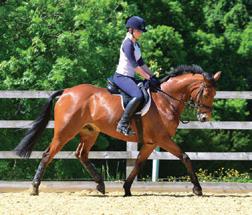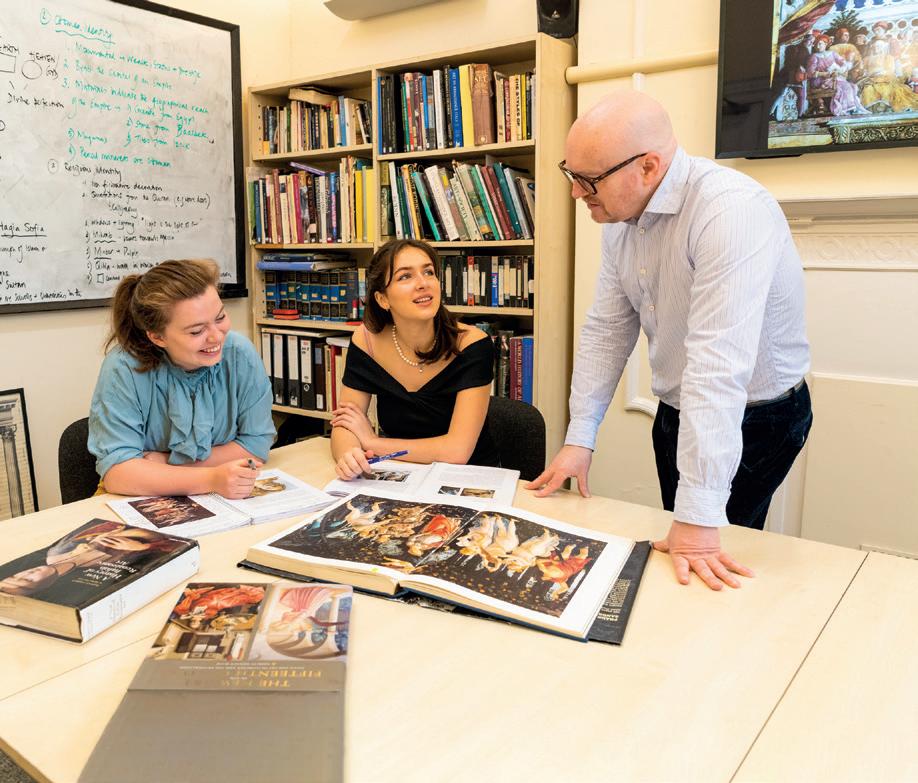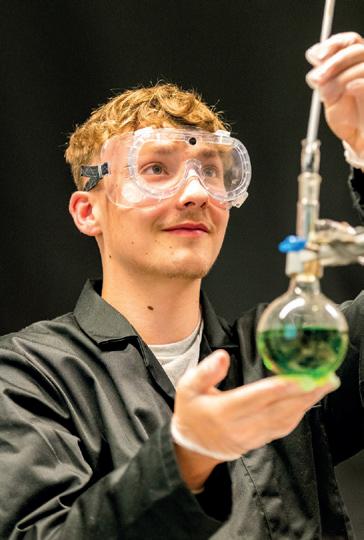EDUCATION














STEPPING UP TO THE BRAND NEW SIXTH FORM
























































STEPPING UP TO THE BRAND NEW SIXTH FORM









































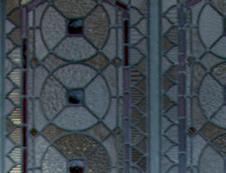





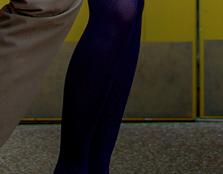

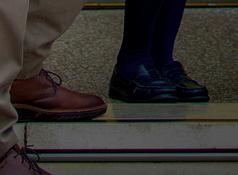


WHY TOP INDEPENDENTS SEE ARTS AND HUMANITIES AS THE PATHWAY TO SUCCESS




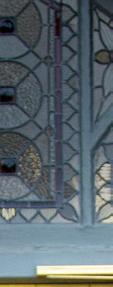

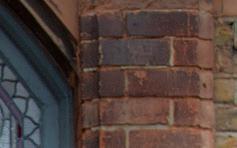

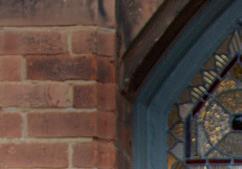
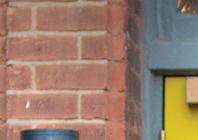



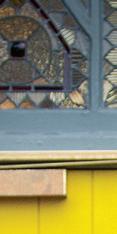


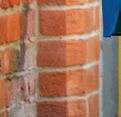



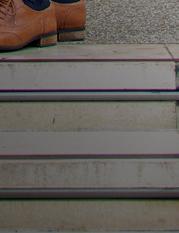
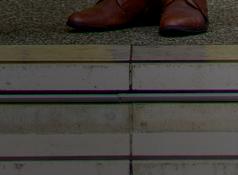




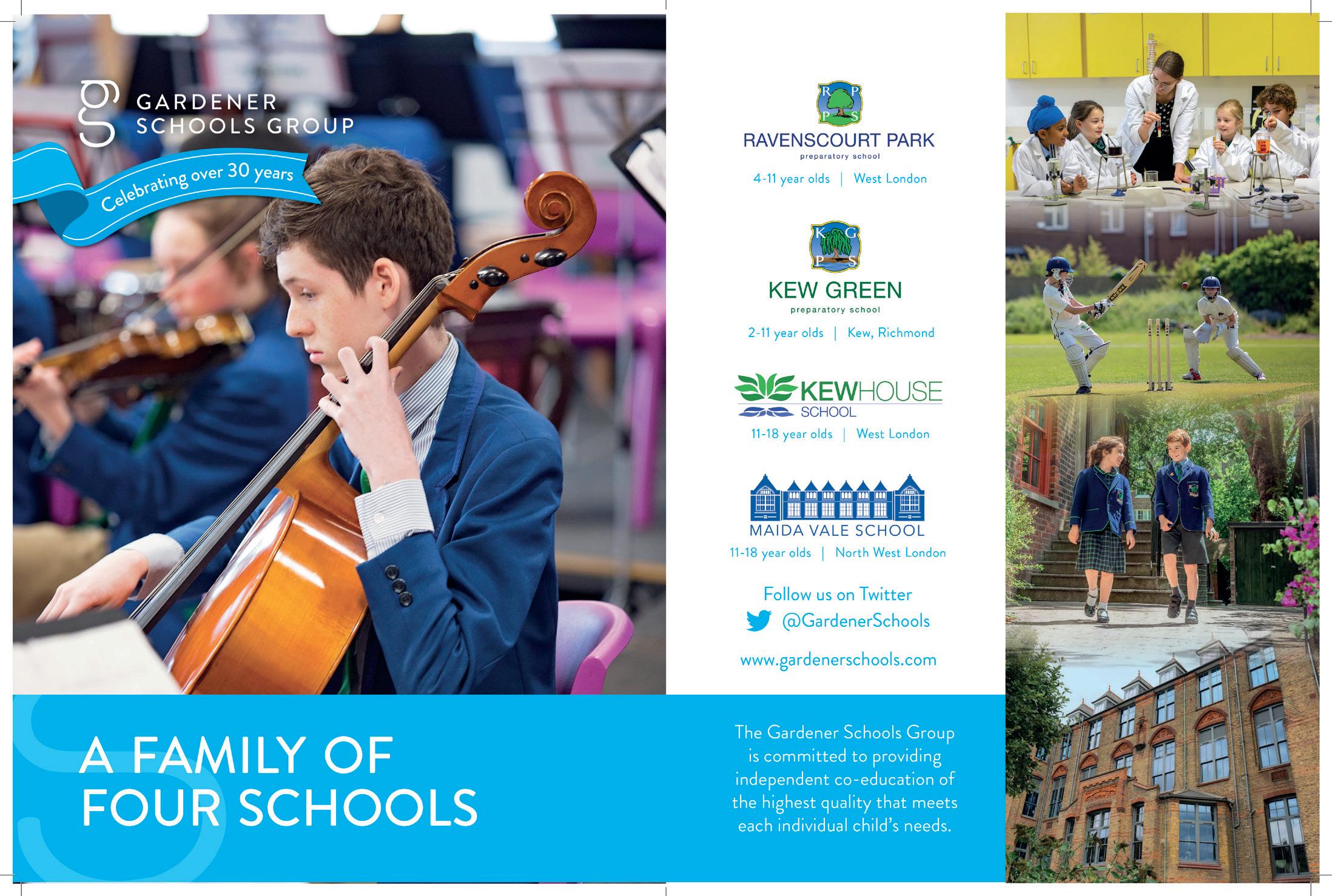


Every Heathfield girl has an irrepressible spirit. Uniquely hers, it drives her passion, voice and character. As well as providing an excellent academic education and top-class pastoral care, Heathfield identifies your daughter’s distinctive strengths and encourages her to live her ambitions, embrace her spirit and talent so that she develops as the best possible version of herself. Live life like a Heathfield girl.

OPEN MORNING
Saturday 13 May
9.45 to 12 noon
To book your place or to attend one of our Meet The Head events, please email admissions@heathfieldschool.net
Day, Weekly and Full Boarding for Girls 11-18
heathfieldschool.net | +44 (0) 1344 898343
Children's author and illustrator
New York Times-bestselling author and illustrator Jerry Cra was born in Harlem and grew up in Washington Heights. His graphic novels have been translated into 13 languages and won multiple awards. In this issue, he talks about his new book, his love of comics and the importance of great expectations. Photo: Hollis King

Curator of poetry events and anthologies

Allie Esiri read Modern and Medieval Languages at Cambridge and has hosted live poetry events at The National Theatre and major literary events. Her award-winning anthologies include A Poem for Every Day of the Year. In this issue, she talks about her latest exploration of nursery rhymes – and why these classics should be treasured. Photo: Joseph Sinclair
Deputy Head, Abingdon House School

Prior to joining Abingdon House, James GilbertFarrell was a freelance theatre director working nationally and internationally. He was also an Associate Learning Practitioner and Associate Director at the Royal Shakespeare Company. In this issue, he talks about the importance of creative opportunities in a SEND setting.

















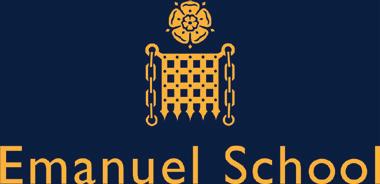










Sarah Gomm leads on pastoral care at Oakham and also teaches chemistry. She is a former Welsh international in lacrosse and has been coaching the sport for over 20 years. In this issue, she talks about Oakham's new connected curriculum and the ways in which pastoral care and learning are being embedded within school life.
Andy Groark leads creative courses ranging from drama to games design. His career includes a spell at The British International School Shanghai, where he taught IB in both Film and Business. He talks about ACS Hillingdon's exciting partnership with Pinewood – delivering industry-focused training in the same spaces where 007 comes to life.
Mark Hoskins studied Economics at Nottingham and SOAS and spent time as a Civil Service economist. Before taking the lead at Reed's in 2014, he was Head of Middle School at Whitgi and then Second Master at the Royal Grammar School, Guildford. In this issue, he discusses the positive impacts of fostering pupil-led dialogue.












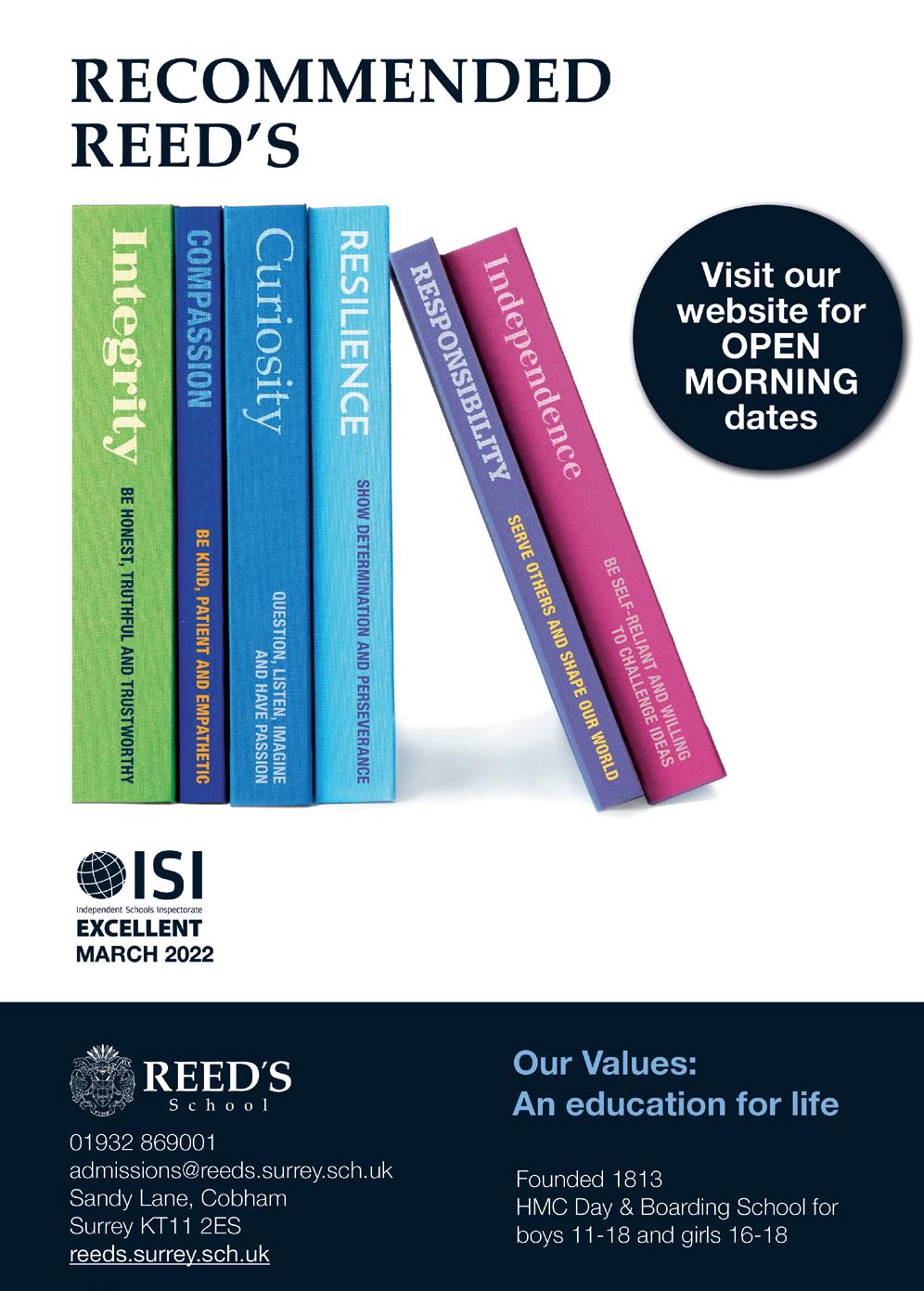
Spring is coming, and brings the welcome return of longer days and outdoor activities. There are also fresh beginnings to look forward to. One such beginning is Maida Vale School’s new Sixth Form, opening this September and the subject of this issue’s cover and focus feature (from page 25). Speaking to the school, it is clear just how exciting this development is. MVS opened in 2020, and it has built from the roots up, so many in this first Sixth Form cohort have grown up with the school. They, and the pupils who join in September, will benefit from an inspired vision when it comes to spaces and also an exciting 21st-century curriculum.
value within school settings by widening young people’s perspective. Seeing another side is also part of the point of our article on debating (page 92). This house firmly believes more young people should have the opportunity to learn these skills, which add considerably to our ability to use reason and listen to the other side of an argument. It was a privilege to talk to so many great writers for this issue. Allie Esiri talks about her new anthology of nursery rhymes (page 60), and we caught up with Jerry Craft in New York to hear about his latest graphic novel (page 128). We also spoke to two authors about the young people who inspired their history adventures (page 138). Hearing about Great Aunt Audrey’s journey to Bletchley Park and John Nicol’s miraculous escape from
It is also inspiring to hear from so many school leaders about the skills developed via the arts. These subjects are – as commentators point out – sometimes seen as lesser, a viewpoint disproved time and again by the simple fact that the future jobs market needs more, not less, creativity. Our Arts for Life feature on page 48 sets the scene and with lively input from a wide range of schools, including two firm but fair rebuttals (pages 31 and 97) of the PM’s plan to make all students study maths to 18. We also look at the value of school partnerships (page 76), increasingly seen as a way to share resources, but also add
the Forth left me pondering the hardships of children of earlier times. Children growing up today (certainly in the developed world) face different challenges, but the world can feel every bit as harsh and demanding. On that note, do read about the partnership between Place2Be and Knightsbridge School (page 32) which has demonstrated how opening up conversations about mental health is an essential step in helping young people to cope, and to know that we’ve got their back.
Libby Norman EDITOR“THIS HOUSE BELIEVES MORE YOUNG PEOPLE SHOULD HAVE THE OPPORTUNITY TO LEARN DEBATING SKILLS WHICH ADD TO THEIR ABILITY TO USE REASON AND LISTEN TO THE OTHER SIDE OF AN ARGUMENT ”
upfront
16 SCHOOL NEWS
What’s going on in the world of education
23 FUNDRAISING HIGH-FLYERS
The MoBros of Bedford School take our breath away
FOCUS
26 SUPER SIXTH
We find out more about Maida Vale School's Sixth Form, opening this September
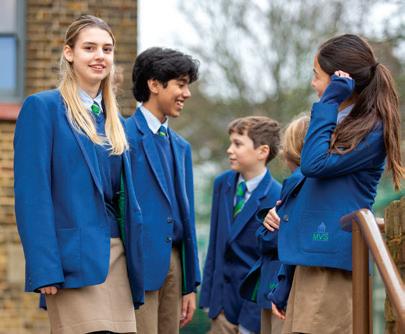
32 HEALTHY MINDS
The collaboration between Knightsbridge School and Place2Be ensures wellbeing is front of mind


42 SCHOOL REFUSAL
Understanding more about EBSA PREP
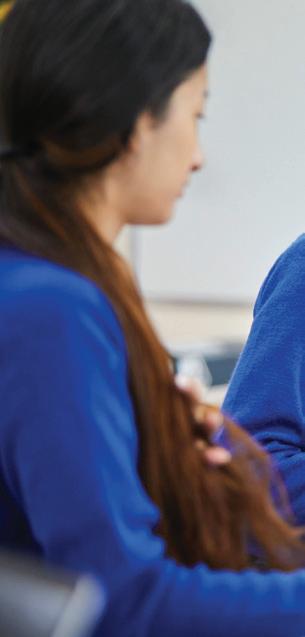
48 ARTS FOR LIFE
How schools are making the arts come alive for their pupils
60 TIME FOR RHYME
Allie Esiri's new anthology of nursery rhymes
73 BOARDING ADVENTURE
How to prepare your child to board...

senior
76 SCHOOL PARTNERSHIPS
Thriving partnerships benefit both schools and whole communities
83 SOCIAL ENTREPRENEURSHIP
New approaches to learning at soon-toopen London Park School Clapham
92 DEBATING STRENGTHS
Debating o ers much more than skills to win an argument
106 LET'S DANCE
Schools that o er dance tell us about the benefits of teaching all the right moves
116 LIGHTS, CAMERA!
ACS Hillingdon is delivering new courses in partnership with Pinewood Studios
Books
128 CRAFT WORK
Graphic author Jerry Craft on his new novel and the importance of great expectations
132 SPRING BOOKS
From behind-the-scenes at the theatre to a global culinary tour, brilliant new season books
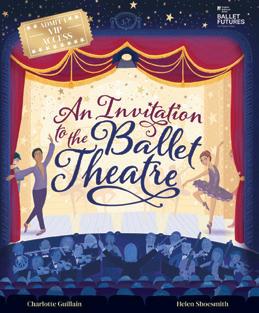
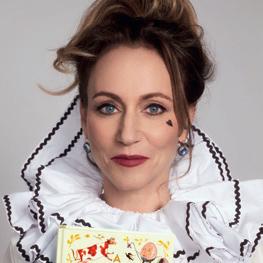
EDITOR


Libby Norman
GROUP ADVERTISING MANAGER




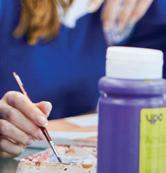
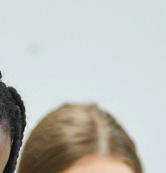
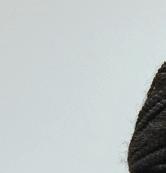
Nicola Owens
ART DIRECTOR

Pawel Kuba

SENIOR DESIGNERS
Mike Roberts
Suzette Scoble
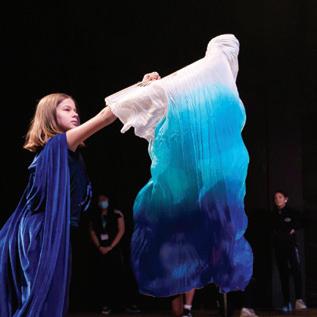

MIDWEIGHT DESIGNER
Carmen Graham
JUNIOR DESIGNER
Joe Munsey
PRODUCTION MANAGER
Danica Brodie
FINANCE DIRECTOR

Jerrie Koleci
CREDIT CONTROL MANAGER
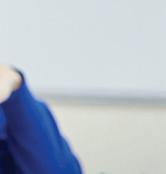

Alexandra Hvid
DIRECTORS
Craig Davies, Leah Day, James Fuschillo

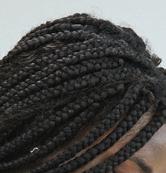
NON-EXECUTIVE DIRECTOR
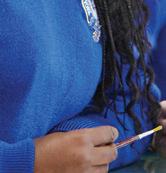
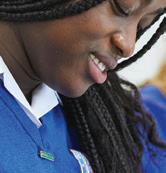
Alexandra Hunter
MANAGING DIRECTOR
Sherif Shaltout
For advertising enquiries please call +44 (0) 20 7704 0588 or email: advertising@zest-media.com
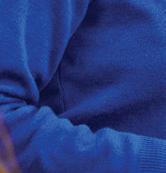
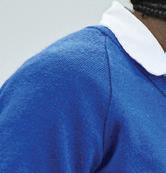
ZEST MEDIA PUBLICATIONS LTD Wenlock Studios, 50-52 Wharf Road, N1 7EU 020 7704 0588 ZEST-MEDIA.COM
Zest Media Publications Ltd . cannot accept responsibility for unsolicited submissions, manuscripts and photographs. While every care is taken, prices and details are subject to change and Zest Media Publications Ltd. take no responsibility for omissions or errors. We reserve the right to publish and edit any letters.All rights reserved. ABSOLUTELY-EDUCATION.CO.UK
FRONT COVER
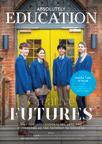



Taunton School music scholar Anthony Knight raising funds for refugees.
See page 16
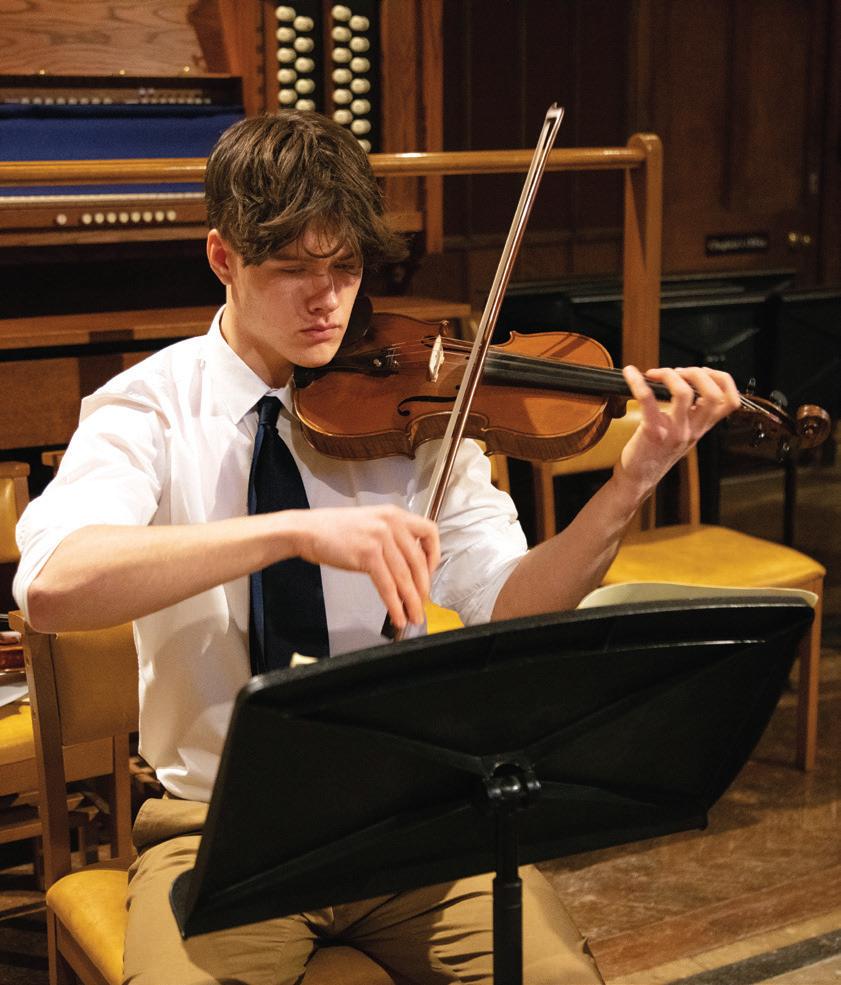
Maida Vale School (MVS) has a new Head Teacher from April, when Magnus Bashaarat takes over at the London co-ed Senior. A former Head of Milton Abbey and Bedales, Bashaarat also held leadership roles at Stowe and Eton. He read English at Edinburgh and was a journalist before moving into teaching. He is a governor of Winchester University and a keen sportsman.

Taunton School music scholar Anthony Knight, 16, received a county award from the High Sheriff of Somerset Jennifer Duke a er raising over £6,000 for the Ukraine Appeal by playing violin recitals at 27 churches. He says: “It has been a wonderful experience travelling around Somerset and meeting lots of interesting people. Everyone has been so generous”.
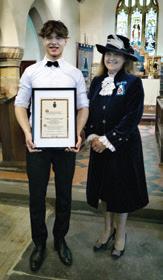
St Dunstan’s College and Rosemead Prep have merged. St Dunstan’s Head Nick Hewlett says: “The merger will be a wonderful opportunity for our two schools, one set in the heart of Catford and the second in the heart of Dulwich, to work closer together, learning from one another and enhancing our students’ educational journeys”.

Heathfi eld School has agreed a collaboration with Parsons Paris. “This exciting collaboration will benefit art and design students in a variety of ways, including the creation of extra-curricular and scholarship opportunities,” says the Ascot school’s Headmistress Sarah Wilson.

James Large becomes Head of Old Buckenham Hall School, Suffolk from September. Large grew up in the county and joins OBH from Norwich School, where he has spent the past 13 years. “I am excited to begin a new chapter at Brettenham Park with my wife, Harriet, and our son, Albie,” he says.

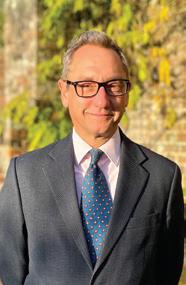


“The first two movies I directed failed... that was the greatest thing that could have happened”M. NIGHT SHYAMALAN
“MVS has a new Head Teacher from April, with the arrival of Magnus Bashaarat”
Bromley High School
GDST celebrated its 140th birthday in January. Junior School pupils dressed up as notable females, and other celebrations so far have included a House A ernoon Tea party and a gala concert at the Royal Academy of Music. All pupils have pledged 140 minutes of their time volunteering in the local community.

Pupils at The Downs Malvern are welcoming a new cohort, thanks to Headteacher Andy Nuttall’s initiative. The prep will soon be home to rare breed pigs and will ‘babysit’ sheep from a neighbouring farm. There are also plans to add geese and guinea fowl to the existing fl ock.
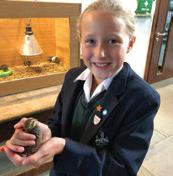
Some 200 pupils took to the stage for Dauntsey’s Lower School Dance Show, around the theme of ‘Legends’. The performances showcased genres including classical, street and contemporary. Highlights included an upbeat dance to ‘Another one bites the dust’, a playful tribute to the Royal Family and a slickly choreographed performance to ‘Beat It’.

Professor Bobbie Fletcher, Academic Director at the College of Esports, was guest of honour at the opening of DLD College London’s Esports suite, The Dragons Den . The suite is for the school’s BTEC Esport – a world fi rst and developed in partnership with the British Esports Association and industry employers.

Merchant Taylors has begun construction of its Julian Hill Cricket Centre, named in memory of an old boy. The facility will be for the school and wider community, including Middlesex CCC and Sunrisers, and will include bowling lanes, a fi elding area, video analysis equipment and event spaces.


“IF YOU WANT TO FIND OUT ABOUT THE LAST DAY OF WWII OR THE ROOTS OF THE INDIAN MUTINY, GET THEE TO A BOOKS CATALOGUE”
THEY SAID
ZADIE SMITH
TORI AMOS
“There’s room for everybody on the planet to be creative and conscious if you are your own person”









Francis Holland School pupils performed two sell-out performances of Guys and Dolls at Riverside Studios, Hammersmith at the end of January. Featuring a cast of over 80 girls from Years 7-13, the fresh take on the classic Broadway musical received standing ovations and applause that lasted long a er the cast had taken their bows.

Tonbridge has been named as among the best schools in the country in a new set of ‘Parent Power’ league tables published by The Sunday Times . The tables are based on A-level and GCSE results from 2022, with Tonbridge ranked eighth in the national rankings for independent senior schools, and third top overall in the south-east.
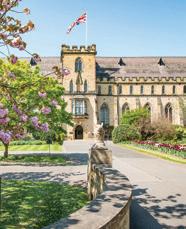
King’s Ely student Lauren Peck has been awarded a scholarship at Guildhall School of Music and Drama. A gi ed saxophonist, she also plays clarinet, fl ute and piano. She joined King’s Ely at Sixth Form and is Joint Head of Concert Band, a member of Saxophone Quartet, Jazz Band, Orchestra and three choirs. She is also involved with Aldeburgh Young Musicians.

Students at St Columba’s College have raised £1,000 for Youth Talk, which provides counselling in the St Albans area. CEO David Barker attended a Mass service at the school to receive the cheque. The funds raised will provide more free and confi dential sessions for people aged 13-25.

Haberdashers’ Elstree Schools
(Habs) has appointed Gus Lock as Executive Principal across its two schools. As Head of Habs Boys since 2018, he has helped lead its ten-year plan focused on opportunities afforded by the schools’ proximity. Head of Habs Girls Rose Hardy takes up a new role at the John Lyon School in September.
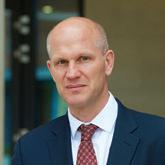
Charterhouse Online is offering A levels in one year. It is aimed at students who might want to make better use of time – for instance for a gap year – and those who decide to change direction or gather extra qualifi cations. The one-year approach is to blend daily live lessons, subject clinics and tutorials. charterhouseonline.co.uk

Eastbourne College has announced it will offer Natural History GCSE from 2025. As a member of the OCR Natural History advisory board, Eastbourne is among the fi rst schools in the country to set out its plans. “We hope this GCSE will enable pupils to gain a richer understanding of wildlife, biodiversity and ecosystems,” says Headmaster Tom Lawson.
“PLEASE DON’T MAKE THE MISTAKE OF THINKING THAT THE ARTS AND SCIENCES ARE AT ODDS WITH ONE ANOTHER”
TIM MINCHIN
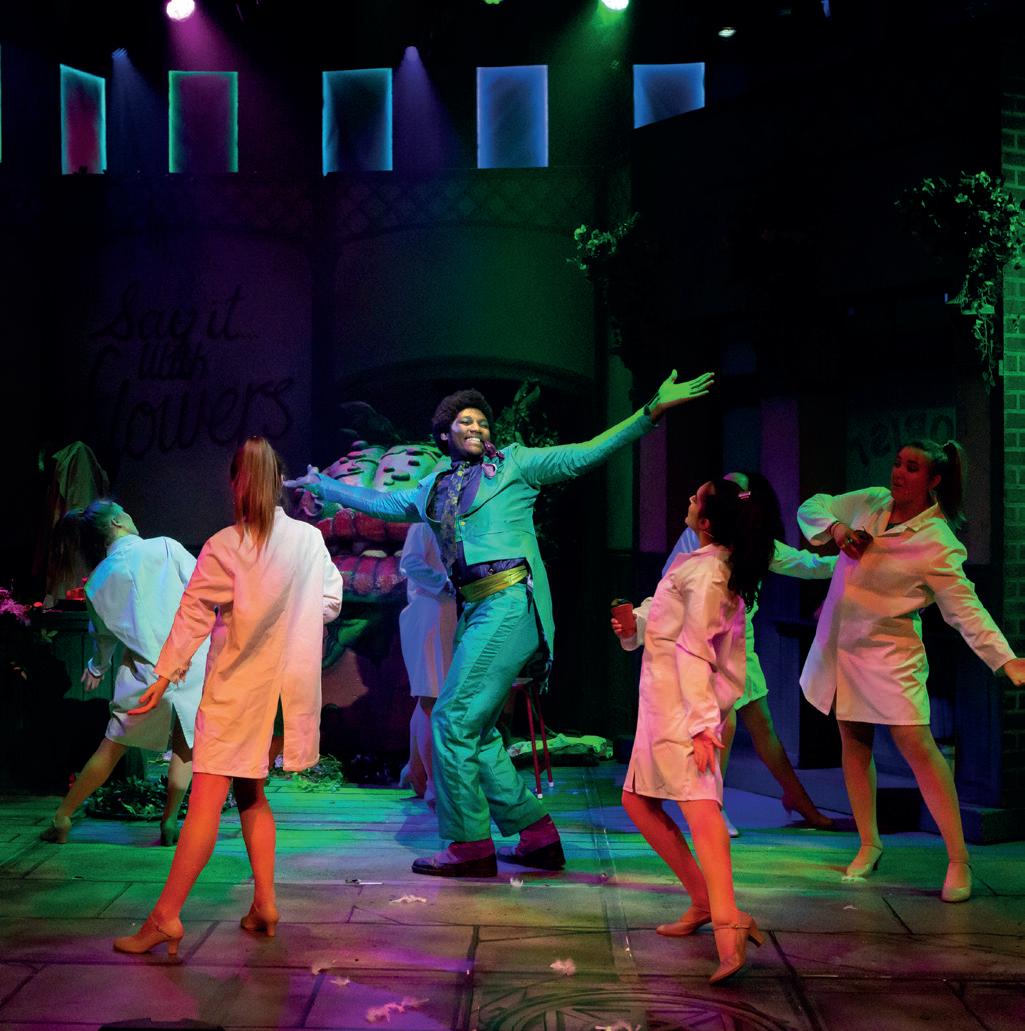




Mark Edwards, Deputy Head (Academic) at Dragon School will join Minerva in August. Chief Executive Hugh Viney says this is a landmark moment for the school, which has pupils from 35 countries. “I’ve been steadfast in our commitment to bringing the best talent to Minerva’s Virtual Academy. Mark’s appointment is another sign of this intent.”
The RHS has launched its school gardening competition, with the charity hoping to uncover the nation’s green-fingered heroes. Schools can nominate the RHS Gardening Team and Gardening Champion of the Year. Judges include George Hassall, RHS Young Ambassador and a former Young School Gardener of the Year. schoolgardening.rhs.org.uk

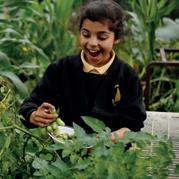
Kew Green Prep held its annual Maths Week recently, with Lower and Upper School Countdown Competitions at the end of the week where pupils answered maths questions in front of peers. Fun activities included 3D pyramid building and hunting for secret treasure in Smart Town. There were also problem-solving trails and times table challenges.
The International School of London held a celebration of the Chinese New Year, marking the beginning of the Year of the Rabbit. Students watched a performance of traditional Chinese singing and dancing, culminating in a Chinese lion dance. They were handed red envelopes symbolising good wishes and happiness.

It was showtime at St Benedict’s School’s with a triumphant three-night run of The Addams Family in early February. The ghoulish Beineke family and even weirder ancestors were brilliantly brought to life by the cast and backstage team. The show was produced by Head of Drama Mark Randall, and with musical direction by Assistant Director of Music Amy John.
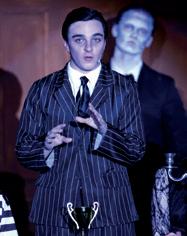
Two Year 11 pupils at The Leys, Cambridge have joined the U16 Top 100 Tennis Players rankings. Marton H and Jack S are placed 30th and 93rd respectively. Each boy has played around 200 games, travelling around the country most weekends. Both pupils aspire to head on to US universities in order to turn pro.
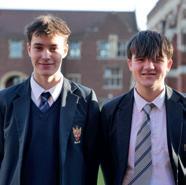
Hanford pupils were avid watchers of the only children’s team in this year’s national Indoor Skydiving Championships, as their Year 7 classmate Rachel was a member of the four-strong Mini Jets. The flying foursome performed brilliantly and have made it through to the International Championships in Slovakia. Rachel’s next goal is to learn to skydive upside down.


“MEN ARE APT TO MISTAKE THE STRENGTH OF THEIR FEELINGS FOR THE STRENGTH OF THEIR ARGUMENT. THE HEATED MIND RESENTS THE CHILL TOUCH AND RELENTLESS SCRUTINY OF LOGIC”
WILLIAM E. GLADSTONE
“The Leys tennis aces have played some 200 games to reach U16 Top 100”
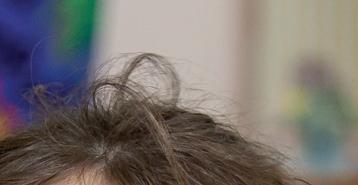
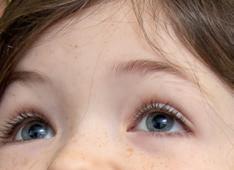


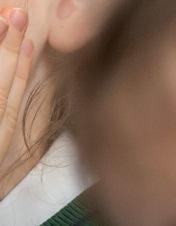
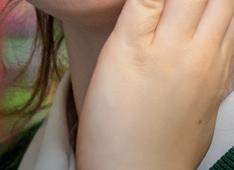
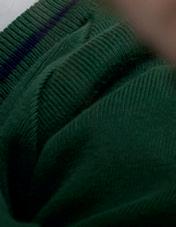
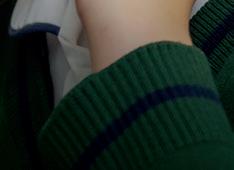







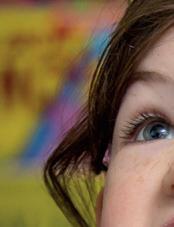





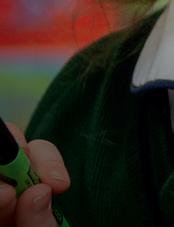







Hats off, or should that be moustaches on, to Bedford School for its astoundingly successful Movember campaign. This gathered so much momentum it exceeded all fundraising targets, coming first (of 603 teams) in the UK school’s challenge and ranking in the top 20 of all teams. As Head Master James Hodgson put it in his final assembly of term: “We were in 15th place, ahead of Visa Europe and behind the Aston Martin Formula 1 team!” Bedford also earned ‘mo bro of the week’ status at Movember HQ in the third week of November.
The student-led campaign focused on raising general awareness of mental wellbeing among young men – including the high global rates of male suicide – as well as key health issues such as testicular cancer. The Upper Sixth, known affectionately as the MoBros, led the campaign with verve, sported their taches with flair and distinction and helped to inspire a wild and wonderful round of fundraisers among pupils, parents and wider community. As a perfect marker for the importance of the campaign, the school’s white line painting suppliers Turf Tank UK painted a giant white tache on the school’s 1st XV pitch.
Standout publicity for the whole campaign was delivered via a three-minute spoof video with serious messages, which the boys produced and starred in. This paid homage to two generations of
Top Gun – the video had received over 2,000 views on YouTube by the time December came around. The MoBros led assemblies for Bedford Prep boys and at Bedford Girls’ School talking about the campaign and reinforcing the message that showing emotions and talking about your feelings is really important. They also delivered lessons to younger boys in the Upper School, covering a wide range of issues around health and wellbeing. Fundraising activities included the school’s cherished annual Tug of War, bake-off style contests, dodge ball tournaments, an open mic night and ‘longest drive’ golf contests, plus a silent auction the boys set up and sourced themselves. The final fundraising tally was £14,272, smashing the original target of £10,000. MoBros of Bedford School, you take our breath away.

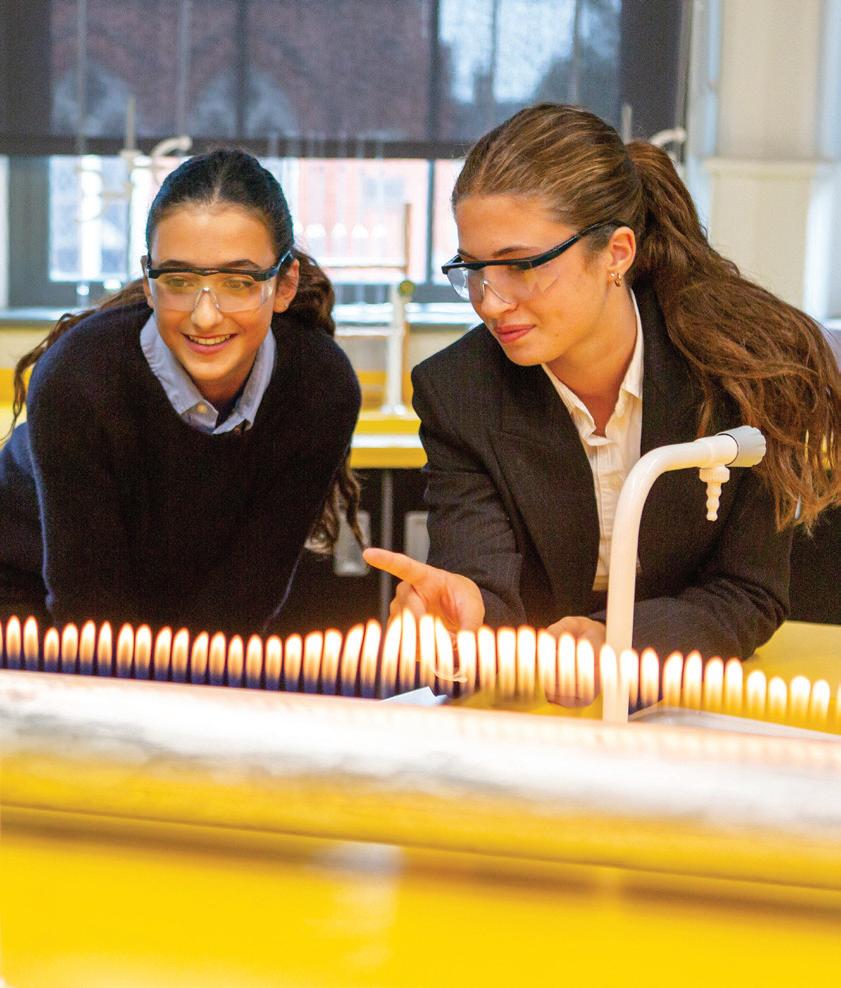
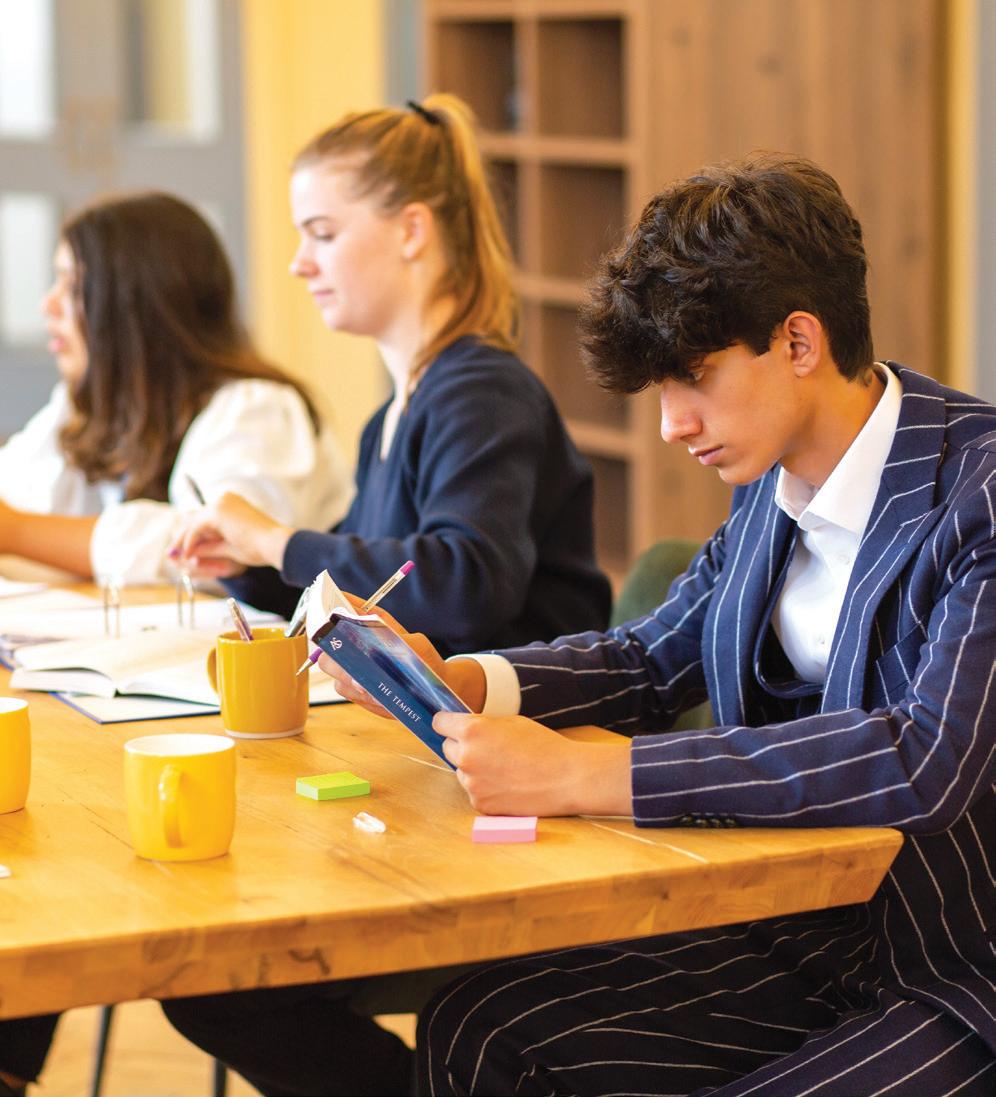
“THE MIX OF TALENTS AND INTERESTS IS EXCITING AND WILL BRING A BRIGHT AND ENERGETIC COHORT”
Maida Vale School is an exciting addition to the London education scene and now, in the second phase of its development, the Sixth Form opens this September. Understandably, this is creating a good deal of excitement among its first student cohort getting ready to step up to MVS Sixth Form life.

This has been a carefully planned moment for Maida Vale School and its parent, the Gardener Schools Group. As MVS Deputy Head Academic and Teacher of English Nicki Ridley explains, it has been about ensuring the school grew from the ground up. This meant a staged refurbishment of the magnificent light-filled Victorian building it inhabits to deliver truly 21stcentury learning spaces. The initial phase was timed for the school opening in 2020. Those first pupils enjoyed imaginatively remodelled learning spaces, including a superb Design Technology workshop and Computer
Science lab, plus lofty Art studios with views across London. Also, an entire floor for the creative arts (top-notch theatre included) and a dedicated food and nutrition kitchen classroom.
Phase two has now happened, adding on 12 new classrooms. Some are smaller – designed specifically for the seminar-style lessons used by 16+ learners – while larger rooms are designed to accommodate the growing cohort lower down the school. As part of phase two works, the school has also added a practice basketball court to the existing MUGA. The outdoor sports facilities here are particularly good for a central London school and a great draw for students and their parents. “The jewel of all this, and perhaps one of the jewels of the building, is our Independent Learning Centre (ILC), so our key Sixth Form Space,” adds Nicki Ridley. “It has got high cathedral ceilings, a wall of windows and then another wall of glass looking into the corridor and other classrooms. It’s light, it’s airy – a breathtaking space.”
After much anticipation, Maida Vale School Sixth Form opens this September. Absolutely Education finds out more
It certainly is a large and inspiring space – cool pendant lighting, tactile textures and calm colours, perfect whether you are studying alone or in a group on the large co-working desks. There’s a library, breakout and cosy study spaces and access to a lovely roof terrace. And what Sixth Former wouldn’t get excited about having their own personal cafe? While the ILC is the Sixth Form space, staff will use it too, which adds to the sense of agency – of being ‘the grown-ups’. Nicki Ridley says that’s part of the point. “We want them to feel a bit more adult, a bit more privileged. They also have privileges such as going out at lunch. They will be held more responsible, so we are giving them the space, as well as the skills, in order to use that well and correctly.”
The fact that staff will be dropping by – to catch up on marking, grab a coffee or have a quick chat about an assignment – is a deliberately light-touch approach to supervision, and also replicates the modern university and office spaces that students will encounter further
down the line. It’s based on a similar ILC design at Gardener Schools Group’s sister Senior Kew House – so the team already know it works brilliantly. Of course, there is also reassurance in this soft staff presence. Pupils know there’s a friendly ear if they are stuck on something or want an informal chat. This will provide invaluable extra support for the new cohort arriving.
“We want pupils joining us in the Sixth Form to also feel instantly that this is a supportive place,” says Nicki Ridley.



Recruitment is happening apace. Ridley has been interviewing prospective pupils from across London (MVS is easy to get to from all points in the capital by public transport), but also places like Oxfordshire, Dorset and as far afield as Switzerland and the Middle East. “The mix of talents and interests is going to be really exciting and will bring a fresh, bright and energetic cohort to add to our existing Sixth Form pupils. All our staff have taught Sixth Form and A levels before and produced fantastic results. They are chomping at the bit to teach Sixth Form again,” says Nicki Ridley. The new MVS Head Teacher Magnus Bashaarat takes over the reins from Founding Head Steven Winter in late April. Bashaarat brings with him a wealth of experience – both in Head and senior leadership roles and in ensuring happy and fulfilling Sixth Form life – and he’s already been busy meeting pupils and parents.
Nicki Ridley says academic rigour and lots of options are key to the approach of the new Sixth Form. “We’re offering a wide range of subjects.” While most pupils will opt for three A levels, other options are on the table – many will complete the EPQ, and BTEC is available for the vocationally and technically minded. The school will consider all possibilities, including T levels. This is, in part, inspired by what students are asking for. There is also the sense (very apparent among
all educators right now) that this incoming Sixth Form – those who were at the formative teenage years of 12 or 13 when Covid hit – bring somewhat di erent perspectives and a strong desire for individualised pathways. “Our current pupils will say they have absolutely adored the attention, the support, the guidance that MVS can a ord them. Every time we host an open day, a tour or an event, we really try and emphasise that because that is what we will continue. And because our classes are small, there’s so much help and guidance.”
There will be extensive careers support – including help with applications to North American universities and navigating apprenticeships and work placements. But it’s not all about study. “With any Sixth Form, balance and variety
are essential if pupils are going to feel like they are enjoying school life as well as excelling at it,” says Nicki Ridley. With that in mind, MVS is including three hours of Games on the Sixth Form timetable every week. This spans traditional team sports, but also locally sourced alternatives such as yoga and boxing, all guided by the activities pupils want to try.
Pupils will be encouraged to keep up broader interests – participating in some form of academic enrichment every week and getting involved in the Year 12 Volunteering Programme that supports MVS’ local community. There’s a diverse Sixth Form Lecture Series in planning, and creative and performing arts enrichment (productions, bands and the rest) promises to be just as vibrant as it is further down the school.
As with any new addition, there’s a feeling of promise – of evolution. These young people will take a lead, both as the first role models for the uniformed part of the school, and in helping to define and establish bold new MVS traditions. “Our new Sixth Form will all have the ability to create, and therefore run, any kind of enrichment club with the help of our teachers and then trickle that interest down the younger areas of the school,” says Nicki Ridley.
“No one at MVS believes that one size fits all. We value diversity, in all regards, and we just know that every young person is so individual and unique,” she adds. “So whether they are studying A levels or T levels, BTEC or EPQ we will create a bespoke curriculum for them. And it’s going to be so exciting!”
maidavaleschool.com



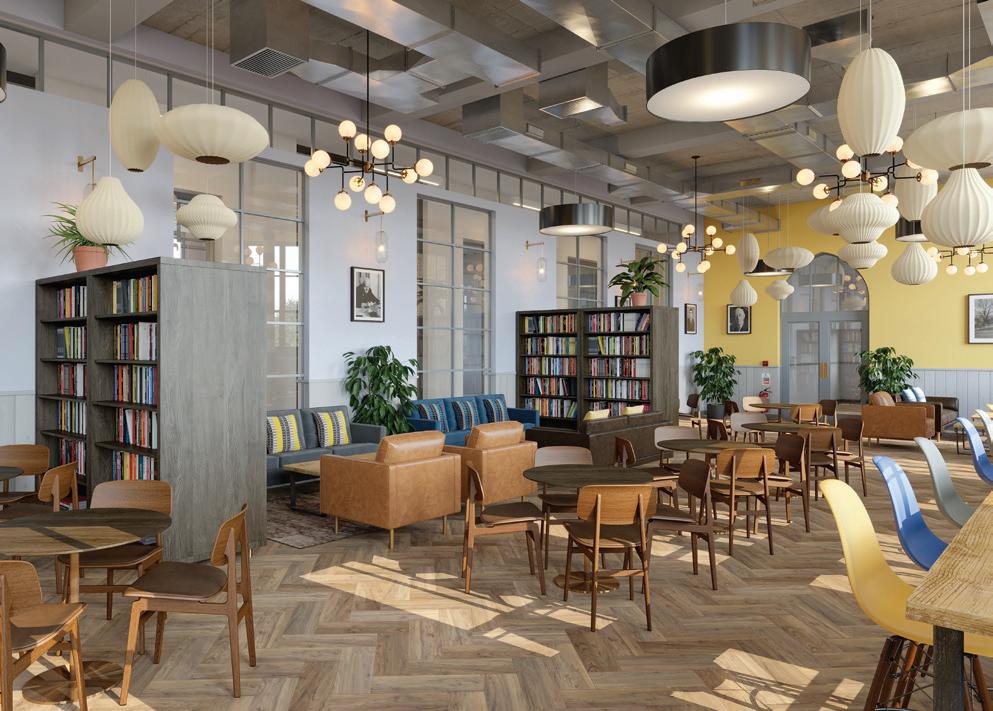
“WE WANT EXTERNAL PUPILS JOINING US IN THE SIXTH FORM TO ALSO FEEL INSTANTLY THAT THIS IS A SUPPORTIVE PLACE”ABOVE The light-fi lled Independent Learning Centre will be a hub of Sixth Form life

At the start of the year, Prime Minister Rishi Sunak announced plans for all pupils in England to study maths to 18 to tackle innumeracy and equip them with analytical skills to thrive in data-driven careers. Yet, unlike a strong maths student, Mr Sunak failed to show his workings.

For those who don’t enjoy the beauty of maths (I admit there are some!), and who won’t progress beyond a GCSE to A level, it is unclear what Mr Sunak’s plans are. I can only imagine it would be some kind of functional maths or practical maths course.
If the job of educators is to excite, inspire and convey knowledge, I fear this could subject some students to a further
two years of misery. If a student isn’t venturing into maths- or science-based degrees, is this really constructive?
The 60% of Sixth Form girls at St Catherine’s who have chosen to study Maths and Further Maths at A level don’t necessarily love every lesson and they do find concepts challenging, but they also delight in the challenge of unsolved problems and their results speak for themselves.

In the workplace, a sound understanding of percentages and fractions may be all someone needs to function effectively. This is covered at GCSE in detail, so I can’t see how this can be dragged out over a further two years, tethering students to their calculators to 18. Learning to run your own finances and gaining an understanding of mortgages and interest rates would certainly be useful life lessons, but in most schools these areas are sensibly covered in PSHE (personal, social, health and economic) lessons.
Compounding the challenge for Mr Sunak’s ambition is the lack of maths teachers nationwide. It hasn’t been suggested how we are going to recruit more to fulfil the extra maths teaching that would be needed. Nor how we address the fact that, at the moment, half of secondary school pupils are taught maths by non-specialist teachers, as noted in a TES report published last November.
I’ll end with a nod to my teaching colleagues. Any extra maths sessions that students are made to do post 16 will inevitably be at the detriment of other subjects, such as art, music and drama. With the Arts Council estimating that the creative industries bring £8.5bn to the UK economy annually, it is not just the worlds of science and finance that make economic sense. I’m happy to help with the calculations Sunak.
ALASDAIR WRIGHT Head of Maths St Catherine’s School, Bramley
“Compounding the challenge for Mr Sunak’s ambition is the lack of maths teachers nationwide, as noted in a TES report last November”
Knightsbridge School’s pioneering Place2Be partnership prioritises good mental health across the whole community. Absolutely Education finds out more
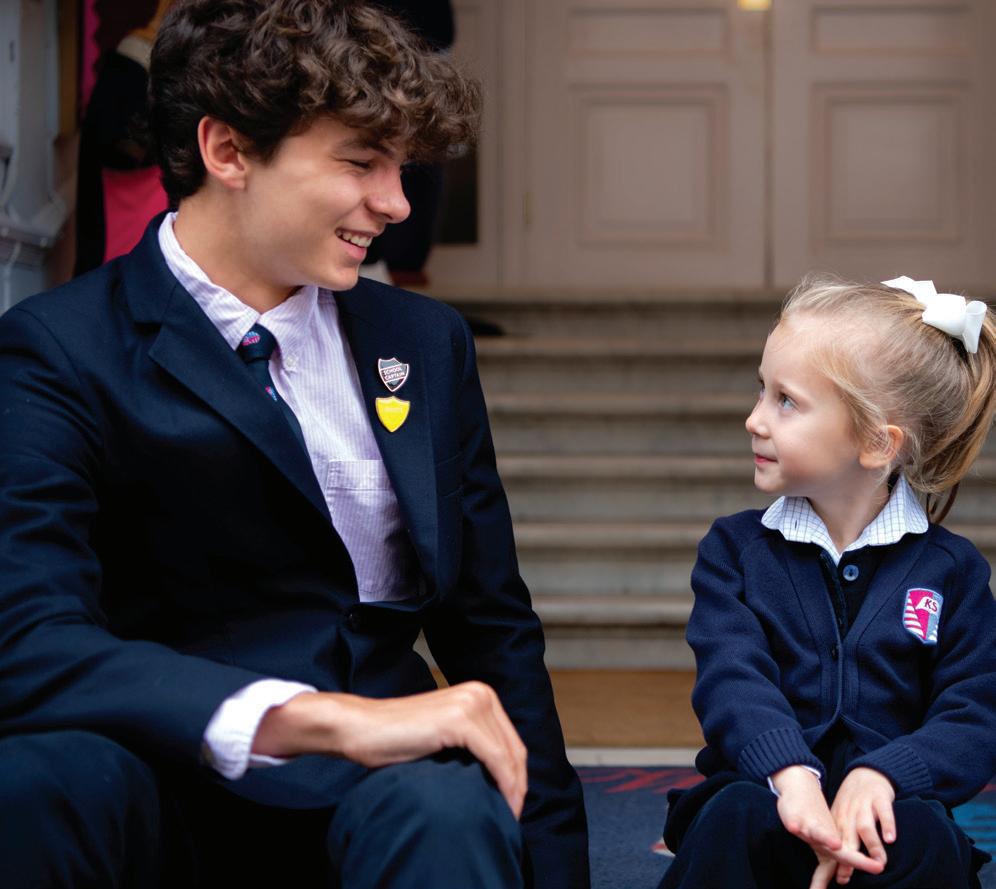
Child mental health has risen up the agenda over the past decade. This is thanks, in part, to landmark work by the charity Place2Be.
High-profile support – notably from HRH The Princess of Wales – has helped to spread the message about the value of early support to build children’s wellbeing and their ability to talk through emotions and problems. It’s so obviously a good idea that it’s easy to forget we weren’t always so attuned to the challenges young people face.
Knightsbridge School stands out for spotting the need early. KS Principal and Founder Magoo Giles brought Place2Be into the school back in 2014 as a partnership. It was the first independent day school to take this step. The partnership is supported enthusiastically by pupils, parents and staff
– all benefit from Place2Be’s independent counselling support and advice service.
Paula Losch is the School Project Manager for Place2Be and is based at KS for three days a week. While she is employed by the charity, she considers herself part of the school team and is very much involved with day-to-day life. “Anyone can talk to me – we offer a service to the parents, the students and the staff,” she says, adding: “As Mr Magoo always says, ‘It’s a compassion service’”. Compassion is an important word here –offering a service that anyone can use freely helps to embed a mindset of self-care, also, as one staff member put it: ‘a level playing field’. Visibility is key to this school culture. Take, for instance, the location of the Place2Be office, a few steps from the school’s dining hall – a place children pass every day. This reinforces the idea that it’s as normal to tend to your mind as to refuel your body. There’s an open-door approach – so any child or young person can knock on the
door for a ‘Place2Talk’ session and get counselling for whatever is bothering them. It might be worries about work, friends, or something that makes them sad – perhaps the absence of a family member or loss of a pet. There are other ways to approach Place2Be. Children can leave a slip in a box, ask their teacher to book them in or their parents can email at any time. “When a child comes to us, what we do, depends on the child,” says Paula Losch. “Children communicate in so many ways and are eager to express themselves. We offer them a safe space to share their feelings and thoughts verbally, but also through art and play.” Alongside one-to-one chats, there are in-class circle times where children
are encouraged to discuss issues together. This feeds back into the knowledge KS and Place2Be have of wider potential problems –think of it as an early warning system for the issues that might be coming down the track.
Parents can and do access support, too. This is a vital part of the service, and what KS calls the Parent Partnership. Family therapy is offered, along with one-to-one support if parents request it. “It’s not an easy job parenting,” says Paula Losch. “It’s difficult for everyone. We’re not there to humiliate or shame any parent. We offer this to parents to empower them and say, ‘you know, it’s really not easy, what can we do to support you in this?’.”
Knightsbridge School has a very international cohort, wonderful for the life and spirit of the community, but it can bring its own difficulties. Families may be a long way from home and their own support networks, and they may be adjusting to life in a busy city environment. And, like every

“The Place2Be office is near the school’s dining hall –reinforcing the idea that it’s as normal to tend to your mind as to refuel your body”ABOVE Knightsbridge School Wellbeing Ambassador with younger KS pupils
Co-educational excellence in the heart of Berkshire.
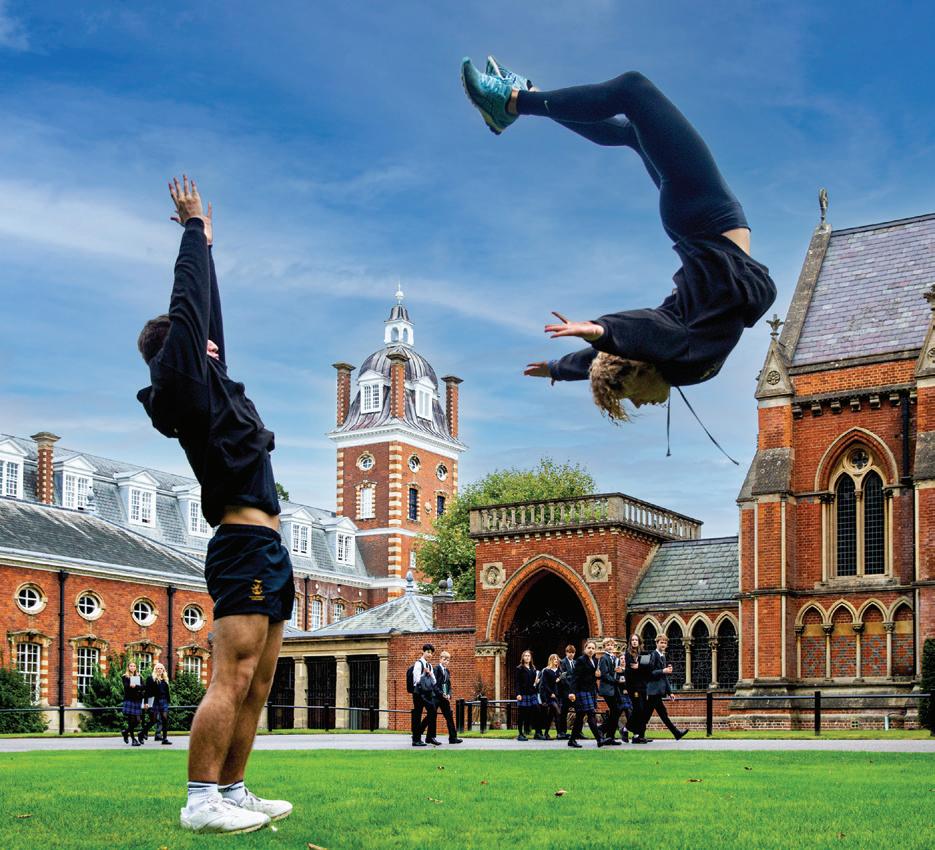
We believe that every child has immense potential that, in the right environment, can be uncovered, nurtured and realised.
wellingtoncollege.org.uk

school, KS feels the impact of geopolitics – for instance, there are families from Ukraine and Russia here. While there can be worries specific to families, Paula Losch says parents around the world share a lot of common ground when it comes to concerns about their children. “Parents all deal with the same sorts of issues – children struggling with friendships, with anxiety related to friendships, to social media.”
With this in mind, Place2Be hosts a forum for parents every term on a key issue. This is ‘ear to the ground’ stu gathered via in-class circle times or the things that individual students are mentioning. “Without divulging who brought the issues, we talk about the things we are hearing, the things our pupils are struggling with.” Parents can also flag
up issues they are worried about – there’s a vibrant parent group called Knowledge Society, which co-ordinates many elements of the wider Parent Partnership.

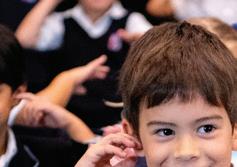
All KS parents also have access to Place2Be’s Parenting Smart website and online courses – a series of online modules that talk about situations every parent deals with – such as setting boundaries, giving praise and reward and managing temper tantrums. It’s designed for parents of 4 to 11-year-olds and free to access.
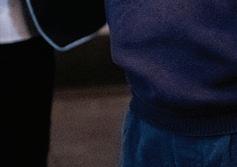

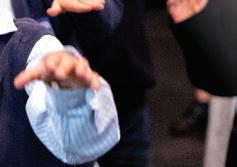
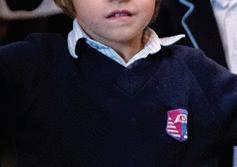
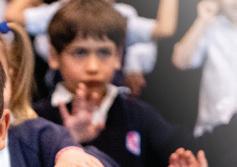
There are, as we are all coming to realise, specific issues since the pandemic. Paula Losch shares that teenagers have been particularly badly a ected. “We see more and more teenagers having issues with depression and thinking they’re not capable,
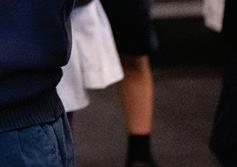
and that it is all too much.” Pre and post pandemic, boys are harder to reach – more reluctant to get help when they are down – something the whole team at Place2Be are working hard to address. “Whereas girls come, they talk, and they are used to having support – and then they can work through their emotions,” says Paula Losch.
“That’s something therapy gives you – you become much more resourceful.”
In other words, it builds tools and inner resources to help with current problems and problems you might face down the line. “Counselling is not about giving advice, but asking the right questions so that the child can find the best solution,” she adds.
And that’s the thing about Knightsbridge School’s work with Place2Be. It is embedding the kind of child-centred support that builds a toolkit, giving young people strength and resourcefulness for today’s and tomorrow’s challenges. It’s a mark of how e ective – and wellloved – the partnership has become that parents have made Place2Be a cornerstone charity, alongside Royal Chelsea Hospital and The Knightsbridge School Education Foundation (which provides generous full bursaries). This means Place2Be fundraising takes place all year round and KS has also helped to pass it forward by supporting its services in local partner state schools.


Speaking about the partnership, Head, Shona Colaço has said: “Place2Be has opened our young people’s eyes to the importance of good mental health and helped to nurture empathy and selfawareness in our school community. We owe it to our children to care for their mental and physical wellbeing as the springboard to success in school”.
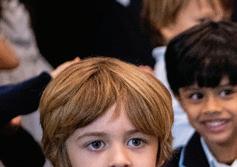
“Parents all deal with the same sorts of issues – children struggling with friendships, with anxiety related to friendships, to social media”
“The quality of the pupils’ academic and other achievements is excellent... The school successfully meets its ambition to empower pupils to become independent thinkers and fearless learners.”
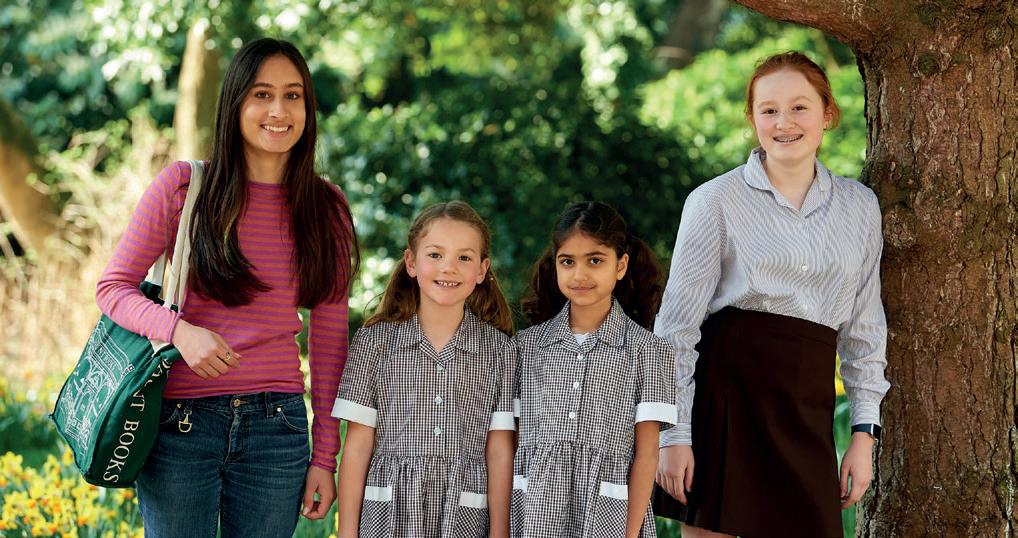
ISI Inspection Report 2022

It won’t take you long to find something in the media to outline the issue that humanities are taking a dip. The New York Times, Wall Street Journal, Guardian and BBC have all reported in recent years about declining uptake and prestige. However, it is my belief that they play a hugely significant role, and their power must not be undervalued.
With climate, energy and cost of living crises; war and conflict in Europe and beyond, the study of the humanities is ultimately more important now than ever before. In recognition of this, we have created a Humanities Faculty at Hurst College. This includes the departments of geography, history, religious studies, politics, business, economics, sociology and classical civilisation from Year 6 in the Junior Prep School through to Upper Sixth in the Senior School. A fantastically diverse set of subjects and key stages all now work together collaboratively to share our love for the humanities, instil passion and enthusiasm in our pupils and make them acutely aware of the world around them. Looking ‘beyond their bubble’ is a phrase we have coined, and one which we believe is important for our pupils.
From Key Stage 2, pupils learn about a range of cultures, traditions, norms and values. They are taught valuable social skills, how to show empathy for others, and at a young age we foster justice and equality from

humanities teaching. Throughout Key Stage 3 and beyond, the humanities teach pupils to deal critically and logically with subjective and imperfect information. Pupils learn to weigh evidence sceptically and consider more than one side of every question.
The intention for the Humanities Faculty is to structure, linearise and design an effective curriculum which interlinks topics between subjects and key stages. The faculty allows for scaffolding of the key skills, especially higher order logic and thinking, as well as improvement of writing styles. There is focus on the harder components of the humanities world – for example analysis, discursive writing and evaluation skills. We run a series of lectures and guest speaker events, also holding an annual history dinner with a range of speakers. Humanities develops important life skills which pupils can use beyond their school
years. For example, it encourages pupils to debate, challenge ideas, reflect upon their own personal experiences and empathise with the experiences of others who are very different, whilst applying concepts to reallife examples in contemporary society.
As a faculty, we promote a range of super-curricular options and firmly believe that these are vital for preparing our pupils for life and society. The ultimate goal is to facilitate a love and excitement for humanities subjects and to show their relevance. We have managed to move away from the mythical mantra ‘smart kids do science and maths’ and the Humanities Faculty is buzzing. Numbers of pupils opting for these subjects are incredibly strong and we have a robust set of departments creating well-rounded, thoughtful, inquisitive and passionate individuals who will go on to be successful global citizens in the world beyond school.
Head of Humanities, Hurst College
Beccy Bownas of Hurst College talks about the importance of prioritising the humanities subjects in our schools
“The humanities develop life skills –pupils debate, challenge ideas and empathise with others”
BECCY BOWNAS
Our role, as parents and teachers, is to give our young people the skills and the confidence to be the best version of themselves. Nobody achieves success (however you define it) without making mistakes, but the pressure on our young people to be perfect – from social media, wider societal influences and the spectre of GCSEs and A levels – often clouds their perspective. Education should not simply be about what we learn, but how we learn.


Creating an environment where individuals are able to make their own mistakes, and learn from them, should be a priority for us all – an environment where pupils are not always right, but mistakes will not scar for life. To expect a child always to achieve A* grades, be in the first team and have lead protagonist roles in every play is unrealistic and is not going to create the resilient individuals we need – those who can respond to the challenges of the age. This is where creative and performing arts and team sports have a fundamental role to play. Our foundress at Mayfield was
ahead of her time 150 years ago in placing creativity at the heart of our curriculum and encouraging an appreciation of interdisciplinary approaches. To be a good scientist you need to be creative; to be a fine artist you need discipline, structure and perspective. Much maligned and often seen as the poor relations, creative subjects, along with sport, are the first to be squeezed out of the curriculum. This is at best short-sighted, and I am convinced has the potential to destroy independent thinking and stifle creativity and teamwork in all sectors of the economy. In art, as in life, there is seldom just one right answer, one interpretation, one
of Mayfield
on the importance of getting wrong answers for the right outcome in future careers and life
correct approach. It is not possible to play an instrument, recite a speech, draw or sculpt an object perfectly the first time you try. To create something really good, you need to put in a considerable amount of time and effort. This is why studying these creative subjects is so important. You cannot stay within your comfort zone: you have to make mistakes, adapt, revise and learn to make progress.
We need to be educating girls and boys to make mistakes and take calculated risks, not simply to improve and broaden their horizons but to ensure they are able to
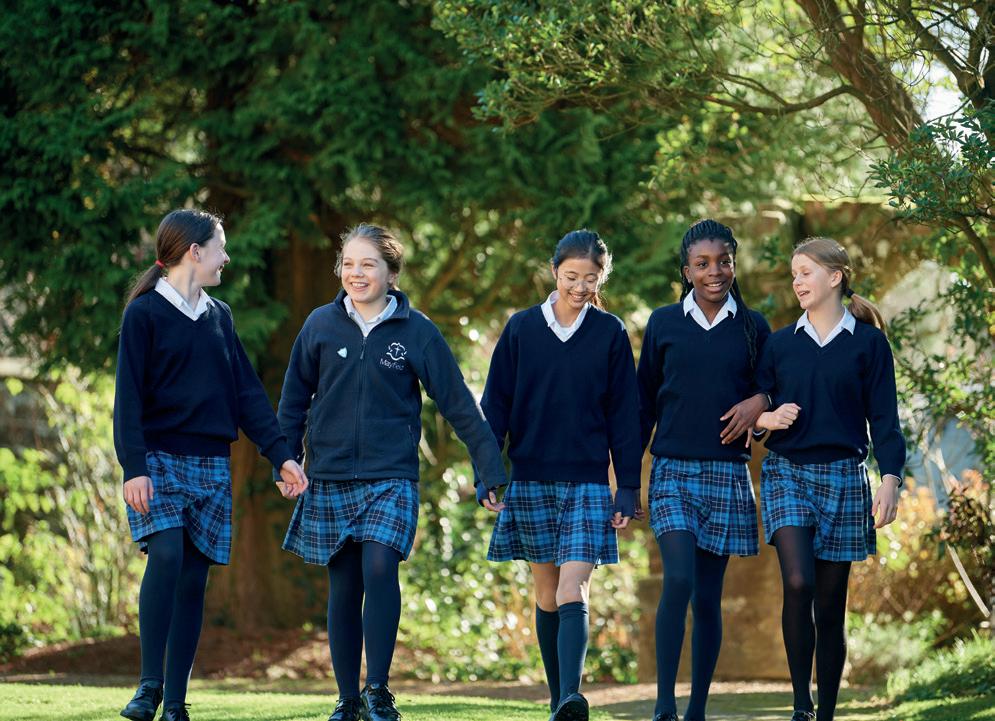
function and contribute constructively to the society in which they live, and in which we want them to define and lead. It takes different approaches to bring out the best in girls and boys. Not better, just different, and of course there are some similarities and shared approaches. Nonetheless, creating an environment where girls feel comfortable to get things wrong without panicking, stressing or losing confidence in themselves and their ability, is an art.
To do well at GCSE and A level, you need to learn the answers that the examiner wants you to give. As teachers, we have a responsibility to provide our students with the information and tools with which to achieve the best possible grades. To discern what someone wants – and provide them with information they need in the form they require it – is a useful skill, so this is an important element of education.
But it is not the only one, and sadly it takes on a disproportionate importance in the current education system, overshadowing other more practical skills and talents. If you have good teachers and work hard you can do very well, without necessarily having to think outside the box or


challenge any conventions. However, even if you understand complex concepts and think originally and independently, you won’t necessarily be rewarded with an A*.
We want to be educating a generation who can recognise fake news, who won’t be short-sighted and who will challenge the conventions of contemporary society when it is needed, rather than simply conforming. If we are going to stop this generation making the mistakes we have made, then they need to begin to make their own – sooner, rather than later. The best place for this to happen is in school.
ANTONIA BEARY Headmistress Mayfield School
“We want a generation who can recognise fake news, who won’t be short-sighted and who will challenge conventions when it is needed”




















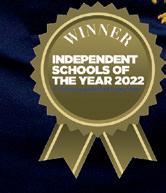







Sarah Gomm of Oakham School discusses wellbeing and pastoral learning – and its newly introduced connected curriculum





From workshops with expert speakers and dedicated lesson time to discuss wellbeing, pastoral learning and care have become Oakham School’s key focuses as part of its newly introduced connected curriculum. Pastoral care is far more important than anything else we teach children in school. I speak to a lot of parents, I teach Chemistry and I’m a big believer in all of the wonderful things we o er at Oakham School but, while exam results and academia are important, you can probably go through school without understanding covalent bonding, but you absolutely can’t go through life without knowing how to look after your wellbeing.
If you’re feeling in a good place, we know that you’re more ready to learn. There’s a significant link between academic resilience and personal resilience, so if you’re in a state of mind where you’re happy and healthy, your ability to learn and achieve will be significantly higher. Wellbeing falls into many di erent facets. Pastoral care is focused on what people do to you – your parents, your teachers or your peers – and anything that you are on the receiving end of. It is also about the actions that you do to help your friends.
Pastoral learning is much more focused on learning to care for yourself. This looks at self-care, where pupils are developing their understanding of what they can do to selfregulate their emotions and to ensure that their mental and physical wellbeing are in good shape. Topics such as consent, equality and diversity and how to manage your mortgage are also key skills that young people need to learn.
We are very mindful to teach pupils how to build resilience and the skills they need to develop their own pastoral wellbeing.
It’s also important that they understand why pastoral care and pastoral learning matter, so that when they leave us they have good knowledge of themselves and what they need to do to keep both mentally and physically in shape.
The introduction of our connected curriculum means that pastoral learning will be taught across Oakham School to all of our pupils during lesson time by specialist sta . The additional class time will allow us to really focus on wellbeing and make time for these hugely important lessons. It supports our existing tutorial programme and the work our excellent Housemasters and Housemistresses do.
There are some pupils who flourish when they are busy and there are others who may struggle to balance things in the same way. Our role is to help each of our pupils find what the right level of busyness is for them so that they can enjoy themselves without feeling overly pressured or losing the joy in what they are doing.
“Our connected curriculum means that pastoral learning will be taught to all of our pupils during lesson time by specialist staff”SARAH GOMM Deputy Head (Pastoral) Oakham School LEFT A teacher and pupil at Oakham School
School refusal has become a buzz phrase in parenting circles over the past year or so. It is also an area of concern across the whole education landscape. There is evidence the number of children absent from school for some or all of the time is growing.
Alicia Drummond – founder of the website Teen Tips and associated school platform Wellbeing Hub – believes the numbers are worrying. “The latest stats will tell you that, in November 2022, there were two million children in England missing from school and not in school. There are lots of different reasons for that, but government figures suggest that between one and two per cent of those are because of EBSA.”
The acronym EBSA is the preferred term for school refusal. It stands for Emotionally Based School Avoidance (you may also see ABSA – Anxiety Based School Avoidance). While we all sigh at the arrival of yet more education acronyms, the right descriptor is important here. “Refusal is not a helpful
word,” says Alicia Drummond. “Children are not being a problem, they’re having a problem. If you focus on the absenteeism and call it a refusal you are less likely to go into what’s really driving it.”
It’s important to recognise the clear distinction between EBSA and truancy or ‘bunking off’ as an occasional act of teenage rebellion or pique. “School truancy is deliberately trying to get out of school because there’s something you’d rather be doing,” says Drummond. “The definition of EBSA is when children fail to attend school because it’s too emotionally challenging; they attend, but only if there’s a very high level of support in place; or they avoid certain days, times of day or classes.” EBSA is more prevalent in secondary years, affecting boys and girls equally. It is also an umbrella term – there are many reasons why school attendance falls down.
Drummond, who is a BACP-accredited therapist, has done a lot of work with schools and young people over many years. She’s recently witnessed rising interest among the 200+ independent and state schools that come together to discuss prevalent education
and wellbeing issues as part of Wellbeing Hub. Recently, she gave a talk at Dukes Education’s inaugural education conference.
So, what causes EBSA? Alicia Drummond has lots of cases, gathered from real life. Sometimes trauma at home spills over –the pupil who regularly missed Thursdays because it was his mother’s day off and he wanted to stop her from drinking. Or the pupil who was peacemaker in his parents’ messy divorce. Other children are experiencing family and identity confusion – such as the brilliant artist who stopped attending art class altogether because she didn’t want to lose her ‘label’ as family creative after one of her sisters started taking the same subject seriously.
There may be undiagnosed SEND issues (these often become visible in senior school, when the pace of work and complexity of social interaction intensifies). Also issues around OCD disorders, where a child takes so long to get ready they will be late and that’s so threatening that they would rather not turn up. Physical conditions also spark EBSA, such
The number of children who are too anxious to attend school some or all of the time is on the rise. Absolutely Education finds out more about EBSA
LIBBY NORMAN

“EBSA is more prevalent in secondary years, affecting boys and girls equally, and it’s an umbrella term – there are many reasons why school attendance falls down”
as the promising athlete who just couldn’t cope with classes, even though he was academically able. He was eventually diagnosed with RED-S, a condition where energy burned exceeds foodenergy intake – his avoidance of the classroom was because he was so physically drained.
Children may not be absent from school all of the time – just struggling at certain times. Drummond recalls a teacher voicing concerns about one pupil who always came to class in a highly anxious state, but then settled once everyone was busy doing things. “The teacher said, ‘that’s not EBSA is it?’. I replied, ‘well yes, it is because the anxiety disappears when the threat disappears’.” Threats can be a huge part of EBSA – children are avoiding situations they feel they can’t cope with.
One big question mark surrounds covid. Has the pandemic made school avoidance more prevalent? Not easy to call, but perhaps it showed some children a route around difficulties. Drummond points out that the vast majority of children headed back to school gratefully, adding: “But for those who were already struggling – for them, covid was fantastic. They didn’t have to deal with all the extra difficulties”. Then, too, there are the children who may have been impacted by parents’ anxieties. School was an awful experience for some adults, so how do they stay positive when they see their child struggling in the same way? For
others, Covid unlocked many fears, so the security of home remains preferable to the dangerous world beyond the front door.
No one wants to (or should) drag an unwilling child through the school gates, and nor should parents struggle on alone. Even if you suspect a specific school issue – perhaps bullying or a bad relationship with a teacher – is at the root of a problem, it’s important to collaborate with the school to help your child. “If, as parents, you can’t work with the school, you’re pushing water uphill before you’ve even started,” says Drummond.
Sitting down with the child in order to find out what is distressing them is the critical first step. This can be a slow process and conversations needs to be empathetic and non-confrontational. “Only by looking 360 degrees are you going to make any progress,” says Drummond. She works all the time with schools and says there’s invariably a positive and helpful approach to finding solutions. “In my experience, schools are incredibly keen and go above and beyond –go out to the home, meet in a neutral space, invite families in out of hours so it’s quiet.”
It’s good to remember that school can be intimidating for all children sometimes. Alicia Drummond says practical therapies can and do work. It might be sitting down with an

awkward teen and helping them come up with a list of conversation starters or talking to the child on the edge of the playground and pointing out how peers are making friends. She adds that it’s important not to “pathologise” normal human reactions – the fears and anxieties that are all part of growing up. Where parents suspect EBSA, early intervention is critical in preventing a molehill becoming a mountain – the longer a child stays out of school, the harder it is to return. Most important of all, says Drummond, involve your child in finding the solution. “That’s really important. Often children are experiencing a sense of powerlessness. It might be friendships, relationships at school. Whatever it is, they feel powerless to change something. We don’t want to take their power away a second time.”
Teen Tips teentips.co.uk• Early intervention is critical – talk to your child if you spot a pattern.
• Don’t focus on school avoidance (what), but the reasons for it (why).
• Avoid increasing anxiety by talking about schoolwork / milestones missed.
• Involve school really early and as your partner – ‘we think we have a problem’ is a helpful opener.
• Take advice because similar issues have probably been encountered before and solved before.
“Early intervention is critical in preventing a molehill becoming a mountain – the longer a child stays out of school, the harder it is to return”
At ISL our students have access to the whole of London as their classroom. The diversity and interculturalism of the city is reflected in our school, where students use their individuality and passions to explore, design and create their learning in ways that motivate them to achieve success.
Shaping stories since 1972
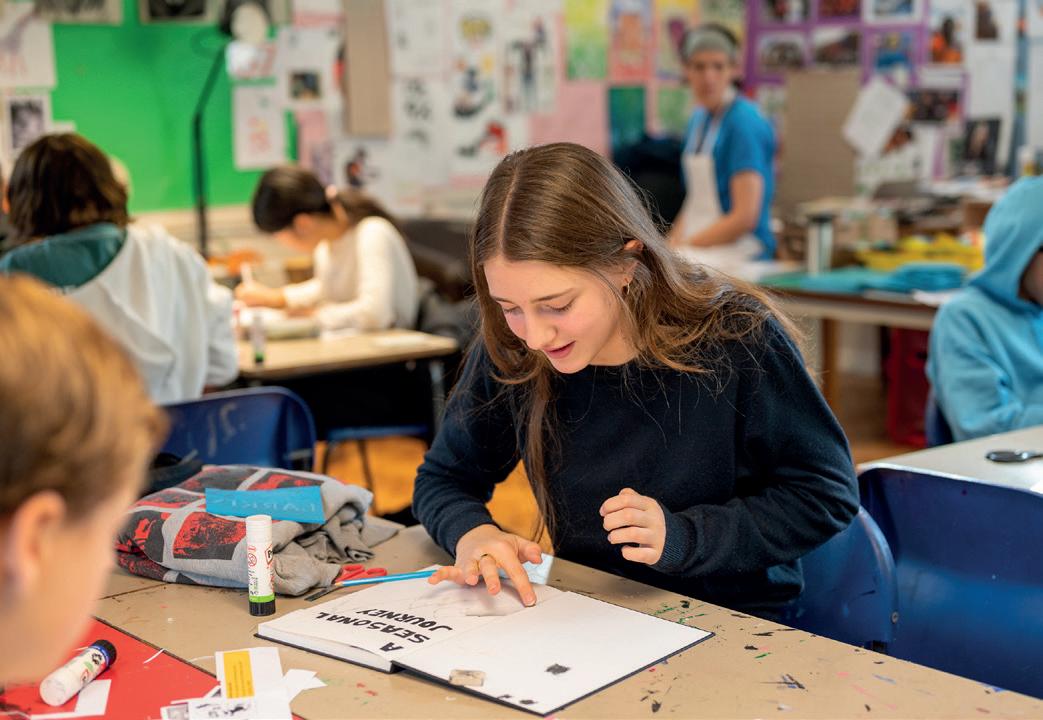
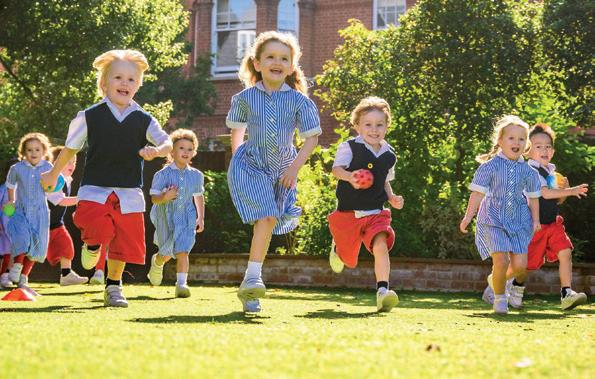


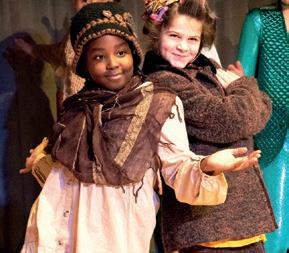
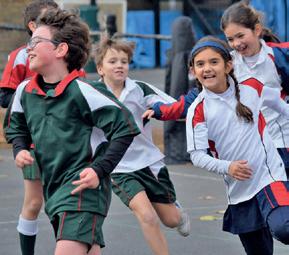
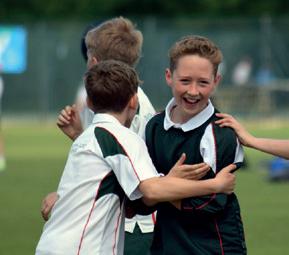
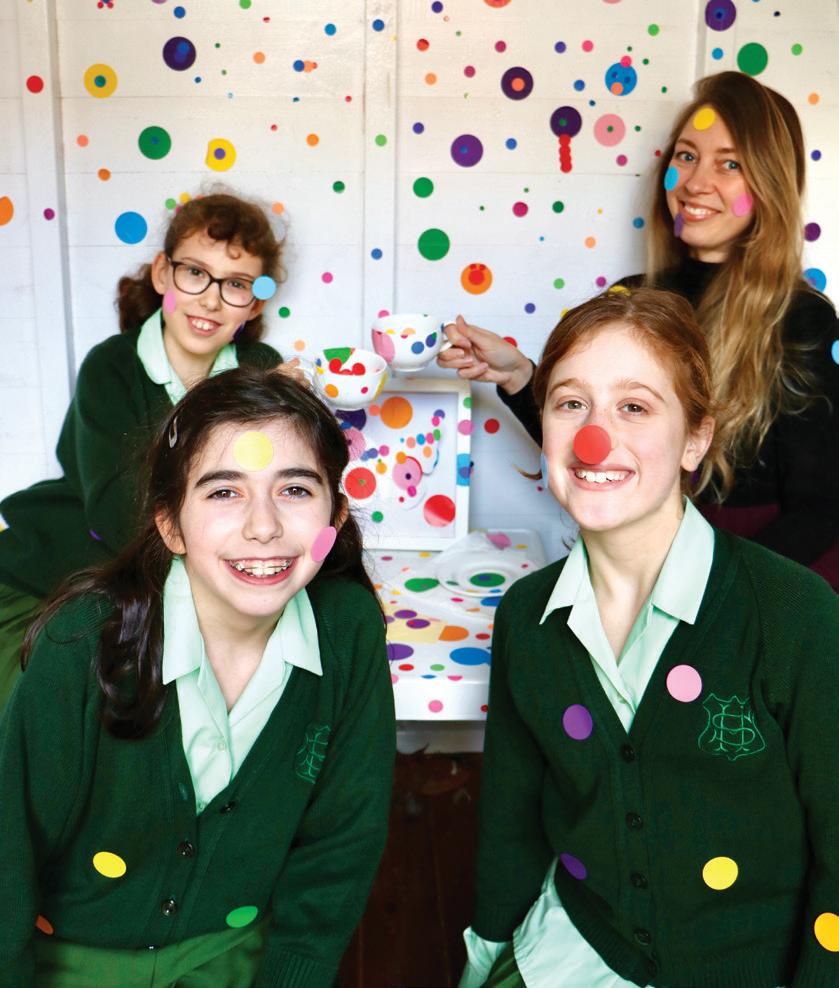
Hampstead prep Sarum Hall is an Artsmark School, committed to embedding arts and creativity across the whole curriculum. Alongside traditional art lessons –covering areas such as ceramics, print making, painting and drawing – the team takes a crosscurricular approach. This means, for instance, that when Year 3 studied the Anglo-Saxons in history, they had a go at dying yarn with vegetables and then weaving their own cloth. Student Art Ambassadors have a formal role, ensuring the student voice in how the arts are taught across the school. There is also a distinctly immersive approach, with challenges such as recreating particular paintings, such as Yayoi Kusama’s ‘Obliteration Room’ – this involved plenty of fun with spots and a wild transformation of the playground shed. Alongside art lessons, dance, music and performing arts are all popular parts of the school day and a core part of the curriculum. After school clubs cover a wide range of areas – from choir and music to

The arts develop creativity, social skills, persistence and sometimes luminous talent. Absolutely Education speaks to schools that make the arts journey one of mind-broadening possibilities
‘ambitious artists’. Specific events have been held to mark important events such as World Arts Day, with children dressing up as characters from their favourite paintings and then taking photographs.

For those pupils who are more engaged in science subjects, Design Technology is, say the sta , a great crossover activity where they can build kites, create marble runs or design 3D posters. Technology is used wherever possible (and appropriate). For the same Anglo-Saxon project where pupils were dying and weaving, they then conducted a fashion show and filmed post-show interviews.
Sarum Hall has no doubts that the arts are invaluable for igniting children’s enthusiasm and helping them develop skills for life. “Children who understand and have an appreciation of the arts tend to be those who are willing to listen and understand the views of others. We believe that creative thinking is a life skill, useful for any subject or future career,” says Headmistress Karen Coles. “The arts can unlock the potential of children and young people, develop their characters, talent and confidence and increase their knowledge and understanding of so many di erent areas of life.”
At Queen Ethelburga’s (QE), the creative arts are supported and celebrated across all four schools. In Chapter House, there are specialist lessons in music, performing arts and dance alongside a full arts curriculum. At QE’s Kings Magna Middle school, creative arts curriculum lessons include art, 3D design and technology, music and drama. QE students get extra opportunities through the enrichment and super curricular o ering, giving Years 6-9 tasters of musical theatre, dance, ‘Class Brass’ (a brass ensemble), music composition and a whole range of extra arts options, such as photography, animation, anime art and 3D design.
When students move on to either College or Faculty, this breadth continues. In College, there’s a full range of creative GCSE options. In Faculty, students can choose BTEC or GCSE options.

Once they move up to Sixth Form, students have a wide range of A-level and
BTEC options across the arts. There are opportunities to specialise in areas such as fashion, illustration, print or interactive media. Similarly, with performing arts, students may specialise in areas such as directing or musical theatre.
Vocational Curriculum Manager and Head of Creative Arts at QE Helen Stephenson says the extra-curricular o er is “huge” across performance and visual arts areas. “We o er a Saturday school, Queen’s Academy. Here students can take part in a wide range of activities from self-directed study and workshop time to practitioner-led workshops – recent examples have included shadow puppetry, collage, portfolio building for university applications, and visiting speakers with an emphasis on creative careers.” She points to recent examples where students have focused on fashion marketing and film and documentary making.
QE also runs Saturday arts academies and the King’s Academy theatre school is open both to students at the school and young people in the area and includes dance, singing, drama and musical theatre. There’s a Saturday music workshop where students get involved in band, jazz band, rock and pop choirs, wind group or music theory for the ABRSM exams. “All these weekend
“At a very basic level, exposing children to creative pursuits might well uncover a latent talent or undeveloped skill that can be nurtured”
activities are in addition to our whole school collaborations,” adds Helen Stephenson.
“We have a whole school musical each year in the Autumn term, most recently this was High School Musical. We o er drama performances, dance competitions, house music and musical recitals as part of assemblies throughout the year.” There’s also a creative collaboration between the Creative Arts and Sports departments for the annual Gym and Dance Display, always including a workshop with a professional dance company.
QE o ers an Arts Award, giving its students the chance to achieve in a creative or performance area. The school is keen to o er the whole range of possibilities. For instance, interactive media and techniques and concepts of game design are being introduced this year. Helen Stephenson believes this is important in ensuring enthusiasm is built among all students – and they gain the soft skills required by employers. “New statistics reveal the Creative Industries sector is growing more than five times faster than the national economy,” says Helen Stephenson. “We open up our students from the very earliest ages to the 6th form to a breadth of creative opportunities.”
At Cranleigh Prep, there is a strong focus on the arts, with art, drama and music lessons every week. There are also dance lessons in Years 3-5, and with DT and food technology also in the mix up to age 11. “We also celebrate the arts in whole-school events, such as the House Singing Competition, which involves all pupils,” says Deputy Head (Operational) and Music Teacher Catherine Beddison.
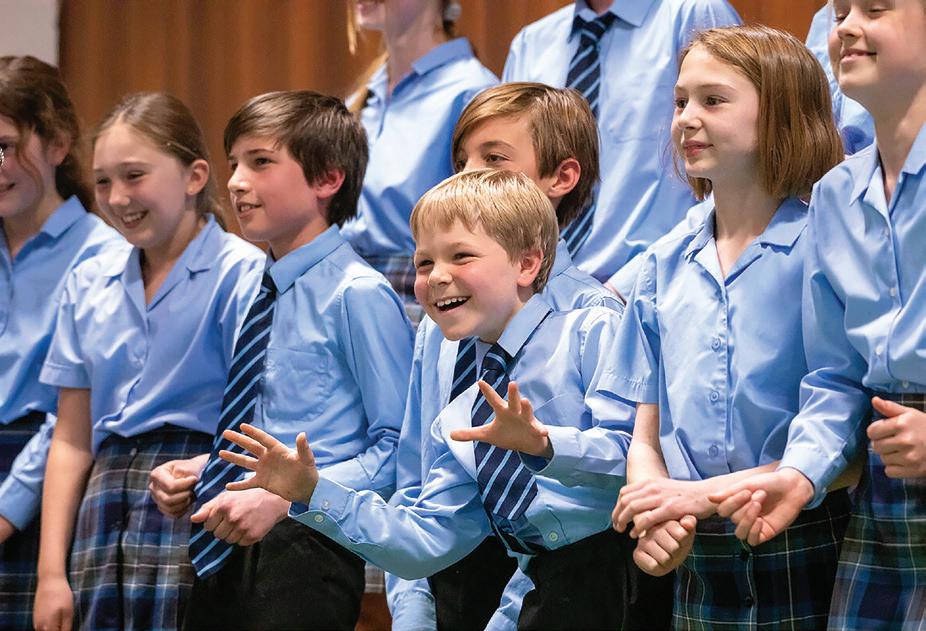
Of course, o timetable is where many children discover their passions, and the school’s rich mix of co-curricular activities range from Music Production Club and Awesome Book Awards Club to activities such as rehearsals for school plays and an
after-school Media Club where children get hands on with cameras and editing equipment. There are also invitation-only activities, such as Da Vinci Club for prospective art scholarship students. The team manage things carefully to ensure that there are no clashes between, say, Chapel Choir and Street Dance. “Children and sta have developed a sense of mutual respect between disciplines,” adds Catherine Beddison.
Whatever a child’s natural interests, curricular and extra-curricular activities are designed to cultivate engagement. Drama is a classic example, says the Head of Drama, Philip Waller. “It is important to show the relevance of Drama for each pupil. I am not looking at merely working in a cross curricular way through script work and improvisational games, which of course is a fundamental part of it, but more importantly using Drama as a training ground to permeate confidence
“Children who have an appreciation of the arts tend to be those who are willing to listen and understand the views of others”ABOVE
across all learning.” Philip Waller ensures students have access to film making as part of these activities, showcasing modern and technical aspects of the craft.
Similarly, with Art, children are introduced to newer mediums alongside the traditional forms. “Digital art becomes far more serious, and therefore interesting to children, if the link between digital art and concept art for movies and video games is explained and investigated,” says Director of Art Rob Perry. “It is the enjoyment and confidence, gained through a greater sense of achievement and selfworth, that the children take most from their artistic experiences,” he adds.
Music at Cranleigh Prep is all about inclusivity, with open-access choirs at all stages. Pupils can sing or take part in percussion groups, even if they don’t formally learn an instrument. “As a whole school community, pupils sing together in weekly Chapel services as well as congregational hymn practices,” says Head of Music Ruth Williams. “We have pupils who take part in County and National ensembles and choirs, as well as individuals with casting agents for West End shows.”
The school broadens music perspectives, embracing areas beyond Western classical


music – which pupils love. Music technology is also hugely popular and offered all the way through to A level at Cranleigh. “We are always looking at different ways to ignite creativity, and we take a bespoke approach to musical ensembles,” adds Ruth Williams.
The school has opted for an approach that sees some compulsory subjects – so everyone tries them out – before offering electives as they get older. “Compulsory arts subjects for younger children certainly benefit them at school and beyond,” says Cranleigh Prep

School Headmaster Neil Brooks. “At a very basic level, exposing children to creative pursuits might well uncover a latent talent or undeveloped skill that can be nurtured.”
He adds that arts build confidence and teamwork, as well as providing a balance with other subjects. “The need for children to recognise that they are a part of something bigger and have a responsibility to others has increased post pandemic and the arts, along with sports, provide a wonderful vehicle for meeting it.”
Winchester school St Swithun’s offers the full range of mainstream arts subjects, including History of Art, Textiles and Design and Technology. The school has an approach it calls ‘appropriately academic’, with plenty of opportunities to get creative outside the classroom. Indeed, the whole approach here is to encourage girls to try new things and learn from them. Along the way they develop the broad range of skills that arts teaching and learning can bring – from perseverance to teamwork.
The school says that while some girls naturally gravitate towards participating in lots of activities, others need a bit more
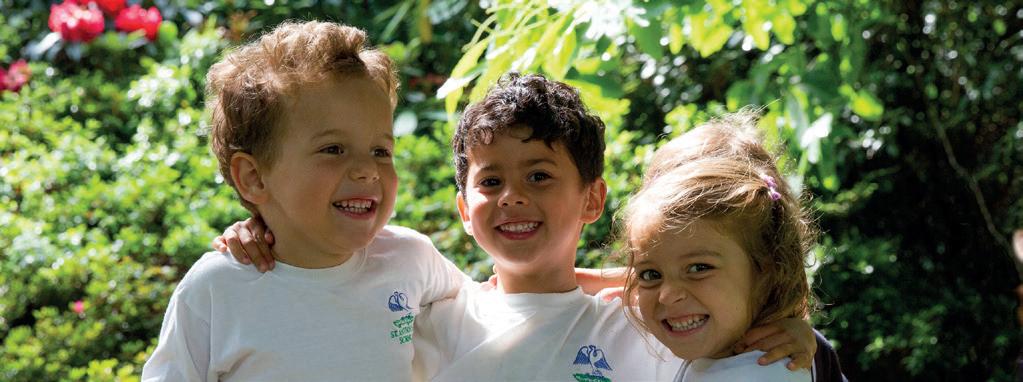
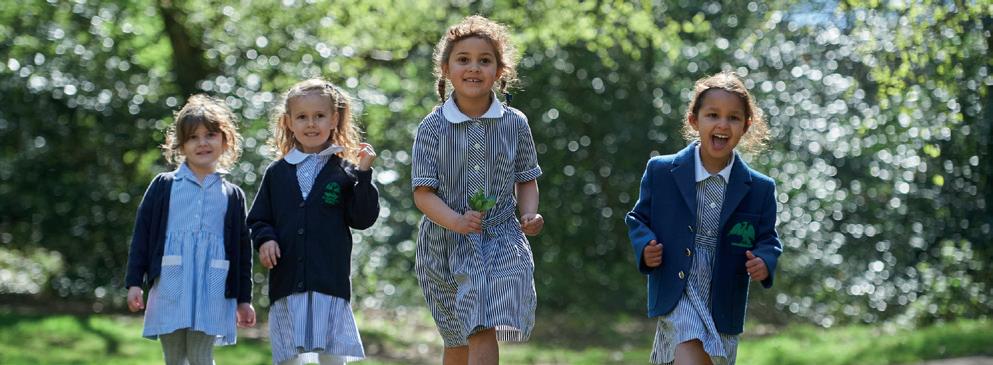

persuasion to spread their wings. Boarders here are expected to sign up to a certain number of after-school co-curricular activities and day students are also welcome to join. Tutors ensure a good balance of activities – and also make sure pupils honour their co-curricular commitments made at the start of each term.
For students who are more focused on, say, science subjects, the school designs options that will appeal. For instance, creating science-themed videos or animations and fashion theatre productions can help to bring girls’ interests into play. A recent example of the cross-disciplinary approach was a drama production
Welcome to Terezin, about life in a wartime concentration camp. It was an ambitious production, warmly received, and with appeal to historians as well as pupils who enjoy acting and behind-the-scenes roles.
St Swithun’s sees a chief benefit of arts activities as developing critical thinking, alongside communication and creative skills. It adds that promoting cultural awareness and emotional intelligence are vital parts of what the arts bring to young people’s lives within and beyond school.
Downe House offers a full curriculum across creative subjects, including History of Art, Ceramics, Textiles and 3D Design. Art and Design is on the curriculum for the first two years “This enables pupils to develop the ability to appreciate the visual world and to respond in a personal and creative way,” says Downe House Director of Admissions Tara Reeve.

“They have the opportunity to work using a variety of subject matter and media and develop skills to interpret and convey ideas and feelings.” Just as important are the analytical, experimental and documenting skills developed and honed by these subjects.
Co-curriculum activities are broad, and an important part of life at the Berkshire school. “Our department and pastoral staff support the girls to find the right balance and diversity of activities, which can include joining a formal group or creating their own group,” says Tara Reeve. These may be staff or pupil led, but the focus is on encouraging girls to try new things. “We also find
opportunities for our pupils to visit exhibitions and galleries, enjoy stage productions and films, as well as providing performing and creative arts workshops,” adds Tara Reeve.

The emphasis at the full-boarding school is on ensuring a rounded education – and some fun. “There is no better way of getting pupils involved than introducing a little healthy competition – and our inter-House competitions (House Drama, Dance, Art and Music), led by our Sixth Form House captains, are a great way of encouraging participation.” Cross-department initiatives, such as a recent groundbreaking Art/Music collaboration called ‘Soundscapes’, add depth and innovation to the creative offer.
Tara Reeve says school facilities such as 3D printers are well used for creative endeavours, and weekend workshops in areas such as jewellery making are a huge hit. All media and mediums are explored, and one popular annual event is a Year 9 project with a film company where teams spend a day creating a film around campus. “The pupils fully embrace this opportunity, and the project is rounded off with an Oscars-themed evening of fine dining, where all the videos are shown, and everyone dresses up for the occasion.”
Tara Reeve says the arts have a vital role in developing young people’s confidence and self-belief. “Finding and nurturing a pupil’s strengths and talents is our mission and in the case of the creative arts and performing arts, there are so many opportunities for our pupils to explore their artistic and creative potential.”
“Promoting cultural awareness and emotional intelligence are vital parts of what the arts bring to young people’s lives”
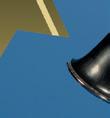



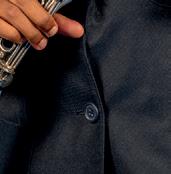
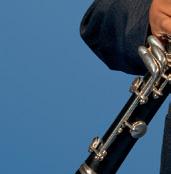


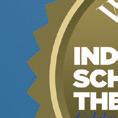


Next

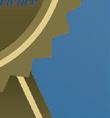























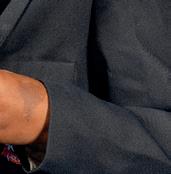
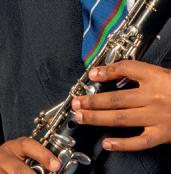


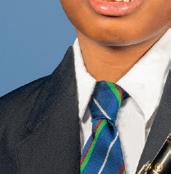


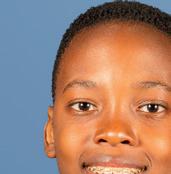




















Schools have for decades taught business studies and economics. For longer still they have taught numeracy and financial literacy and have instilled in generations of students the kind of dynamism and chutzpah that traditionally have seemed essential to business, particularly the world of the entrepreneur.
Like many schools, we tell students that ‘the door is always open’ if they want to talk. We want them to know that we are receptive to their ideas and that what they have to say is important. But we’ve learnt that just leaving the door open isn’t enough.
As the Head of the Lower School, with children from Reception to Year 6, it is my job to ensure there are clear structures which allow them to have their voices heard. In traditional parent-teacher meetings, the grown-ups talk about a child’s progress – vital conversations take place without the most important person being present. We do things di erently.




Each term the students invite their parents into the classroom where, along with their teacher, they show their work, talk about their progress and measure it against goals they themselves have set. They are asked to reflect on their learning behaviours, celebrate successes and talk about how they can improve going forward. The children are expected to have an opinion about their own learning, to take responsibility for it and work as part of a team with their teacher and their significant adults to improve it. Every time, we see how this simple change of protocol positively impacts their learning.
As the children move up the school, each class nominates two people to be part of our Pupil Council, tasked with reporting the concerns of their peers and helping to look for solutions.
Giving students a route to e ect real change means they feel empowered and valued. They don’t just come to school, they are the school. Recently our Pupil Council expressed concern about the lack of mixing across genders and year groups, especially at breaktime. One Pupil Council member summed it up saying: “People were playing the same games with
the same people”. Another added: “It didn’t feel very nice because we’re a whole school together and it would be nice if we played together”.
Working with class teachers Pupil Council came up with a plan for ‘Big Playtime Playdates’ twice a week, which are designed to allow space for new friendships to grow and to encourage children to try new games and activities. Boxes of board games, craft materials and sports equipment are made available – all organised and distributed by Pupil Council, who get their clipboards out to supervise the signing out of materials!
Next term they have been asked to evaluate the success of their plan and decide whether or not it should continue. Their baseline data will be reviewed before decisions are made. So far, the response has been really positive. A class teacher told me that students who were reluctant to begin with now look forward to Big Playtime Playdates.
KAREN THOMAS Head of Lower School The King
 School, London
School, London
Allowing the Pupil Council to make a fairly big change to school life, then asking them to organise it and reflect on how it has worked out, is a very practical way to make sure students not only know that our door is always open but also how to walk through it.
“The children are expected to have an opinion about their own learning, to take responsibility for it and work as part of a team”
The Head of The King Alfred School Lower School on why giving students agency within school creates a positive atmosphere for learning
Eaton House Schools are proud to have provided an exceptional education to our pupils since 1897. Based on two large sites in Belgravia and Clapham, our single sex schools for boys and girls are non-selective* and yet achieve outstanding results. We feed into Westminster, Eton, St Paul’s, Wycombe Abbey, St Paul’s Girls’ School, Winchester and other fine schools, winning many scholarships, awards and prizes each year.


Wellbeing is at the core of this well-rounded education. Each child is supported as an individual so that they can flourish both academically and socially. Finding the potential in each child is our passion.
Miss Sam Feilding, on 020 3917 5050, or visit www.eatonhouseschools.com for more
*Non-selective at 2+ and 4+ entry.
Department of Work & Pensions records show that 76% of mothers now return to work within 18 months of having a child, with day nurseries remaining the most popular childcare for under threes While cutting the umbilical cord and enrolling your little one can still be a tough decision, the benefits are clear. Aside from the daily routine, spending time in a play and learning environment helps academic readiness. “A nursery or pre-school setting provides structure and routine for young children, while building the social, pre-academic, and general life skills that prepare them for ‘big school’,” says Eilish Sleator, Head of School at North Bridge House Nursery & Pre-Prep in West Hampstead.
So how do you choose the best nursery for your child? The di erence between settings often lies in how the Early Years Foundation Stage (EYFS) is delivered. EYFS providers are not bound by the same sta -to-child ratios. For children aged 3+ years in a private nursery or pre-school, the typical sta to child ratio is 1:8. At North Bridge House, the ratio at Nursery (age 2+) is 1:4 and in the
pre-Reception (3+) class, it is 1:6. The team say this enables individualised teaching and helps children thrive. NBH has also adopted a ‘mastery’ approach. Pupils master key concepts before moving on to the next topic. Individualised support gives children time to grasp an idea and gain deeper understanding.
It’s important to consider the whole nursery experience, as non-cognitive learning is just as essential. Nursery is your child’s opportunity to discover life outside the family unit – also developing key social and communication skills and self-confidence.
“Again, this comes down to what the pre-school or nursery o ers above and beyond the EYFS,” says Eilish Sleator.

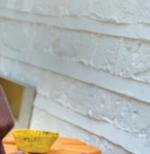
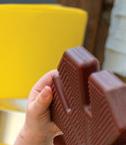
“While this framework is designed to ensure a child’s personal development as well as academic progress, we look to provide as much opportunity as possible to spark curiosity outside of the formal curriculum.”
Specialist subjects are o ered from the outset, with Italian, drama, music and dance, delivered on a weekly basis in the Nursery. In the 3+ class, children also benefit from twice weekly French lessons and bi-weekly Forest School.

“At this age, we do not o er specialist subjects with the aim of developing the next Mozart or Ginger Rogers,” says Eilish Sleator. “Our primary aim is to provide breadth and depth to the earliest years of education, to inspire that lifelong love of learning, and to equip our little ones with the confidence and resilience to thrive.
“While factors such as location and ease of access will play a significant part in the decision-making process, when choosing a nursery for your little one I would always recommend finding out about how they will be supported and developed as an individual, and what the nursery or pre-school can o er to provide an even wider learning experience than the EYFS framework.”
“We provide breadth and depth – and equip children with the confidence to thrive”







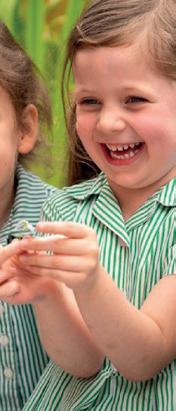

At York House we are no strangers to wildlife. Our onsite smallholding is permanent home to more than 50 different animals, including donkeys, pigs, goats, deer and sheep. In 2021, we welcomed 14 lambs (nine rams and five ewes). Before we lambed, we only had 13 sheep in our smallholding. The flock looked small for the size of the paddock, and it was at this point that we had discussed lambing our ten Shetland ewes.

We were keen for our children to have the chance to experience the miracle of new life. Lambing offers the opportunity to combine the teaching of science topics with real-life examples. Children learn where the lambs come from and are able to witness a birth. Teachers have also brought their classes out to see the lambs, some just a few hours old, and the children have been mesmerised.
Lambing highlights the importance of calmness, quietness and understanding around animals. Children are intrinsically drawn to the strong bond and nurturing instinct they see between ewe and lamb, which is helpful when discussing their own families and family values. We find children tend to think more carefully about their actions – the need to be kind and gentle. This year, we selected six of our friendly ewes to be tupped. The children have been involved in the process via our smallholding club and
have had the chance to meet ‘Mr Jigsaw’, our new pure bred Shetland ram. We discuss why he is sharing a paddock with the ewes, the difference between an intact and a castrated ram and gestation in sheep. The children also get involved in feeding time, ensuring ewes have enough feed to help the lambs grow.

Post birth, the children can visit the lambs during every smallholding club. We follow the path of nature and allow the children only to stroke the lambs if they approach. That way the newly born lamb and its mother have time to bond and create trust. If a lamb needs a top up of milk, then we will allow the children the chance to assist with preparation of the milk bottles and feeding. There are a
multitude of skills to be learnt, patience for one. Children soon learn that you cannot force a lamb to approach and that it is just as rewarding to sit down and watch – and that lambs are more likely to be inquisitive and approach you. What children learn during lambing may even stimulate their own interest in becoming future farmers, vets or smallholders. There are obvious benefits for academic learning – and being around any animal helps to improve mental wellbeing.
Each lamb has its own personality, and the children are able to build long-term relationships with them, watch them play, grow and develop, and to feel part of their life story. Children in our nursery now will recall seeing lambs being born when they leave us at the end of Year 8 – those sheep having grown and developed alongside them in their school journey. Lambing in school is truly an education in life. It is also something that will live on in our children’s memories as they continue taking their own steps towards the future.
York House School“Lambing in school is truly an education in life – it is also something that will live on in our children’s memories”
Tara Warren of York House discusses the positive impact of new springtime additions to the flock at the Hertfordshire prep school
TARA WARREN Outdoor Learning and Smallholding Manager
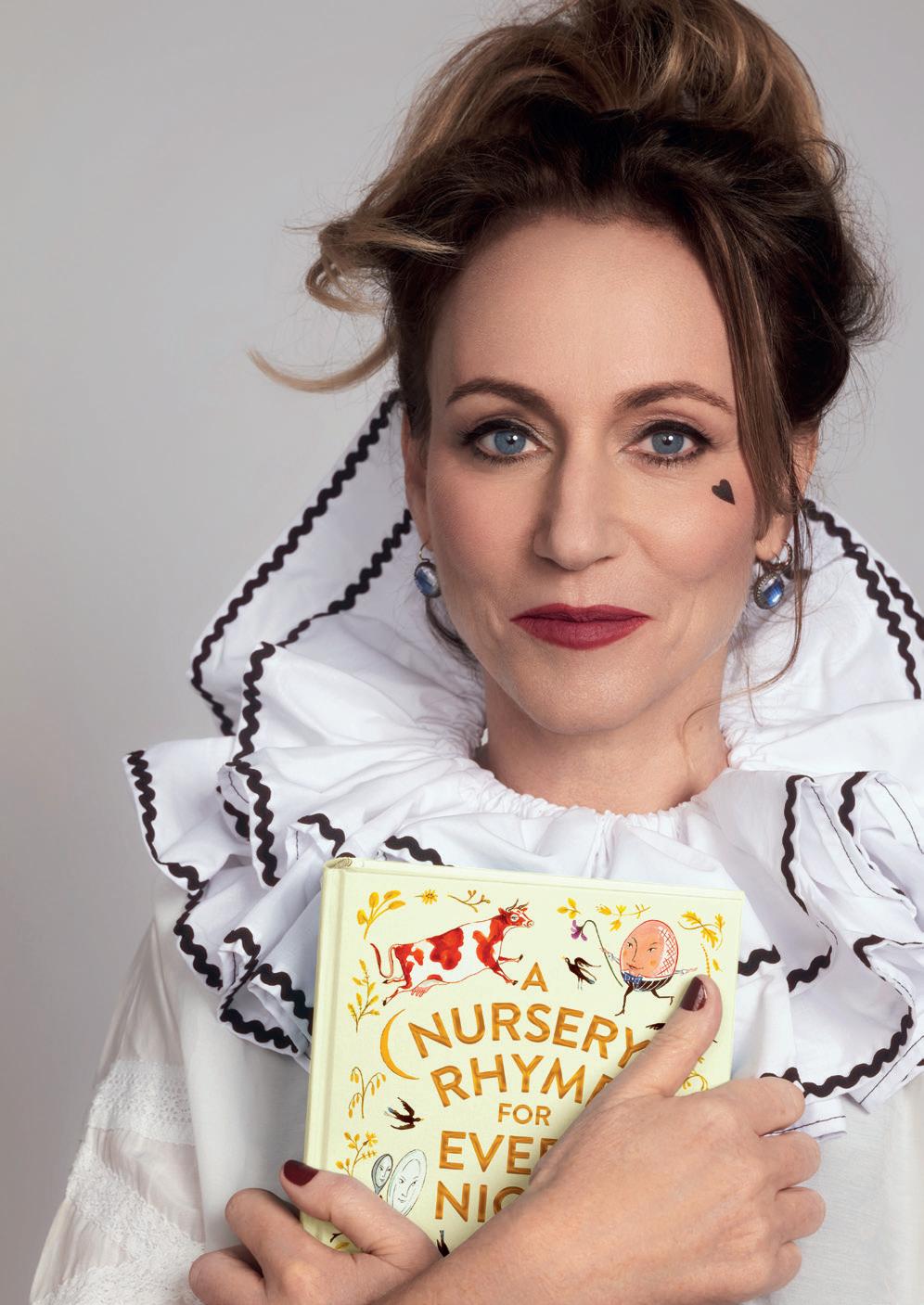
“Nursery rhymes are the beginning of our journey with words and our joy in words”
Nursery rhymes are something that we take for granted. Most of us can recall ditties and poems sung or told to us in childhood. Sometimes we don’t even realise we remember all the words until we find ourselves passing them on to a small child. Yet many of these works date back centuries, part of a rich oral tradition, especially across the English-speaking world.
Allie Esiri never takes nursery rhymes for granted, and she’s spent around two years compiling her impressive new anthology, A Nursery Rhyme for Every Night of the Year. Beautifully designed, and with charming illustrations by Emily Faccini, it is a treasure house of rhyme. ‘Humpty Dumpty’ is in there, so too ‘Twinkle Twinkle Little Star’, but also contributions from contemporary stars of children’s literature such as Julia Donaldson and Michael Rosen. Even that most annoying of all earworms ‘Baby Shark’ made the cut.
Esiri is no stranger to taking on big projects – her previous bestselling anthologies have included A Poem for Every Night of the Year and Shakespeare for Every Day of the Year. She has also organised major live poetry events, appeared at august literary festivals and spoken up for poetry as a force for good over many years. So where do these rhymes from the earliest
years of childhood fit in with the wider poetic tradition? “I always think a poem is just a nursery rhyme that has grown up,” she says. But this is not to lessen their import or impact. “Think of ‘Over the hills and far away’ – G.K. Chesterton said it is one of the most beautiful lines in all poetry. And Robert Graves said the best of the older nursery rhymes are nearer to poetry than the greater part of The Oxford Book of English Verse. If you’ve got them inside your head, it’s such a gift: you have got beautiful words to draw on and make you happy.”
Some of the earliest language children hear and repeat comes from rhythm, rhyme and repetition – and Esiri says this is important, both for their enjoyment and their formative development. “Poems add language and literacy skills – and with nursery rhymes you can add numeracy, as there are some wonderful ones about counting. There are


Allie Esiri’s new anthology of nursery rhymes offers a rich variety of poems, songs and ditties ancient and modern to delight children and adults alike
social, physical and emotional skills that are being offered. Some are purely didactic –ABC rhymes – and others are about manners or behaviour. Then there are games, skipping rhymes for instance.” Of course, there are also the cautionary tales (the baby rocking out of the cradle, the old man bumping his head, the bed bugs biting) but Esiri sees no need to worry. “The meaning reveals itself in later life,” she says. “They also might help children deal imaginatively with violence and danger – rather like fairytales.”
The research phase of this anthology also meant finding the version to include – oral traditions inevitably mean some
fascinating variations in words and phrases, especially as nursery rhymes travelled across the world and were adapted to fit time and place. The origins of many nursery rhymes are lost, but myths and folklore about their meaning proliferate and many have a fascinating back story or current relevance.
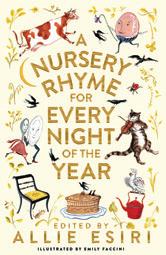

This is something Allie Esiri deals with, and her informative introductions to every rhyme are a delight. ‘There Once Was A Man Named Michael Finnegan’, an Irish poem first noted down in 1921, even makes an appearance in James Joyce’s Finnegans Wake, for instance. Or there’s ‘Humpty Dumpty’, sometimes believed to be about Richard III’s death at the Battle of Bosworth Field. But Esiri helpfully points out that equivalents can be found across Europe (in Germany he’s ‘Hümpelken-Pümpelken’) and the famous egg is even referenced in Taylor Swift’s ‘The Archer’. Who knew that ‘Jack Be Nimble’ is based on the popular childhood game of candle-leaping, from those far-off days before health and safety was even a thing? Or indeed that ‘Thirty Days Hath September’ is found in various forms across Europe – and with a French version dating from the 1200s.
A Nursery Rhyme for Every Night of the Year is organised by theme. March is spring and International Women’s Day,
while April is, of course, April Fool’s Day and Easter, but also Passover and Ramadan. September is back to school, with educational nursery rhymes; November explores history and remembrance, and December has a festival flavour.
Creating an anthology that works is both an art and a science. “It’s like a giant puzzle,” says Esiri. “You look for the variety in different places, classic and modern, male and female, some funny and some moving. It’s also how they sit next to each other.” This brings some nice touches. ‘Roses are Red’ sits opposite Smriti Halls’ ‘Chilis are Red’, while ‘Los Politos Dicen’ (a classic from Ecuador) and ‘Little Boy Blue’ make a suitably rustic pairing. This is a rich bedtime read for young children, and Allie Esiri hopes it will also be a resource that early years and primary teachers tap into. One of the great beauties of nursery rhymes is that they deliver whole stories and complex pictures in few words. But they also introduce children to the sounds of language and the power of repetition and rhythm. “If you are knowing and loving a nursery rhyme, then I do think it demystifies poetry,” says Allie Esiri. “Nursery rhymes are the beginning of our journey with words and our joy in words.”

“Robert Graves said the best of the older nursery rhymes are nearer to poetry than the greater part of The Oxford Book of English Verse”
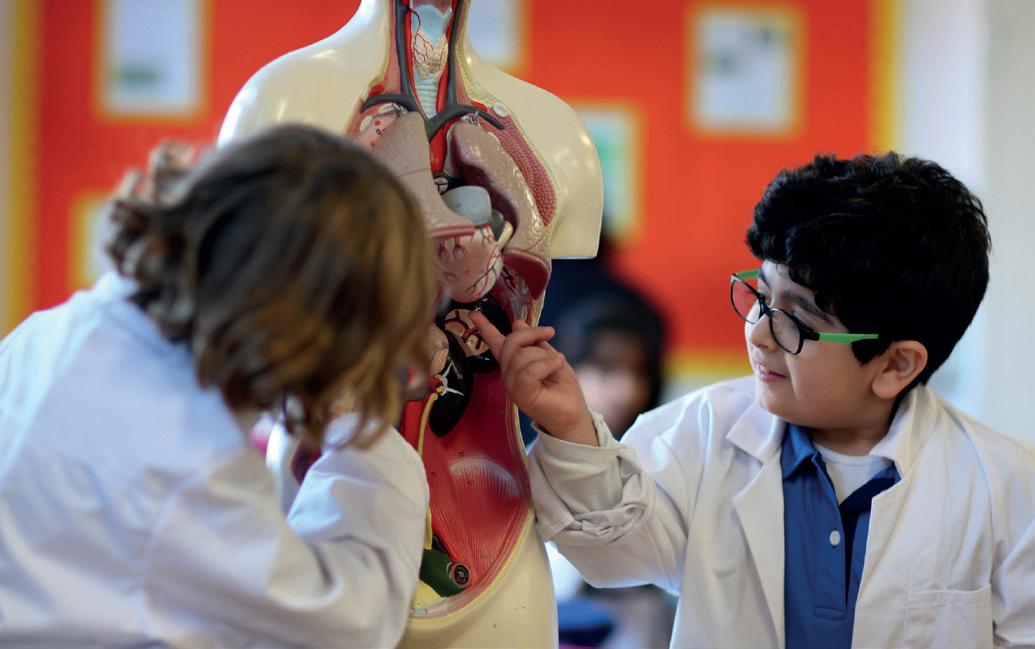











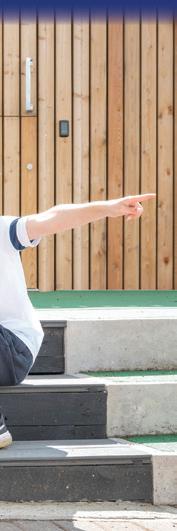





It’s not that I can’t do it, it’s that I can’t do it yet!’ is an oft-repeated phrase at Eaton House The Manor Pre-Prep. We believe in encouraging boys to have a go, even if the path forward is not immediately illuminated. With the average number of jobs per lifetime increasing with each generation, it is more important than ever that those first few years of school build a deep-rooted love of learning. As educators, it is our duty to foster an environment in which children are not only stretched but wish to stretch themselves. We want them to relish each new challenge, rather than run from it. With this in mind, I have broken down the strategies that we use to motivate the boys in our charge to want to expand their own potential.


We know that one of the surest ways to build resilient motivation is to support boys’ individuality and freedom of expression, while challenging ‘permission culture’ and anxious perfectionism in relation to schoolwork. It boils down to encouraging children’s natural
ability to want to push boundaries, do things their way, take risks and have a go, and it applies equally to English and mathematics.
We support every child, by breaking each task down into small, achievable steps that form part of a challenging trajectory. Teachers make hundreds of micro-assessments in every lesson to gauge how each pupil is progressing through a task, and how that task may be adapted ‘on the fly’ in order to enable them to make progress during the lesson. Whether a boy has taken his first steps in forming a letter or a number, remembered – at long last! – to include capital letters and full stops, or written a self-motivated description of their favourite food, well-judged praised for e ort reinforces self-esteem and builds motivation.
We do not expect our pupils to be robots, with equal levels of motivation every hour of every day. We treat them with empathy and understanding when things just will not flow. Our aim is to help them to
view dips and slips as part of the process of deep and e ective learning, rather than a cause for disappointment and despondency.
We use a multi-sensory and graduated teaching style that prioritises depth of conceptual understanding as the foundation of pace and fluency of procedure – from developing a deep understanding of composition of the number six, to considering how commas may be used in clauses. We run welcoming and inclusive classrooms, with a culture of high expectations. Activities and lessons are designed so that boys across the attainment spectrum may commence a task – often choosing it themselves – that is pitched at a level ‘just right’ for them, before moving on to progressively more challenging activities.
DAVID WINGFIELD Headmaster Eaton House The Manor Pre-PrepOur aim is to educate pupils to be adventurous, curious, and brave. This starts in our classrooms, and it quickly spreads beyond the walls of the school because the insights above, I believe, are as valuable for progress in life as they are for academia.

“Our aim is to educate pupils to be adventurous, curious, and brave”
North Bridge House is on a constant journey of getting to know every child as an individual, realising their unique potential through a rich and diverse academic and co-curricular programme at every school stage.
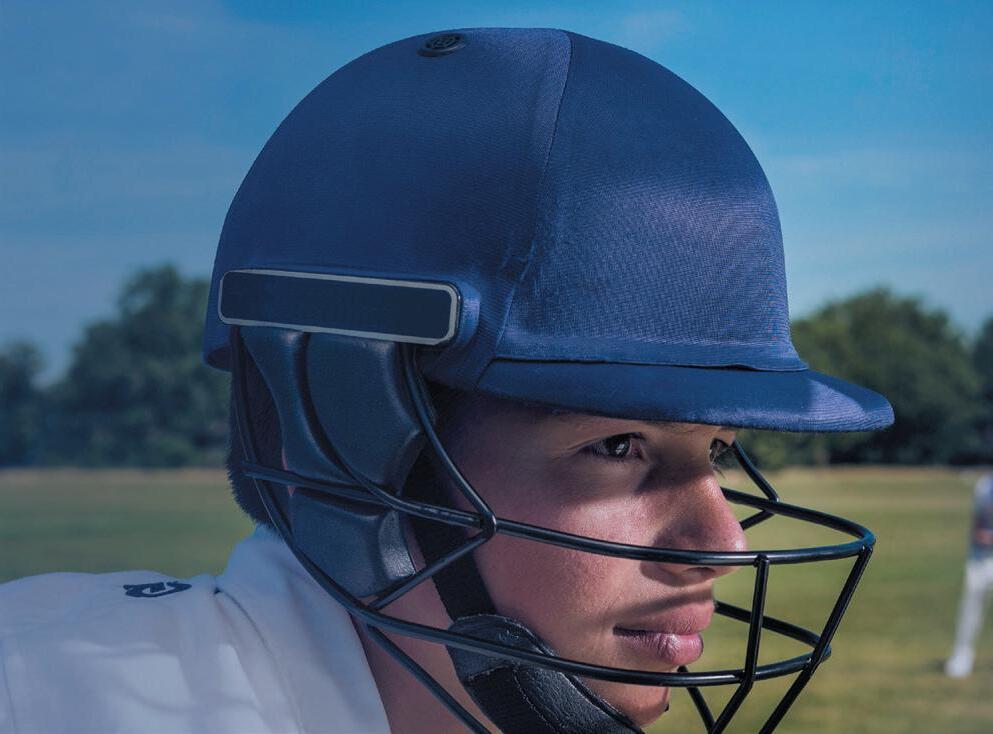
‘Personal challenge with tailored teaching in a nurturing setting’ Good Schools Guide




-


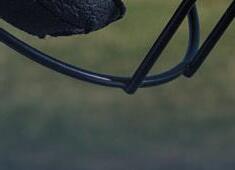

The arts have long been an integral part of British education. From choral singing and drama to music and dance, the arts have the power to engage and inspire students of all ages and they play a vital role in the cultural fabric of the country.
The pandemic underlined the hugely positive impact that the performing arts have on the wellbeing and mental health of young people. I will never forget those first live concerts and productions following the lockdowns. The unbridled sense of joy and accomplishment from our pupils following their inspirational production of Moana was palpable, and only reinforced my strong belief that the arts need to be celebrated and protected within the British education system.

We know that learning an instrument can have a positive e ect on a child’s academic achievement, but it also promotes teamwork, camaraderie, and collaboration. One of my favourite events is our annual house singing competition, which involves every pupil from Year 3-8. Seeing the whole school united in song is truly wonderful.
Participation in Young Voices – an annual series of concerts uniting 5,000-8,000 children each night in arenas around the UK – creates a sense of anticipation like no other event. In a world that can often feel divisive and disconnected, the arts provide a


common ground where individuals can share experiences and connect with one another.
The performing arts also encourage creativity and self-expression. Many pupils arrive at our school with a deep-rooted passion for sport, and all value academic achievement, however, many are hesitant and even downright resistant when encouraged to join an ensemble or production. In my experience, it only requires genuine encouragement and enthusiasm to transform a child’s attitude. When students are given the opportunity to explore something new, it helps them to develop a sense of individuality and self-worth and provides a unique outlet for stress and emotion.
The government’s National Plan for Music Education is an encouraging step towards ensuring schools continue with music provision. However, many agree that there are significant obstacles –including questions surrounding whether current funding is su cient to deliver the
aspirations set out by the plan. Providing a varied programme can often be key to enthusing children – and at Millfield Prep, we are lucky enough to be able to o er pupils access to a host of choirs, orchestras, bands and solo performing opportunities.
For pupils in the surrounding area, we have a newly launched Saturday Morning Music programme. We share our facilities with local primary schools and recently invited several to watch Moana, and soon they’ll be returning to watch this year’s production of Matilda. We also visit local care homes and perform to the residents.
The benefits of the performing arts are immeasurable, and we need to work together to ensure that resources and support are available to all schools. Children deserve the opportunity to unearth a talent and love for music, drama and dance. The positive impact on their development and life experiences is undoubtedly worth the e ort.
The Director of Music at Millfield Prep discusses the life-enhancing and lifelong benefits of developing children's skills and opportunities to play and perform
“In a world that often feels divisive, the arts provide a common ground where we can connect”
ELLY STURGES Director of Music Millfield Prep School









Countless studies point to the benefits of bilingualism, not only to broaden one’s linguistic skills, but also to develop certain brain areas and connections, thereby strengthening cognitive abilities, creativity and productivity. The benefit of acquiring these linguistic skills as early as possible is also generally accepted. Recreating the natural circumstances in which an infant acquires its native language’s oral skills is key to success. Bilingual families know this and will often seek to have their o spring educated at an international school. In cases where a child is born in a monolingual family, school becomes the place to experience an international context first-hand from a very young age.
With this in mind, all French schools in the global AEFE network, which is the French Ministry for European & Foreign A airs’ Agency for French Education abroad (and with 566 schools in 138 countries) apply the same system. This means they teach the French curriculum and the French language, as well as the language and culture of the host country. Beyond bilingualism, these schools’ programmes actually aim for multilingualism, where an additional foreign language becomes compulsory at secondary level. This is achieved through dedicated language classes and other subjects being taught in one language or the other – for instance, historygeography, mathematics, science, sports.
The Lycée Français Charles de Gaulle de Londres – with its four locations in South Kensington, Clapham, Ealing and Fulham –is no exception. From age 3, our pupils are immersed in both languages. This happens

in the classroom with intensive English lessons or a 50/50 programme, or even in informal learning situations such as the playground, the dining hall, extracurricular activities and other peer-to-peer interactions in our community of over 40 nationalities.
Following the Ronjat-Grammont method, where each adult is encouraged to only address pupils in their own native language, the Lycée focuses on having children acquire equal ease of oral comprehension and expression before they leave primary school. Pupils then develop written language skills and leave their school at 18 with excellent proficiency in at least two languages. This enables them to enter the most competitive higher-education courses around the world.

The educational o er at the Lycée caters for all tastes and abilities. Pupils with a strong interest in literature get to enhance their knowledge of English-language written works in the International Section. Pupils wanting to pursue an all-British education in an international environment can prepare and take their GCSEs and A levels in the British Section. Pupils considering multilingualism a priority can learn other
modern languages (Arabic, German, Italian, Russian or Spanish), or opt for ancient Greek or Latin. They can also attend the International French Baccalaureate Section and even graduate with a trilingual qualification in French, English and German. Beyond bilingualism, multi-linguistic proficiency and multicultural backgrounds are key skills for individuals to develop in a globalised world. Started at age 3, the multilingual educational journey of international school pupils leads them to become well-rounded citizens of the world, able to adapt to diverse environments and to communicate e ciently across borders.
“Pupils are immersed in French and English languages within a community welcoming over 40 nationalities”
Cerian Maraviglia of Lycée Français Charles de Gaulle de Londres explains how bilingual learning works at its four schools – and the benefits it bringsCERIAN MARAVIGLIA
Your child’s primary years are fundamental in shaping not just what they become, but who they become.

King Alfred School has over 120 years of experience of designing joyful learning experiences which give each child the space they need to discover and develop their passions, to embrace challenge and reflect on their achievements.


Our creative curriculum inspires children because they do it

through experience, through play, through genuine interest; we nurture an eagerness to know more and encourage greater depth of understanding. We have high expectations for our children and give them the freedom to explore and grow - all within a structure which lets them develop at the pace which is right for them. The results speak for themselves; happy, confident children who love to learn.
Find out more about the school, or book to attend an open event at www.kingalfred.org.uk


Childhood is all too short –and seems to be getting shorter by the day –particularly for girls. The pressure to ‘grow up’ can be overwhelming and leads to anxiety and falling selfconfidence. The accepted wisdom seems to be that because girls mature faster than boys, they won’t benefit from two more years at a prep school. As Head of a prep school that offers both 11+ and 13+ exits, I challenge this view. I think that the starting point should be: what is the best exit for this individual child?
Moving at 11 to become a small fish in a very big pond is daunting for even the most confident pupil – but overwhelming for some – particularly with potentially long commutes, a high-pressured assessment process in Year 6 and (in the world of boarding) an earlier start away from home. While some girls are more than ready for this, there are others who might benefit greatly from an additional two years in a prep-school environment. This is not least because coping with senior school at a younger age may have a longer impact on their overall wellbeing.
If you have the option of a school that has both an 11+ and a 13 entry, my plea is to ask whether a child (regardless of gender) is ready for the transition. And by that, I mean in all senses, not just academic. Are they ready socially? Have they developed confidence in themselves, and do they have the skills needed to navigate what is often a bigger and busier setting? Also ask yourself if they might benefit from more time to hone their skills in a known environment
and develop a greater sense of themselves as a learner, as a friend – and as a school leader.
For some children, those additional two years can be incredibly valuable in terms of attitudes to learning, confidence and maturity. From an academic perspective, this extra two years enables us to offer a curriculum that’s less about exam preparation and technique and more about laying the foundation for future success – at senior school and beyond.

However, it’s the impact on wellbeing and self-confidence that really stands out. By remaining in a known environment, acting as role models to the younger years and holding
more demanding leadership positions and responsibilities, we can support girls to reach their potential. We see a noticeable impact on their self-belief, so that when they move on at the end of Year 8, they are more than ready to tackle senior-school life with gusto.
Many of the parents that I speak to are questioning the pressure of the 11+ on their children, the environment it creates among both pupils and parents and the increasingly selective nature of London day schools. For some, there is also a feeling that this is not what they had envisaged or necessarily wanted for their daughter. However, they often feel there are no other options than to jump on board and hope for the best.
So, my best advice is to pause, take a breath and think about what is best for your own child. For some, two more years of ‘childhood’ in order to develop the maturity and selfbelief to tackle the next stage brimming with confidence may be transformational – that is surely something worth thinking about?
Head“For some girls, two more years of ‘childhood’ in order to develop maturity and self-belief may be transformational”LOUISA
MCCAFFERTY, Broomwood Prep, Girls ABOVE Louisa McCafferty and Broomwood Prep, Girls pupils
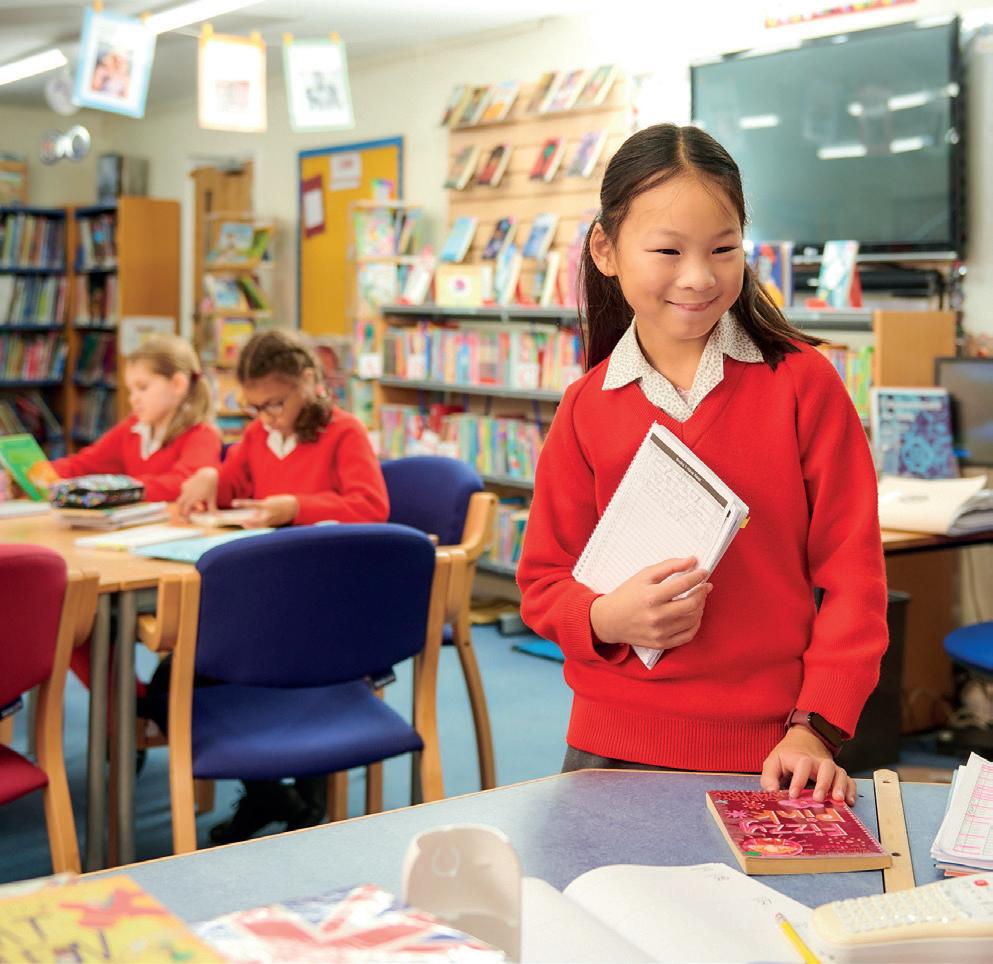



Choosing to educate your child in a boarding school is one of the most important decisions you can make – and often it is a step into the unknown for both you and your child. Helping your child to build a realistic picture of what to expect, and encouraging them to develop their own strategies to deal with the practical, emotional and social aspects of living away from home are key to a happy and successful transition.
Boarding, at its best, is a holistic partnership between child, family and school – so planning ahead to ease the transition is a team e ort. Boarding no longer means staying away from home for weeks on end as there are exeats during term time, opportunities to phone home and family visits to school for events.
Reading through the school’s boarding handbooks well in advance will give your child a good overview of practical information – such as term times, boarding
houses, daytime routines and sta . It will also help them to build positive images ahead of their boarding adventure.
Taster overnight stays are an excellent way to become more familiar with the school and will help them to form a firm idea of what to expect. At Heathfield, the incoming cohort is welcomed to a school sleepover in June where they join with current boarders and get a true taste of the structure of the school day, facilities, extracurricular activities and 24/7 pastoral care.
We also recommend that parents of girls about to start boarding contact each other to arrange sleepovers, play dates or lunches over the summer. This helps to establish bonds (and start friendships) prior to the start of term.


While preparation is key, for many, the start of term is the first prolonged time away from family. Homesickness is natural. It is important to talk about this and help your child to develop strategies to manage these emotions independently, as well as knowing that they can talk with sta who are on hand to help. Mindfulness activities
such as reading, listening to music or simply enjoying their own space can also be helpful.
Homesickness quickly fades with the excitement of engaging in so many co-curricular activities and realising they have a whole new ‘family’. At Heathfield, we appoint ‘big sisters’ – pupils who organise activities with new boarders to encourage friendships in a relaxed way.



Being able to self-regulate and manage their own time and belongings are skills that pupils need in a boarding environment. Help your child by gradually encouraging them to develop a ‘can do’ mindset. Skills to encourage include recognising when it’s time to get ready for bed (and understanding the importance of sleep). Creating their own checklists, packing their own bag for school/days out and understanding why it’s important to engage with those around them are also really useful areas to reinforce and develop. Promote resilience by resisting the temptation to ‘fix’ every problem for your child and, most important of all, remind them that great adventures lie ahead!

“We appoint ‘big sisters’ – pupils who organise activities with new boarders to encourage friendships in a relaxed way”ABOVE Boarding fun at Heathfi eld School
The Headmistress of Heathfield gives her advice for preparing your child for the big boarding school adventure











We all want our children to succeed, but it’s how that success is defined that can make a school stand out.
At Portland Place School teachers see your child’s potential and set it free. The personalised and nurturing educational environment allows children to become inquisitive, creative and open-minded and to achieve a real-life education beyond just exams.
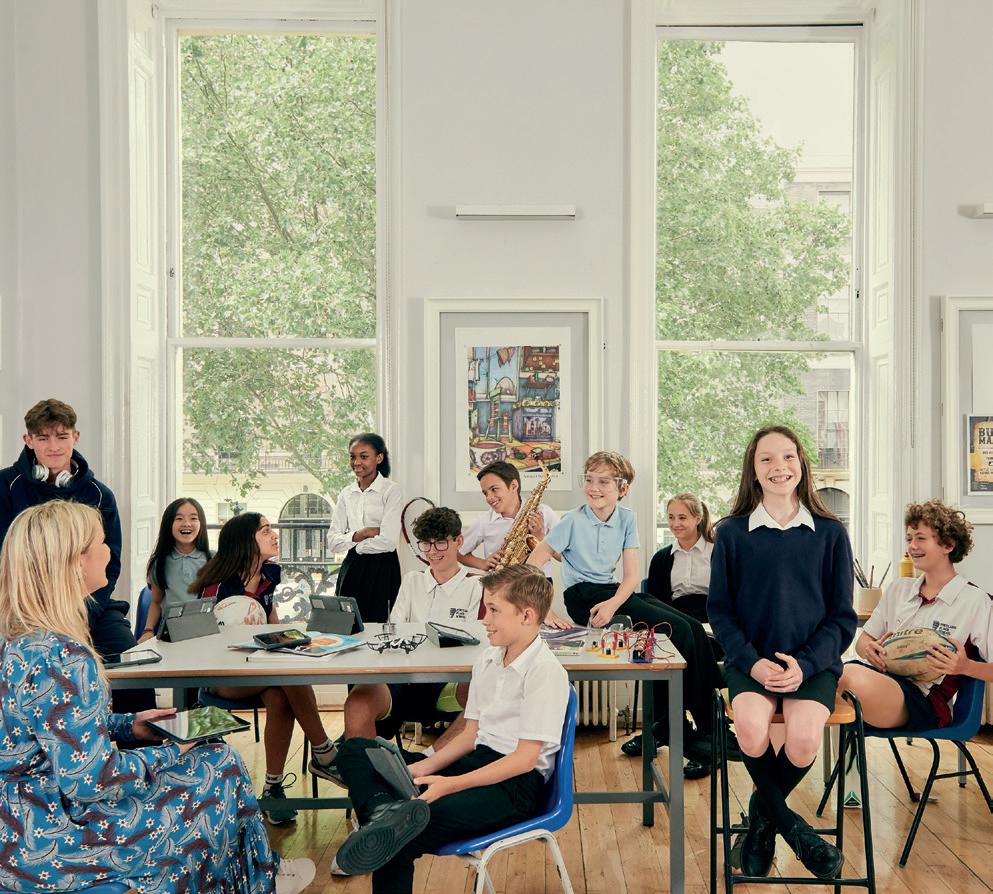
The result? Our students achieve personally, socially and academically.










Find out more about how happiness gets results. www.portland-place.co.uk or admissions@portland-place.co.uk Portland Place School, Regents Park.
LAST PLACES AVAILABLE FOR
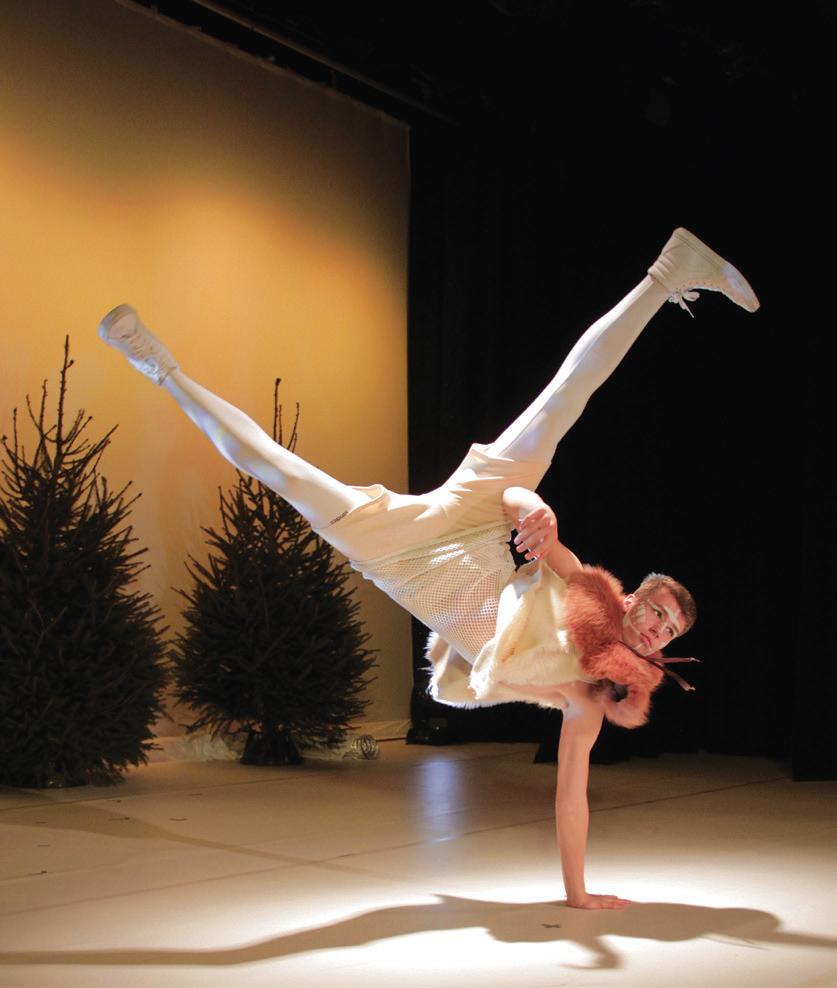
School and community activities are a priority for independents, and activities range from volunteering and to student-led teaching of younger students. Absolutely Education speaks to four schools about the benefits – for all sides
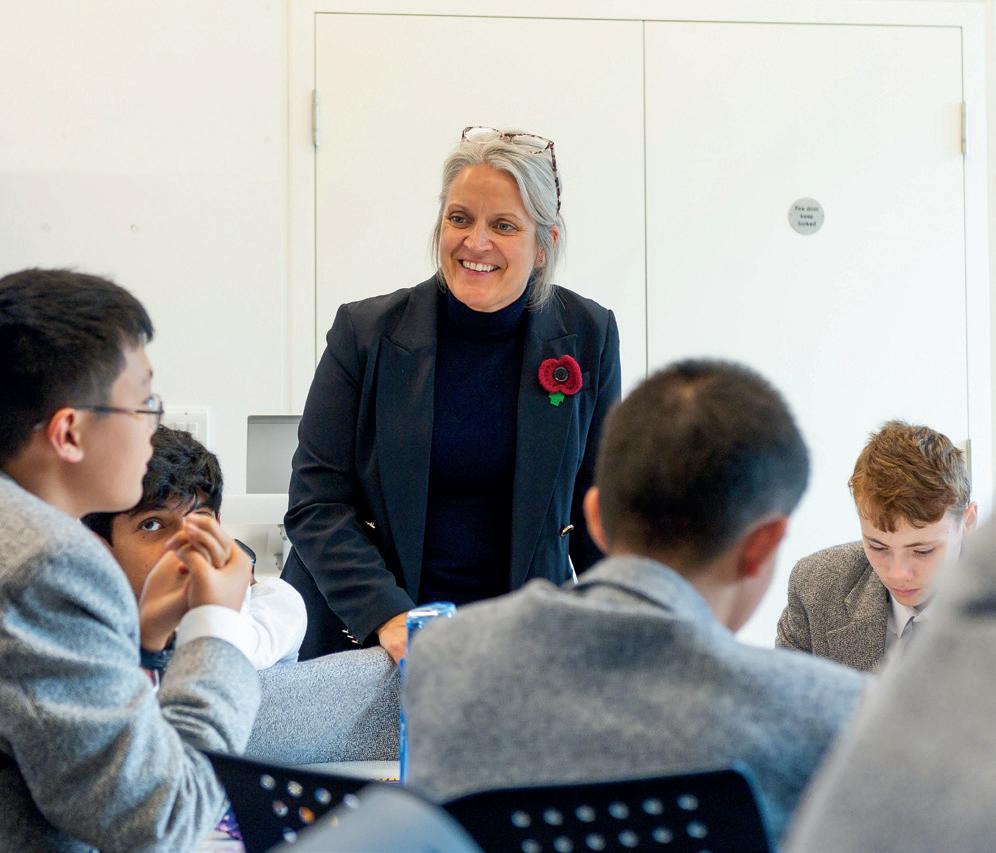
Tonbridge School runs a Learning Mentor Programme, working in partnership with nearby Royal Rise Primary School. This sees 60 primary-age children and 60 Tonbridge Mentors meeting each Monday lunchtime in the school’s Smythe Library for one-toone tutoring sessions in maths, literacy and co-curricular studies. Tonbridge School’s annual Giving Day sees performance poetry workshops for visiting primary schools, driven and delivered by the Learning Strategies teaching team, with the support of the Learning Mentors. Local schoolchildren also join in with an inspiring calendar of activities in the science and sports centres, galleries and chapel.
Tonbridge Head of Learning Strategies Hayley McLintock believes this is a win-win situation. Primary school children benefit from the peer-to-peer learning and personal support. Meanwhile Tonbridge’s Mentors build a range of skills, including social interaction, awareness of neurodiversity and emotional intelligence. What’s more, the planning and organisation involved in teaching others improves their own learning skills and their sense of responsibility. There’s a ‘tiered’ approach to prepare boys for taking on these roles, beginning in their First and Second Years as they learn to offer guidance and support to visiting children. As they move up the school, boys become internal Learning Mentors, offering guidance to Lower School boys. By the time they reach Sixth Form they can become subject specialists,
passing on their knowledge to younger pupils with the same interest. This is a volunteer scheme (running for more than a decade now), and each year around 80 boys give up their time – this includes training as Learning Mentors in lunchbreaks. As they train, they also build their own numeracy, literacy and communication abilities. Hayley McLintock says the boys see it as a mutually beneficial arrangement where, as well as helping others, they build metacognitive skills. Equally important, the Programme widens understanding of other people’s situations and settings. “This is an opportunity for staff, boys and children in multiple settings to forge networks, share experiences and resources and celebrate each other’s successes as and when they come along,” she adds.
Knightsbridge school More House has formed partnerships with two local Catholic state schools, Oratory Primary School and Cardinal Vaughan Memorial School. With Oratory Primary, the partnership was launched with a collaborative Winter Collection of warm items in support of three charities that work with the homeless and refugee communities. More House’s Careers Coordinator also visits Oratory Primary to speak to pupils and give advice on potential future pathways.

Music has been another enriching partnership, with the Music Departments of More House and Cardinal Vaughan bringing school choirs together for inspiring Easter Choral Concerts, which take place each March. Similarly, the two Modern Foreign Languages departments have liaised to offer reciprocal GCSE and A-level lesson observation and moderation support.
More House has recently installed a new Creative Suite – and there are already exciting plans to open it up to Oratory Primary by facilitating a special Lego building competition.
More House Head Faith Hagerty says the school culture is outward facing, adding that pupils get excited by the idea of reaching out beyond the confines of their

“This is an opportunity for children in multiple settings to forge networks, share experiences and resources and celebrate each other’s successes”
OVER 60 NATIONALITIES
ARE REPRESENTED IN OUR STUDENT BODY
EXCELLENT UNIVERSITY PLACEMENT
IN OVER 150 INSTITUTIONS WORLDWIDE
A HOLISTIC AND UNIQUE LEARNING
EXPERIENCE FOR YOUR CHILD
TASIS England offers a world-class education with a global outlook that nurtures future leaders brimming with the potential to positively contribute to the world. Our international community fosters independent, critical thinkers and compassionate, principled learners, ready to accomplish great things. Discover your path at TASIS England.
Our beautiful 46-acre campus in Thorpe, Surrey, is only 45 minutes from central London with a bus service available.
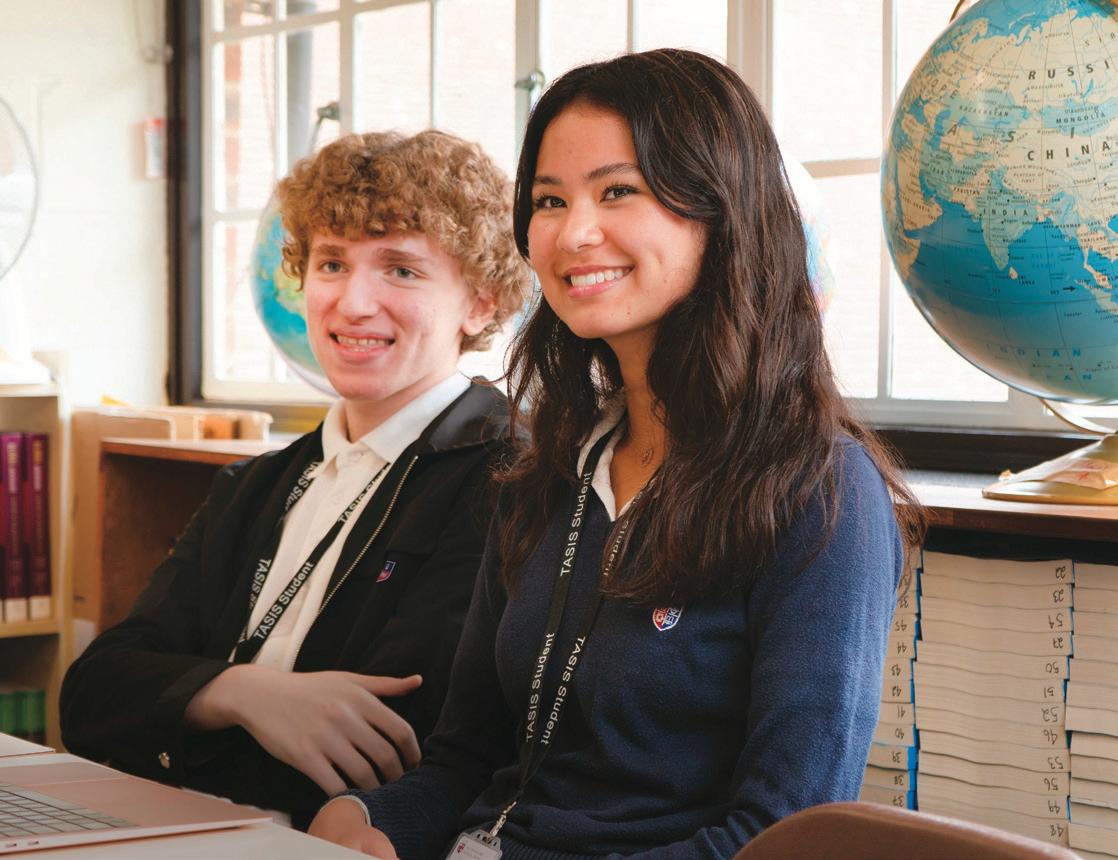 INTERNATIONAL | COEDUCATIONAL | DAY AND BOARDING SCHOOL | AGES 3-18
INTERNATIONAL | COEDUCATIONAL | DAY AND BOARDING SCHOOL | AGES 3-18
own school and see the value in working with people from other walks of life. “They find the experience incredibly enriching.”
Faith Hagerty brought other talents into play last year when the school led on an initiative called Strictly Heads. This was cross sector, bringing 16 schools together in a Strictly-style dance competition between headteachers to raise funds for icandance, a charity delivering dance and movement to young people with disabilities. This school-wide affair included pupil committees launching their own dance-related fundraising initiatives. There was also an Online Youth Seminar with children from each school and young people from the charity.

The Strictly Heads dance event was a huge success, raising well over £12,000. This year sees a similar cross sector initiative – Strictly Headers, with another 16 school leaders competing in a football match in May. This time, schools are working with the charity Play it Forward, which uses football as a vehicle to engage young people in southern Zambia in educational projects.
Primary Ambitions is Emanuel School’s Friday flagship enrichment programme and sees Year 5 and 6 children from 16 partner schools visiting the Battersea school for educational enrichment activities. Led by the Lower Sixth at Emanuel, this Friday-afternoon activity offers 285 pupils a fabulous array of studentled options – from filmmaking and DJing and science and robotics to art and drama.
In fact, Emanuel partners with 32 state primary and secondary schools locally and Lisa Irwin, Head of Community Partnerships & Outreach, says the activities and enrichment are multi-faceted. Ascent is a programme offering academic support for Year 5 children and GCSE boosters. There are fruitful collaborations between Year 6 pupils at Emanuel and partner schools. The school also acts as host for sports tournaments, literary quizzes, performances, cultural opportunities, careers’ fairs, collaborative debating and French clubs.
“We are constantly on the look out for opportunities to share resources and opportunities with our partners,” says Lisa Irwin. All Emanuel pupils benefit from these interactions and for the Lower Sixth pupils who lead Primary Ambitions, the experience is formative – they become role models and teachers. “They develop their leadership, facilitation and teamworking skills. It is wonderful to see them embrace the challenge and grow in confidence through the 20 weeks of the programme.”
Lisa Irwin says that the benefits to pupils include looking outwards, showing empathy and helping others, and they are actively encouraged to make connections
through community service, volunteering, entrepreneurship and fundraising. “Effective partnerships are mutually beneficial. Our goal is to inspire, share and learn with our partners for the collective good.”
Emanuel School is active in borough-wide initiatives. It supported an art project, ‘Place to Call Home’ that included 13 independent and over 50 state schools across the borough. Emanuel is also working with Putney High School in support of its annual crossborough sports extravaganza involving partner primary and secondary schools.

There are other strong links across the wider community. For instance, the school’s mini Astro is shared with Fulham Football Club Foundation and Wayfarers’ Flyerz to coach disability football and hockey. The school provides free weekly swimming lessons for partner schools and meeting facilities for community organisations such as ACEN (African Caribbean Education Network).
“We are very proud of our partnerships programme,” says Stuart Turner, Deputy Head: Co-Curricular, Partnerships and Admissions. “We are ambitious for our pupils in all ways, but we want them to recognise their place within the community and realise the positive impressions they can make on others.”

“Strictly Heads was a whole-school affair, with committees of young people in each school launching their own dance-related fundraising initiatives”
Channing School enjoys enriching partnerships with Highgate Newtown Community Partners (HNCP) and Brookfield Primary School, working together to deliver a whole range of activities. This includes chatting with older guests at monthly community teas, problem-solving sessions organised and taught by Year 12 students for Year 5 and 6 pupils at Brookfield and a Science Club to inspire future boffins. During lockdown, Channing girls also made videos to support Under 5s.
As part of the Highgate school’s Education Plus partnership, there’s an annual summer camp where both fun and education are in the mix. Free places are available for pupils from a number of local primary schools, with a specific focus on those who would not normally have the opportunity to participate in such activities.

The partnership with HNCP has led Channing to reach out to other schools in order to build mutually beneficial and collaborative projects that deliver both academic enrichment and cultural capital. One such exciting development has been through extra-curricular clubs. The Latin Club at the Junior School has been opened up to Brookfield Primary and Yerbury Primary students – leading to fascinating discussions. Debating Club has also had a valuable collaboration with these schools.
Channing Year 10 and 12 students help with reading for the very youngest St. Joseph’s and Brookfield primary pupils at
its breakfast club. Other club collaborations with these schools have included German, iBrick, sports and maths problem solving. Staff at Channing find their pupils really value and benefit from these tutoring and problem-solving partnerships, with students citing development of leadership and communication skills – and their own interest in the subjects they are helping younger pupils with. Pupils have also enjoyed the pleasure of engaging with younger children, getting to know them and seeing them progress in their learning.

Channing also collaborates with other local schools to enhance the spirit of community and deliver learning. For instance,
St. Aloysius College pupils join Channing girls for HE events and clubs, including Medical Discussion, Debating, Robotics, and Latin Channing pupils also enjoy the use of St. Aloysius’ specialist facilities for weekly DT and Cookery club sessions. In the same spirit, Channing opens its facilities to other schools and organisations, free of charge, for around 330 hours a year – all adding to the sense of community spirit and educational openness that can bring people together and improve outcomes across this area of London.

“Pupils have enjoyed the pleasure of engaging with younger children, getting to know them and seeing them progress in their learning”
“You



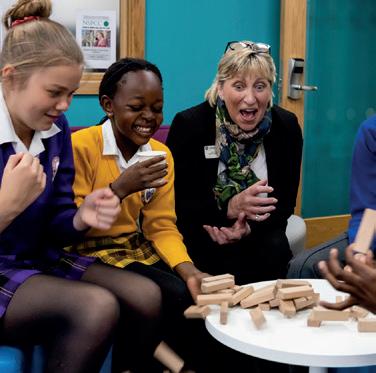
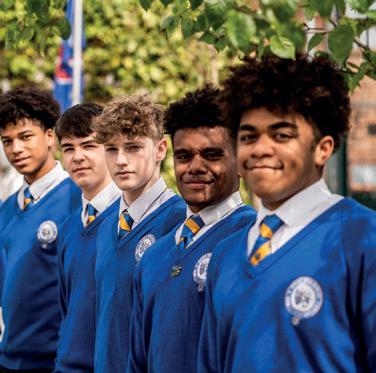
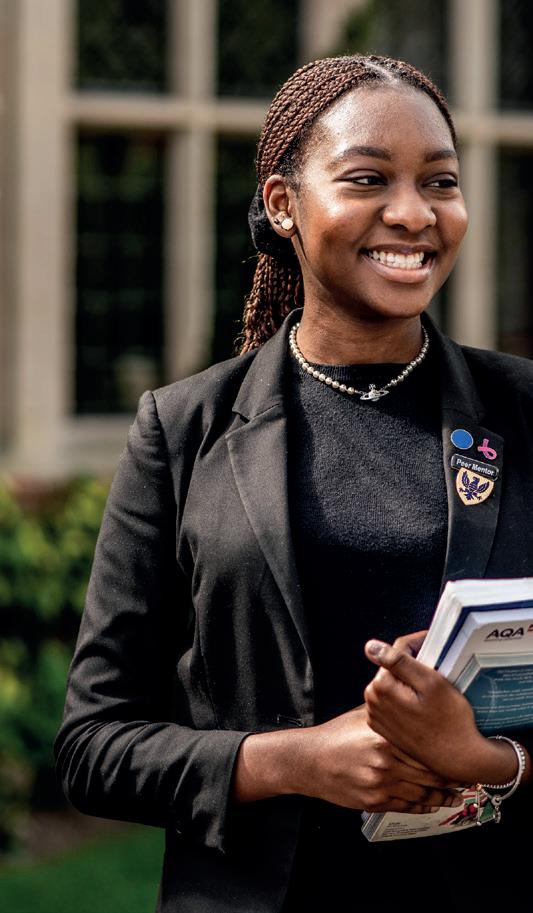
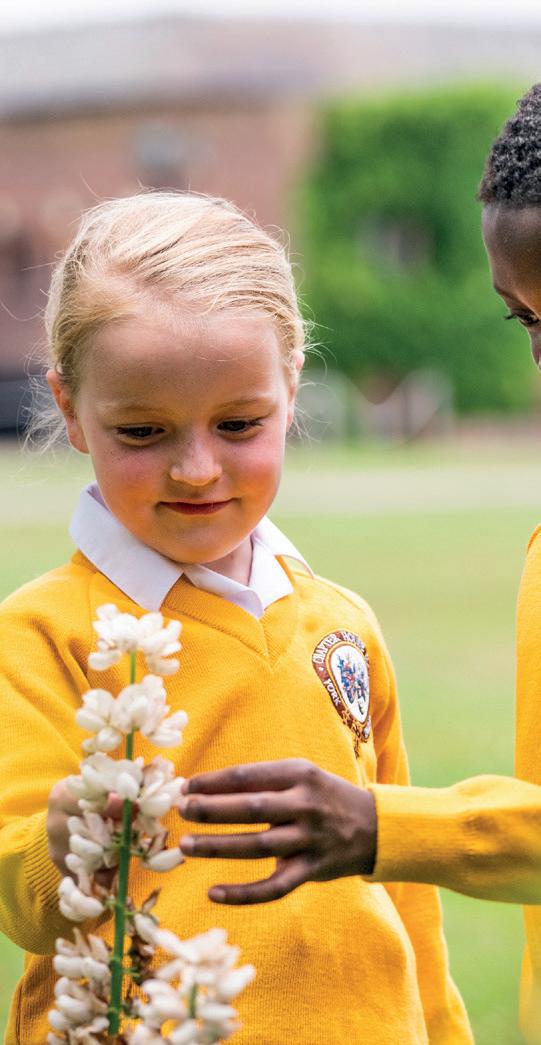







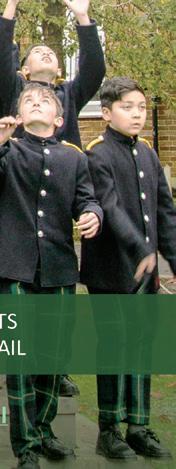


Schools have for decades taught business studies and economics. For longer still they have taught numeracy and financial literacy and have instilled in generations of students the kind of dynamism and chutzpah that traditionally have seemed essential to business, particularly the world of the entrepreneur.
Over the years, competitions such as Young Enterprise have done much to promote the entrepreneurial spirit. Sir Alan Sugar and the glamour of The Apprentice have only served to make entrepreneurial pathways more attractive to young people. This approach to business, however, centres on the bottom line. In a modern, progressive school we should be able to harness this in a way which is more altruistic.
At London Park School Clapham, we want our students to have a real understanding of the world around them and of their place in it, and to have the wherewithal to be positive changemakers. We want the school to be a base camp for inquisitive


minds and to empower leaders for a new world. As such, we have a focus on social entrepreneurship – we want our students to have the skills and real-world understanding to develop, fund and implement solutions to social, cultural and environmental issues. These solutions eventually need to be self-propelling and sustainable, not reliant on the industry of one or two individuals. Students will work hard to develop an understanding of the challenges facing the world and – alongside our academically rigorous curriculum – we run our own courses structured around the UN’s Sustainable Development Goals. Once you have understood an issue and felt that sense of personal agency, the next challenge is to decide what to do to tackle it head on. This is really where social entrepreneurship comes in. Our students will be encouraged to develop innovative solutions to real-world problems and much of what we will do will be centred on encouraging critical thinking and the links between di erent disciplines.
PAUL VANNI Founding Head LondonIn Design Technology, for example, students will look at practical issues faced by people su ering from rheumatoid arthritis. Building on this, and drawing on skills learnt in Mathematics, Computer Science and IT, they will design – and in some cases build – devices to improve the quality of life of others. Students will be given the guidance to take their ideas and make them accessible. Young people will learn financial literacy and digital marketing. They will also learn to work together to formulate plans and develop ideas, turning them into real business outcomes. Support will be given not just by teachers, but also by local professionals who share our sense of community and our desire to be ethical changemakers. These mentors will work with us to deliver student-led ventures, providing invaluable experience of entrepreneurship and of how to run a start-up business. We will provide the space and the platform at London Park School Clapham. Our students will demonstrate their capacity for understanding and empathy, and their ability to make the world a better place.

“We want the school to be a base camp for inquisitive minds and to empower leaders for a new world”ABOVE London Park School Clapham will prioritise real-world learning Park School Clapham









The International Baccalaureate Middle Years Programme (IB MYP) has become one of the most popular programmes worldwide for international schools. Data from IBO.org shows that 1,500 schools are now offering this learning pathway. Marymount International School London was an early adopter of the IB, and we have been offering this to our students for over 40 years. The school adopted IB as it recognises the value it gives, providing each and every student with individualised learning experiences to support both academic and personal growth.
The MYP is a five-year programme covering Grades 6 to 10 (Years 7-11) and, as the name suggests, it forms the middle of the full IB continuum. There is also a Primary Years Programme alongside

the Diploma Programme for students in their final two years of school.
For Marymount London, an independent, Catholic, all-girls school, the MYP supports a broad and balanced approach to the curriculum while supporting our mission statement which empowers young women to be “firm in faith, vibrant in hope, rooted in love and one in service”. The design
ABOVE Pupils at Marymount International School
of the MYP provides a framework from which all schools are able to develop learning programmes relevant to their local and individual context, while meeting internationally recognised standards. This is an inquirybased approach to learning and teaching, supporting students in developing their knowledge, skills and understanding. But it is what it at the core of the programme that provides its real points of difference.
Across all subjects within the MYP, content is contextualised to give meaning, embedding learning in real-world situations to explore concepts and the inter-connected nature of the themes and topics. The approach helps students to connect to content in meaningful ways, offering opportunities to reflect and explore their own experiences and interests and develop a growing sense of self. In practice, this approach broadens each student’s appreciation of the world,
enhancing intercultural understanding, and developing appreciation of their duty as responsible citizens of the world. A STEAM programme creates further opportunities for meaningful links across and beyond subjects, and to engage students with this critical area of study. The development of skills to support selfregulation and lifelong learning runs through the veins of the MYP. Across all subject groups, skills of ‘learning how to learn’ are integrated into teaching and learning, focusing on a wide range of key skills, including critical thinking, effective research, evaluation, self-management and communication. These skills support students in enhancing their potential. They learn about taking reasonable risks, discover their learning preferences and develop and reflect upon their own personal identity.
Throughout the programme all students take an active role in the provision of service to others, in both organised and self-initiated ways, with each activity measured against meaningful and engaging outcomes. As students approach the final year, they undertake a substantial independent piece of work which demonstrates the skills and abilities they have developed during the programme.
As well as enabling Marymount International School London students to move on successfully to the IB Diploma, the MYP builds confidence and independence of thought. This, in turn, helps them to find their place in what is becoming an increasingly complex and challenging world.
Mark Gardner, MYP Co-ordinator at Marymount International School, explains how the IB’s Middle Years Programme benefits students’ learning and growth
“The development of skills to support self-regulation and nurture characteristics of a lifelong learner run through the veins of the MYP”
Did you know your child does not need to speak French to join our school?
For over one hundred years, we have been at the forefront of international education Nurturing skills and inspiring ideas.
Fostering confidence, solidarity and ambition. Helping pupils to develop into accomplished world citizens. Together, we will explore your child’s talents and widen their horizons

South Kensington
South Kensington Primary School Nursery to Year 6
Collège-Lycée (Year 7-13) and British Section (Year 10-13)
French, Bilingual & British curricula
Ealing
André Malraux Primary School
Nursery to Year 6
Fulham
Marie d’Orliac Primary School
Nursery to Year 6
Clapham
Ecole primaire de Wix
Reception to Year 6
www.lyceefrancais.org.uk
Sitting at the core of the IB Diploma Programme, CAS (Creativity, Activity, Service) is the counterbalance to a demanding course of study. It guides students by helping them to avoid focusing solely on grades, encouraging them to maintain a healthy life balance.

The students here at Southbank International are incredibly imaginative and creative, and with strong social consciences. They’re ambitious when it comes to choosing how they can get involved in all of the CAS strands, including how to give back through service. After the restrictions of recent years, it is great to see a revival of connections with the local area, and the authentic and positive impact of our students’ work.
We aim to centre CAS service around what is going on in the world currently. On a local level, we have found ways to support the homeless – important to us as an innercity school in London. Recently, students fundraised for St Mungo’s and Centrepoint. The latter charity specifically caters for


young people on the streets (something that particularly resonated with our students).
Our students have volunteered in nearby soup kitchens and charity stores, and learnt how to cook healthy and transportable meals, delivering them to unhoused people in the local area. They have worked in community gardens, collected rubbish around Regent’s Park and organised clothes and coat drives. They have also spent time at The Children’s Book Project, sorting and sending o books.
In a recent CAS workshop on the cost-of-living crisis, I collaborated with an economics teacher who helped students to understand inflation. In the follow-up session, we noted the increased impact of rising inflation. Students decided they were able to take action themselves through the service element of advocacy by writing letters and marketing via their own social media channels. This meant, for instance, they could lend their support to nurses on strike. As a group, we also identified The Trussell Trust and FoodCycle as valuable organisations to work with to help make a di erence for those a ected by food poverty in the area.
My colleagues and I see time and time again just how beneficial the service strand of CAS is for our students at Southbank. It helps them to develop relationships, both at school and within the wider community.
CAS encourages them to understand the challenges and needs of others, and to feel good about helping – even in small


ways. It is part of the ethos of the school to develop that social conscience and to trigger connection and purpose.
Many of our students are international, and some are very recent arrivals in London. By connecting them with the local community in the very meaningful ways that CAS o ers, we can also help them familiarise themselves with their city by making a positive impact – and feel a sense of belonging.
Through the CAS programme we want to plant seeds of interests, passions, habits and routines that might continue for many years after our students graduate, so that as they grow and enter the world of work, they can carry these forward.

“CAS encourages our students to understand the challenges and needs of others, and to feel good about helping – even in small ways”
Southbank International’s Louise Carey on how the IB programme’s ‘Creativity, Activity, Service’ principles help young people develop as citizens
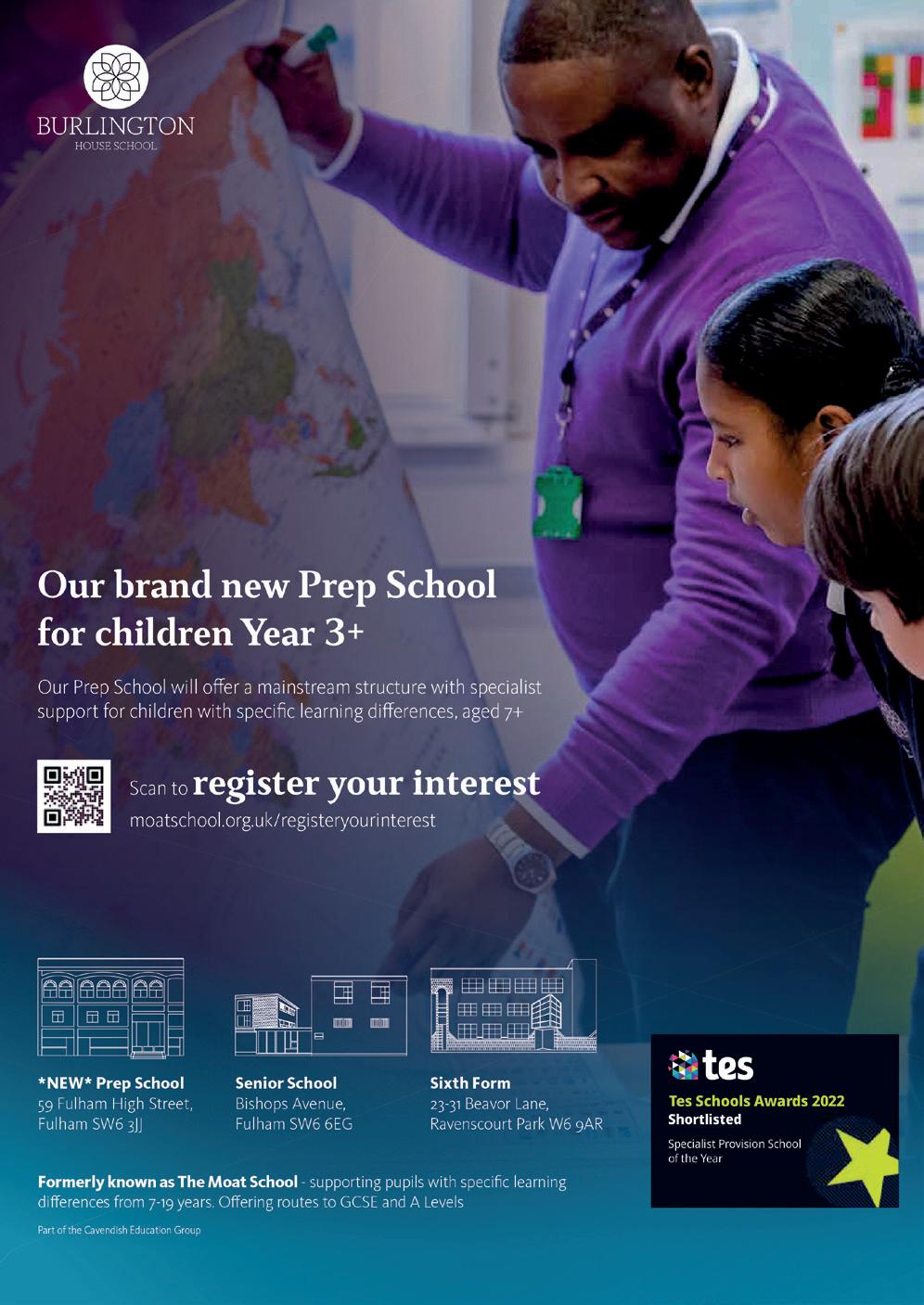

Digital citizenship is about the appropriate use of technologies and can be divided into three broad categories – respect, educate, and protect. At TASIS England, we focus first on the proper, respectful, and lawful use of technology. People tend to communicate very differently in person than they do with technology. It is, therefore, important to educate students to understand that virtual and real are two different things. I do believe that from the day a child steps into an educational institution, that is the first thing they should be taught. This is knowledge that will be with them forever and will influence how they engage with others through technology.
We teach Digital Citizenship in all grade levels through Personal, Social, Health and Economic Education (PSHEE). In addition, our Lower and Middle Schools introduce these principles through the Library Program. We start in Lower School by introducing students to some technical terms and methodology. Throughout Middle and Upper School, students are given information that is appropriate for each age group.
Technology is ubiquitous, encompassing everything that we do and – in some way –dictating how we live our lives. Whether it is online banking, making an appointment or simply saying hello to a friend or relative on the other side of the world, technology plays a big role in securing these connections. Our students live in this digital age, so we need to help them grow positively and responsibly
as they learn to interact with technology.
As an example of this, by the time children are 13 years old, social media has become their main source of information, usually via their phones. What they often don’t understand is that, when accessing news and information this way, algorithms influence content.
Generally speaking, young people do not watch television news and, while network news stations are regulated by various governing bodies, there is no such thing in social media at present. The lack of regulation, together with the algorithms, means that the news received by young people is unlikely to be a holistic overview. Education is important here to help students understand how algorithms work and encourage them to gather information from multiple sources.
Social media remains the technology of choice for teenagers and young adults. Putting aside for one moment the frequent cases of cyberbullying, sexting, and inappropriate comments on these platforms, we need to focus on the polarisation caused by the overuse of technology. Studies have shown that virtual interaction among teenagers is now greater than physical
interaction. Factoring in online gaming and chat platforms like Snapchat, WhatsApp, and others, it is apparent that today’s teenagers communicate more with family and friends online than in person.
For these reasons, teaching Digital Citizenship in schools from a very young age is crucial. It is our responsibility to help young people learn to discern the difference between what is real and what is virtual, discover how information can be manipulated and strike the right balance between social and virtual interaction. By getting this balance right early on, we will see less cyberbullying and more appropriate uses of these technologies..
ARCAY E-Safety Coordinator TASIS England
“Our students live in this digital age, so we need to help them grow positively and responsibly as they learn to interact with technology”
TASIS England’s John Arcay on how digital citizenship teaching can ensure young people have positive interactions in the virtual world
JOHN
Scholarships

Academic Music
Achieve the exceptional at Cambridge’s leading co-educational boarding and day school for ages 11-18

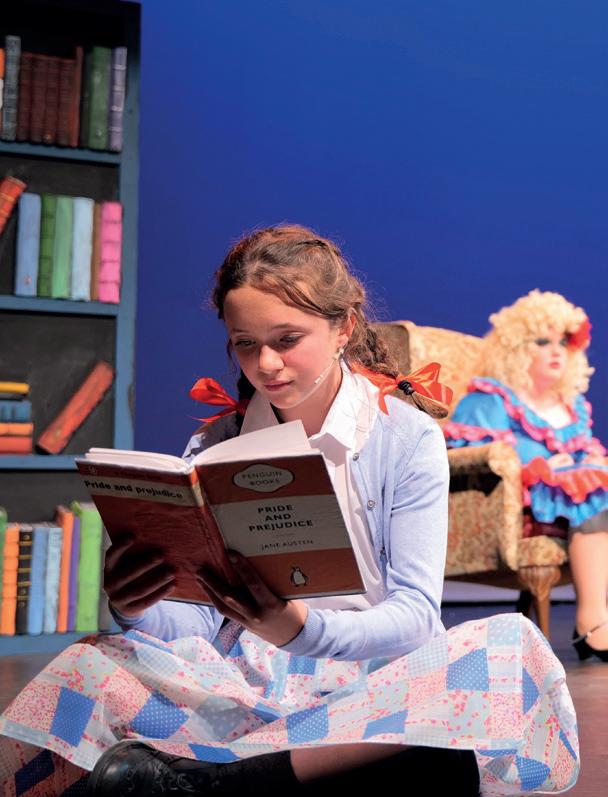
Choral
Sport
Art
STEM
Drama
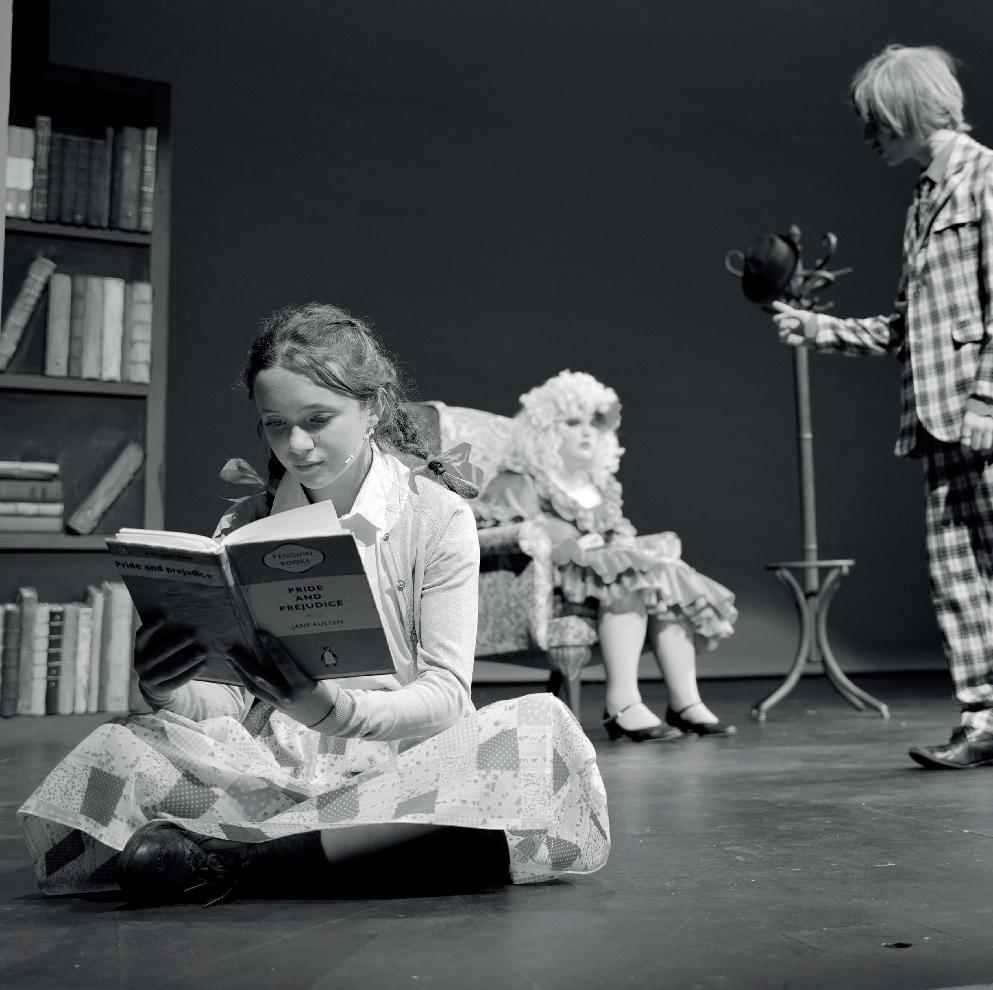
Open days are essential when it comes to choosing the right school for your child. They are an opportunity to look beyond the gloss of prospectus and website and the dry inspection report.


At Pangbourne College, we recommend you attend any open-day event with an open mind. You may have already formed an opinion from friends, but try to set it aside. Every child is di erent and you are seeking the school that best fits your needs, not someone else’s. Our key tips are:
Attend as a family It is particularly important that you and your child attend, if possible, as each person will notice di erent things and have a di erent set of criteria.
Have a list of questions You will usually have the opportunity to speak with current pupils to get insights into what life is like at the school. Ask them about their routines, experiences and aspirations. If current parents are on-hand too, so much the better.
Take the tour This is important for getting a sense of the life of the school. On some open mornings you may be able to select how you
tour the school – self-guided or pupil-led. There are advantages to both. A pupil-led tour would give you that perfect opportunity to ask lots of questions, but you may be restricted to a route the pupil takes you on. If you are on a self-guided tour, you will have the freedom to explore at your own pace. This also allows more focused time in the departments that are of most interest to you and your child.
Create a wish list What are you looking for in a school? Consider giving each priority a ranking so that you can easily compare schools before and after your visits. Criteria might include standard of sports facilities, quality of pastoral care and range of co-curricular activities.
Attend the Head’s presentation The Head is the figurehead of the school and should clearly represent its ethos and culture. Ask yourself if their perspective aligns with your own values and aspirations? Culture is also a broader question to consider when you speak to other sta , parents and pupils.
Look beyond academics We all know that academic results are important when choosing a school, but it’s also important to look outside the classroom and consider the wider o ering. Questions you might like to ask are: How do you promote personal development? How do you support mental wellbeing? How do you prepare young adults for life beyond education?
Be mindful that open events are there to impress potential parents and pupils. If you like the look of the school, it is a good idea to arrange a follow-up visit during a ‘normal’ school day. This will give you a truer sense of the day-to-day environment and atmosphere – reassuring you that the open event you attended has been a true reflection of the school.
SAMANTHA GREENWOOD Senior Deputy Head Pangbourne College

“It is a good idea to arrange a followup visit during a ‘normal’ school day”
Debating teaches skills of arguing your point, thinking on your feet and listening carefully to the other side. We speak to three schools where great debates are nurtured


“We discuss the importance of always engaging with the ‘other side’ so that opinions are not formed in an echo chamber”
How do we teach the skills required for civilised argument in a landscape of social media ‘pile ons’, ‘groupthink’ and, arguably, lack of proper conduct in many areas of public life. One answer is debating.. There is, perhaps, a modern tendency to see formal debates as ‘old school’, but that is to misunderstand their point. Being asked to debate an opinion other than your own, preparing an argument in a short time, listening to other people and using reason to counter their points – these are all invaluable skills in all sorts of settings. We find out how debating works at three schools that take it seriously and carry home prizes.
At The Leys School in Cambridge, debating takes place each Thursday lunchtime in the Great Hall. “It is open to all year groups – Year 7-13 – and it is a popular activity,” says Head of English Anna Garrett. “Each
week we typically have 80-100 pupils in attendance. In the Spring Term we run the House Competition between 11 houses. These debates are always very well attended, and the final is held in a Monday assembly.”
Debating takes place within other forums in the school, including English and History lessons. “Oracy is an important skill to develop, and less formal debates can enable pupils’ skills in listening and engaging with the thoughts and beliefs of others,” says Anna Garratt. “Developing these skills in the context of speaking and listening also has an impact on pupils’ writing and ability to maintain a critical line of enquiry.”
They may be young, but pupils at The Leys have a good understanding of the principles around debates – including hearing what others say. “We frequently discuss the importance and merit of always engaging with the ‘other side’ of an argument so that opinions about the wider world are not formed in an echo chamber,” says Anna Garratt. “It is important that pupils learn how to engage with controversy in a way that isn’t reactive but creates a space to
challenge the potentially problematic.”
Robert Francis, Teacher of History at The Leys says there is wider value in debating. “Having to present an argument out loud and communicate its meaning makes you think much harder about pace, tone and clear structure than if you are simply writing an essay or an article,” he says. “We believe it actually makes you a much better writer and thinker.”
Another important value is in amassing your thoughts, and your argument, quickly and accurately. As to the formalities, Robert Francis believes they are useful in helping build advocacy skills. “The slightly formal structure of debates teaches you to respect other people’s opinions whilst, at the same time, giving you the ability to advocate effectively for your own view.”
The Leys has had notable successes in competitions. Pupils are invited to participate in the Rotary Youth Speaks competition, which takes place each autumn, and in 2022 an all-female team from the school won the final regional round with a debate on whether the concept of marriage is outdated.
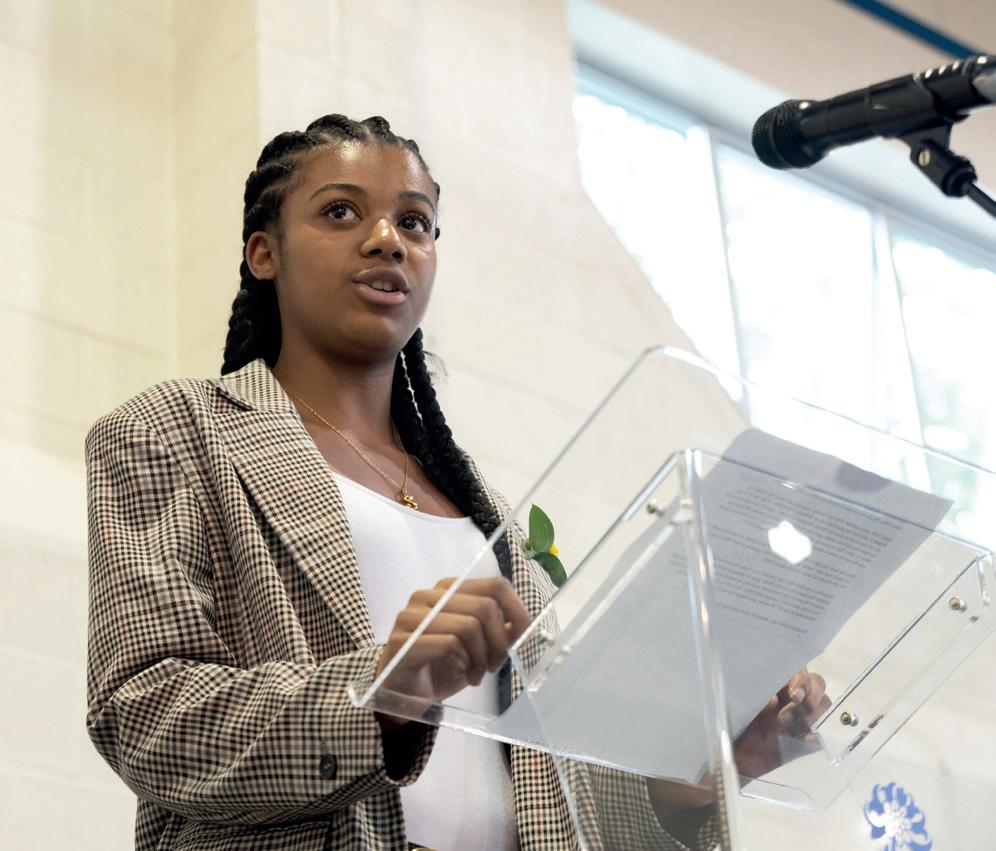




Sydenham High School GDST uses the British Parliamentary (BP) format for debating competitions, and in class or group settings less formal structures are brought into play. Fun class activities include ‘debating tennis’, in which you debate back and forth, each time disagreeing with your opponent’s points. There’s also ‘argument tunnel’, where pupils stand either side of a line depending on their opinion then attempt to persuade each other to switch sides. Silent debating helps generate reasoned arguments on paper among pupils who are less confident about speaking up.
Sydenham teachers find that pupils have the maturity to understand that in debating both sides are arguing a case rather than their own opinion. Getting younger pupils involved with ‘unarguable’ motions, such as: ‘this house believes that five-year-olds should be allowed to drive’ teach debating principles. The school’s SYDx and One Voice programmes provide pupils with the chance to refine presentation skills, putting forward arguments in a different way to traditional debating but developing a
similar skillset. The school fields pupils for a variety of public speaking competitions, such as the Chrystall Carter Prize.
Sydenham High School participates in the ESU Schools MACE and has started a House Debating Competition this year. Pupils in Years 10 and 12 also participate in the Independent Schools Mock Trials. For this, they are tasked to practise the law as barristers, jurors, ushers and clerks – all under the watchful supervision of real judges. The school participated for the first time in 2022 and won the regional finals in 2022 and also this year.
Years 5 and 6 explore topics through debating workshops. The children form their arguments as a proposition or opposition and learn the importance of research, rebuttal, reasoning, and persuasive speaking skills.
Sydenham High School finds that debating prepares children to take on many challenges and has a positive impact that spills over into academic work, also greatly enhancing listening skills. Just as importantly, it builds confidence with oral communication and agility of thought – being able to adapt and change things on the fly if the speech isn’t going as intended and listening and reacting to others’ points and comments.
At Wellington College, Berkshire, young people rise to the challenge of debating with gusto. The school debate club meets every Tuesday and expert coaches come in to assist with learning the ropes. “Basically, we treat it as the equivalent of a competitive sport and they get competitive coaching,” says Teacher of History Chloe Whitelaw.

The school generally uses the BP debating system – Chloe Whitelaw believes this is among the most challenging debate formats. “They have 15 minutes to prepare, and they are not allowed to look up any information,” she says. Wellington College teams carried home the ESU Mace in 2018 and 2021 and got through to the second round this year. Students have also competed in the Oxford and Cambridge schools’ debating competitions with notable recent successes.

Debating activities spill over into other areas and have a positive impact in the classroom. Harkness boardroomstyle discussions are used a lot, and the principle of open discussion – using add, link and challenge – is definitely assisted by experience in formal debating. It also helps in other classroom forums. “If you just argue your perspective it becomes like the echo chamber,” adds Chloe Whitelaw. She points to the value in understanding the other side and being open-minded.
As organiser of the debate club, Chloe Whitelaw has asked pupils for their perspectives on what it brings. “So many of them have said ‘it’s really improved my confidence in myself, my ability to think on the spot’. They also say it’s improved their essay writing and their ability to formulate their arguments.”
This, of course, extends beyond school – thinking on the spot is a very useful skill in any interview situation. “Last year our entire senior debating team got offers from Oxbridge. I’m not saying it’s causation – it’s just interesting – it has certainly helped us with club recruitment!” says Chloe Whitelaw.
She sees the value of debating for all pupils, however academic on paper, in building a skillset that develops memory, general knowledge and logical argument. Whether it’s engaging in lively discussions round the dinner table or arguing your point in a board meeting, knowing how to reason – and also listen very carefully to the other side – is a useful accomplishment for both life and future careers.
“We treat debating as the equivalent of a competitive sport and pupils get competitive coaching”

Wells Cathedral School is a co-educational day and boarding school based in the vibrant City of Wells surrounded by Somerset countryside. DirecttrainstoLondonfromnearbystationsofBath,BristolandCastleCary


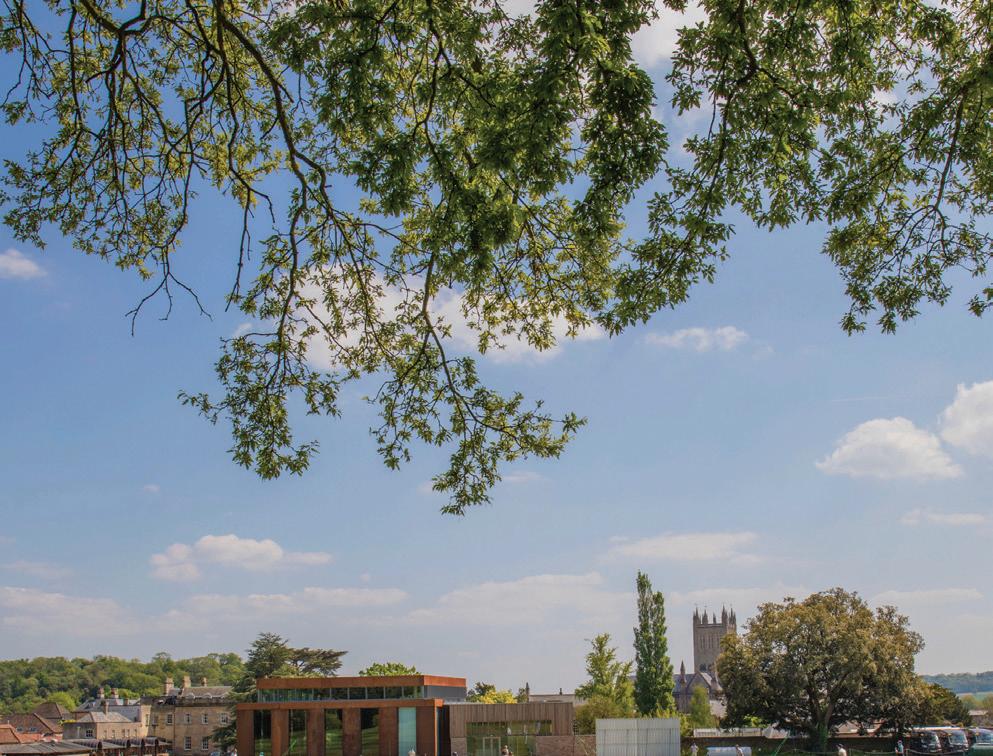
Nursery - Pre-Prep - Prep - Senior - Sixth Form
Book a visit: https://wells.cathedral.school/relocating admissions@wells.cathedral.school





Maths is the most popular A-level subject at Downe House, in line with the national trend, with 30% of our Sixth Formers currently studying it (and 17% of them study further maths, too). I spoke recently to our Head of Maths Rob Barnes about this and he told me: “A-level mathematics is a good deal more challenging than GCSE. A good grade in maths at GCSE does not necessarily translate into one at A level. So, the reality is that it isn’t an ideal choice for many pupils.”
Rishi Sunak’s recent comments around pupils studying maths through school appear to have been influenced by the conclusions of the recent Times Education Commission. Head of Ofsted Amanda Spielman backed this idea, also pointing out that the UK is unusual in not insisting that both maths and home languages are studied until 18. Yet Mr Sunak’s statement lacked specifics. He simply said that

leaving school without basic numeracy skills was “letting children down”.

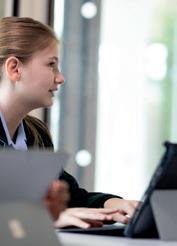



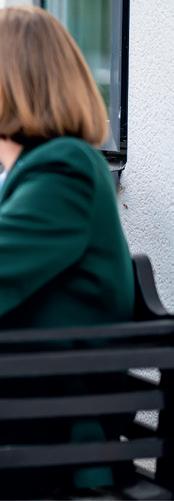
My view is more in line with the former education minister of Finland Olli-Pekka Heinonen. Finland, of course, is often hailed as having a world-class school curriculum. While Heinonen emphasises the need for maths skills, he also highlights that the modern world requires independent learners and imaginative problem solvers. If we continue to allow our pupils to build on their key strengths, they will be better placed to develop focused independence and self-confidence.
In fact, the current trend across all UK schools is for pupils to choose STEM subjects over humanities. In 2022, the four most popular A-level subjects (in 1-4 order) were mathematics, psychology, biology and chemistry. In truth, AI and computerisation are making maths skills less critical to many roles – especially accountancy, architecture, engineering, and computing.

So a resurgence of the humanities may be more likely in the coming years, particularly as the core skills involved – independence of thought, communication and imagination – are becoming more valuable.


English, chemistry and economics are our next most popular A levels and the latter two subjects include considerable mathematical content. Many other A-level subjects require some maths, too, so pupils are furthering their numeracy skills post 16 using a variety of routes. We are constantly looking for new ways for our pupils to widen their skillset. Our Learning for Life programme includes practical numeracy, such as personal finance and managing domestic expenses. Many of our Sixth Formers have opted to complete our school’s mini-MBA, which requires them to consider various aspects of financial planning, tax, economics and accounting.
Co-curricular, social and cultural activities are also another area where schools continue to ensure young people progress their numeracy skills in the real world. Whether planning a charity auction or organising a house event, pupils gain practical insight into areas like budgets and fundraising. Perhaps even more importantly, taking numeracy outside of maths lessons and applying it to social scenarios provides the time, scope and environment for pupils to develop fully as individuals, and to learn to work with and get along with others – surely the key ingredients to succeeding in our brave new world?
“If pupils focus on their key strengths they will be better placed to develop independence and self-confidence”
The Deputy Head of Downe House considers the PM’s maths-to-18 plan and concludes studying to your strengths is smarterMATTHEW GODFREY Deputy Head Downe House School
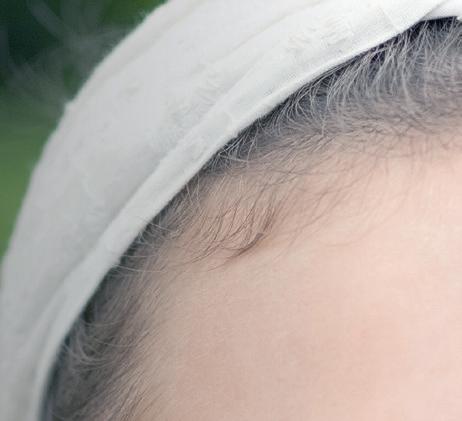

Explore a different approach to academic excellence for children aged 3–18 years. One that unearths talents, celebrates individuality and helps students go on to the best universities in the world.
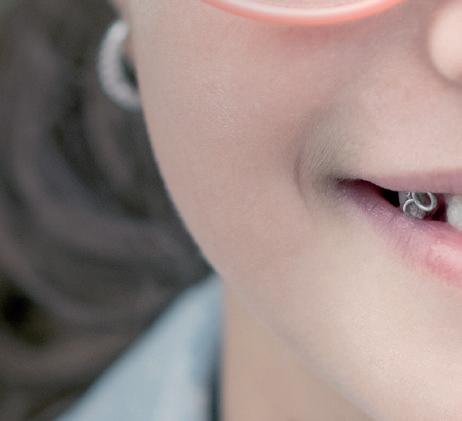
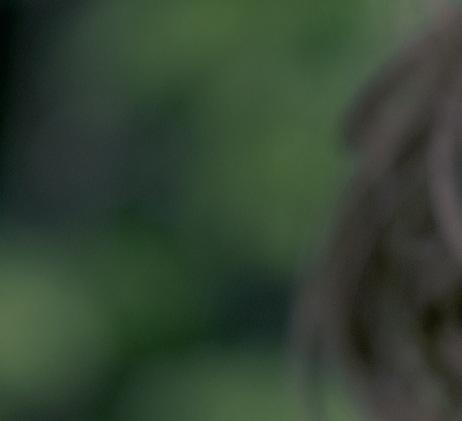

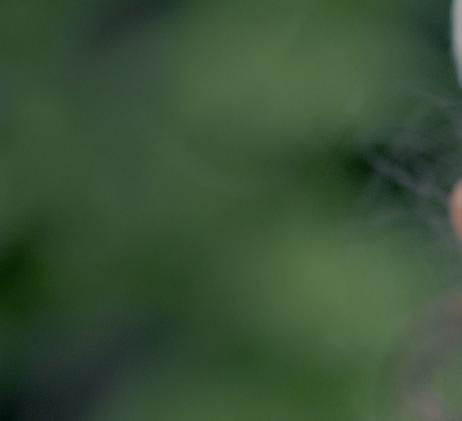
Places for 2023 entry are strictly limited. Apply now at southbank.org

Exam results may gain that place at university or a job interview, but increasingly employers are looking for the added extras – the participation in a sports team, dramatic arts or Duke of Edinburgh’s Award – to separate one candidate from another.
At Gordon’s, a non-selective state boarding school in Surrey, we have long believed in a holistic approach to education. This means long days – day students do their prep and have supper at school along with their boarding peers – and a rigorous academic timetable. But there is also a strong focus on co-curricular extras. Every student has the opportunity of playing a sport at least once a day or indulging in one of the 50 plus activities on o er, ranging from the Arts to board games.
Many students choose to join the Combined Cadet Force (CCF) in the Army, Navy or Air Force and the school also boasts a higher-than-average number embarking on the Duke of Edinburgh (DofE) Award Scheme, with over 100 signed up for the Bronze Award this year alone. There are many extras acquired on the games field, trekking as part of a DofE Award

or getting involved in a school orchestra. There is no doubt that performing as part of a team, leadership, problem-solving, confidence and perseverance are among the key skills – and will sustain young people through not just their career but life.

Further life skills can be gained by seizing opportunities for public speaking and debating through mediums such as MUN (Model United Nations), Young Enterprise and public speaking competitions. All help to develop a student’s critical thinking skills and teach e ective communication, independent research and teamwork. Students at Gordon’s also have the chance to study for an Institute of Leadership and Management (ILM) industry-recognised qualification, which not only aids them in leadership roles at school but also in the working world.
Every student belongs to a House and competitions between Houses – from

debating to dancing –are enjoyed and fiercely contested. The inter-house competitions allow every student the opportunity to play representative sport at school and promote the ‘have a go’ attitude we champion. Similarly, all students can play a part in the school’s numerous stage productions, whether acting, singing, dancing or behind the scenes directing or taking responsibility for costumes or sound.
Co-curricular activities and opportunities to develop skills outside the curriculum are vital for student wellbeing, but also instrumental in developing transferrable skills. There is no doubt they strengthen a student’s employability and their applications for the post-18 journey. Importantly, they also give them stories to tell in job interviews. Sport, DofE, CCF or performing on a stage takes students out of their comfort zone. They discover new skills and become more confident through taking part, as they learn more about leadership qualities and the value of endurance, teamwork and problem-solving. All of these skills all necessary qualities for their working life.
The Head of Sixth Form and Careers at Gordon’s School discusses the importance of gaining extra skills and experiences for wellbeing and onward careers
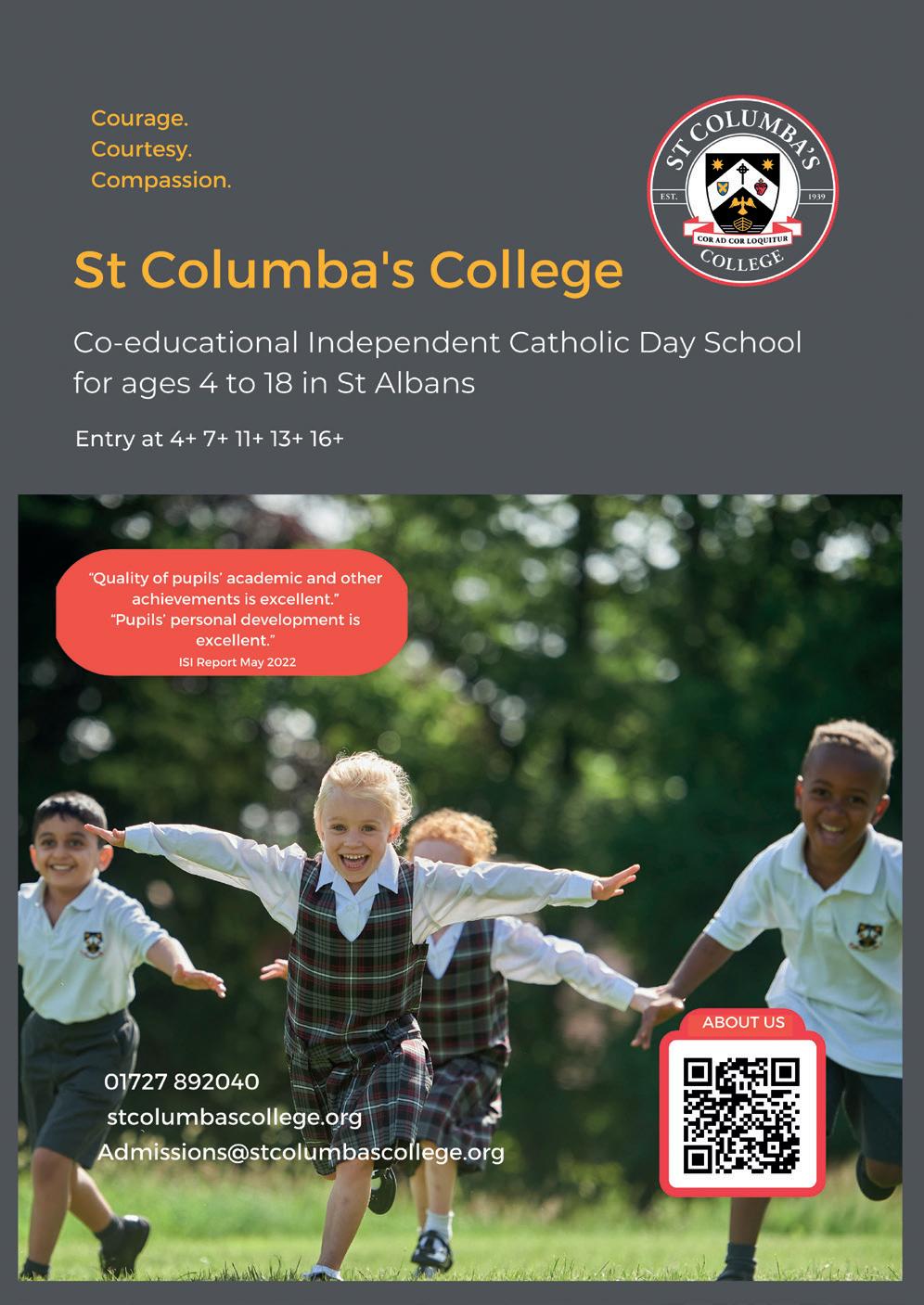
One only has to look at social-media platforms to see the best, and worst, discussions about almost any subject under the sun. A prominent aspect of the communications’ landscape today is the stark polarisation of position that contributors take. Having contributed, from time to time, to the ‘reader discussion’ sections of various articles in a certain online newspaper I subscribe to, I have often been taken aback by replies to posts which I believed quite reasonable. I should have expected any view expressed on Brexit to be met with a binary mindset but, I must admit, I was surprised that discussion of the tactics employed by the manager of Swansea City would elicit quite the same sort of response.


Of course, this is the world that our sta , parents and guardians and, most importantly,

our pupils find themselves part of. It is often anonymous, very often polarised and, to a large degree, unregulated in content. However, in a school setting, we have a great opportunity to fashion the way our young people think about these interactions. We can encourage dialogue (listening to others and seeking an element of consensus) rather than discussion, which often involves defending pre-conceived arguments come what may.
The best way of encouraging dialogue is, of course, to harness our collective ‘pupil voice’ by involving the young people in our care in defining and delivering the messages we think are important within
our respective school communities. There are many ways of doing this, from school councils to committees focusing on the environment or EDI, to peer mentoring, to pupils even attending sta or governors’ committees. These are underpinned by the operational tools: apps such as ‘tootoot’ (where pupils can anonymously report concerns), bullying surveys, wellbeing questionnaires, and so on. All of these, and many other strands, are woven together and enable schools to harness pupil voice to benefit the whole community. Arguably the key element in the democratisation of pupil voice is to put the onus on the pupils to set the agenda. Providing a framework for dialogue is essential but, as important, is then to enable pupils to shape the programme and be the ones to action the decisions.
Reed’s is all boys until 16 but co-educational in the Sixth Form. After covid, some of our pupils expressed the view that there could be improvements to the Sixth Form induction process to make the transition smoother for both the boys and the girls.


We asked the pupils what they felt could be changed. It was agreed to take the year group o timetable for a day and to facilitate a workshop to discuss some of the challenges that might arise and opportunities to avoid them.
The Sixth Form leadership team helped facilitate the day, but the pupils led the structure and content. The outcomes were impressive in producing a genuine dialogue and, ultimately, an agreed manifesto which resulted in a palpable change in the social dynamic from that point on – something of which the year group, now left, was incredibly proud.
The outcome certainly prompted us, as a school, to put as much onus on the pupils as possible and review the content and approach of all group meetings and assemblies. This has meant more pupil input, from notices to presentations, to sports, drama, and music reports, to championing charities, to our weekly ‘words of wisdom’, to a closing prayer. The more the pupils do, the more they learn, and the more their peers seem to listen – dialogue, not discussion, is proving to be the key.
MARK HOSKINS Headmaster Reed’s School
“Providing a framework for dialogue is essential, as is enabling pupils to shape the programme and action the decisions”ABOVE Pupils at Reed’s School
Mark Hoskins, Head of Reed’s School, says letting pupils define and deliver the important messages is the way to ensure productive dialogue












The most valuable learning experiences in schools take place outside the classroom. Yet, far too often, children spend the majority of their day in a confined and controlled environment studying the academic curriculum. Now, more than ever, schools need to be bold in reducing time spent studying traditional curriculum subjects in the classroom.

There are significant shifts taking place in our society at the moment. We are seeing a movement away from traditional rigid structures, a questioning of established hierarchies and a focus on creating more inclusive environments. At Kent College we have recently reasserted those values that we feel are important in a school to allow every individual to thrive.
Respect: learning to appreciate the value in others, our environment and ourselves
Acting justly: working for the good of everyone through service to others
Ambition: seeing all the opportunities to learn in your day
Openness: embracing quality, diversity and inclusion for the benefit of us all
Kindness: being considerate and compassionate towards others, whether this is in person or in digital presence
Resilience: building the courage to take risks in learning, and also to forgive others
Humility: developing the confidence to walk humbly
Curiosity: actively enquiring about our world.
Balancing the pressure of academic studies for students in a post-covid world is incredibly important. Avoiding all pressure carries its own consequences, therefore it is important to not completely avoid challenges but be sympathetic in our support to face them. There are some practical steps that we can all take, such as prioritising self-care, taking regular breaks and sticking to good habits like eating well and exercising.
Our pastoral care system, extensive co-curricular programme and nutritiously balanced school meals ensure that each child has the opportunity to thrive. The world of work requires skills such as problem solving, critical thinking, communication, collaboration, digital literacy, and creativity. We build these into our curriculum through enquiry-based learning. Often, we structure learning around projects that allow collaborative work and an active encouragement of public speaking. On a practical level, our new Pathways programme in the Sixth Form
provides students with career guidance, internships, and other opportunities to gain hands-on experience. Most importantly, we want to ensure students know that there are multiple pathways into the world of work and – just like progression through KC – we want to ensure that each student is on the route that most suits them.
Independent schools are no longer the islands of perceived elitism. KC, like many, plays an active role in the local community by engaging in service-oriented activities, building partnerships with local schools, and providing resources and support to the wider community.
This is incredibly important to us, and we encourage participation in events such as our Farm Open Morning. We also invite local schools to our Great Hall for a variety of events. Through our partnership with the Canterbury Festival, we also strive to be a source of cultural enrichment, and to create an inclusive environment for all young people.
importance of strong pastoral care and community values to enable all children to
“It is important to not completely avoid challenges but be sympathetic in our support to face them”
You want your daughter to achieve academically but you want her to be intelligent in other ways too – to be confident socially, to have a strong moral compass, to shape the world around her, to believe in herself.
At St Catherine’s we support your daughter in building the intellect and character that will help her develop as a bright, confident, compassionate and vibrant individual. At the heart of this is developing her sense of self-belief, that she can achieve whatever she is driven to do in life.
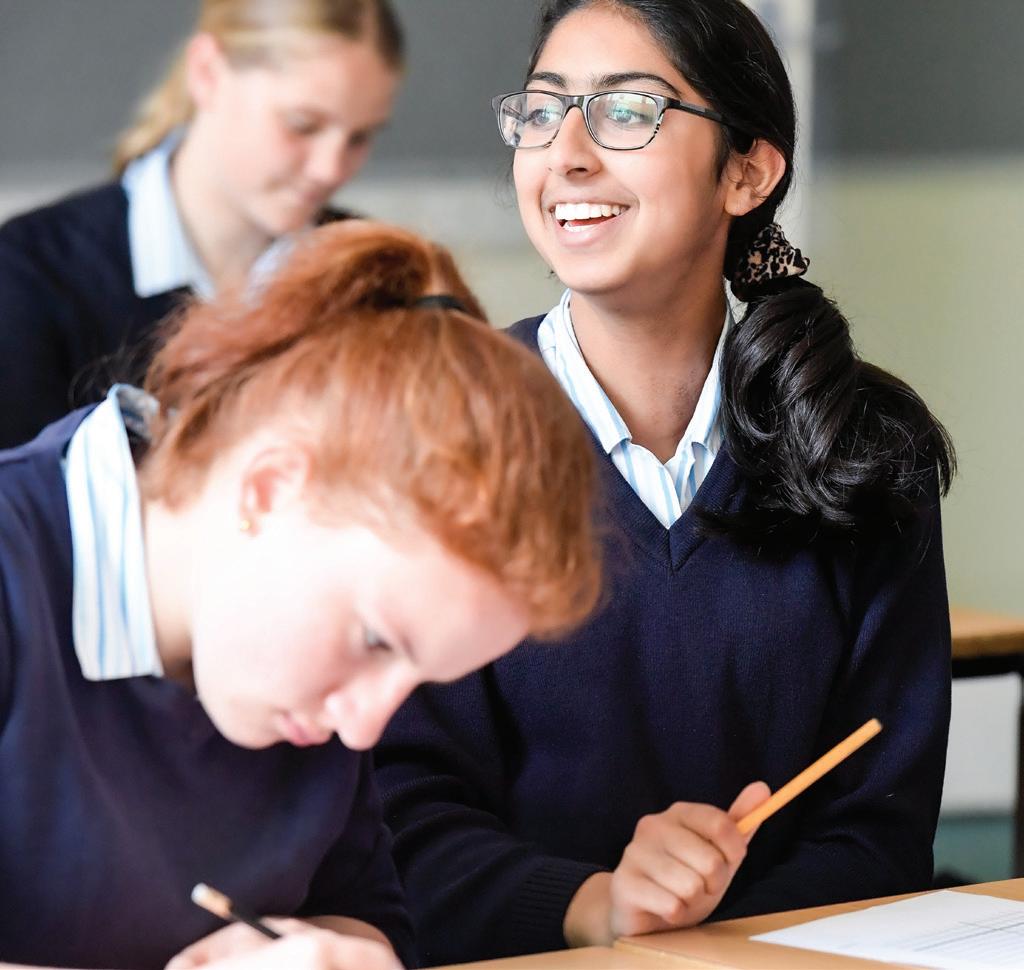
Thursday 16th March 2023
Wednesday 10th May 2023
Friday 23rd June 2023
01483 899609

admissions@stcatherines.info
 GSA Day & Boarding School since 1885 | 4 - 18 years | Guildford GU5 0DF
GSA Day & Boarding School since 1885 | 4 - 18 years | Guildford GU5 0DF
Ask any teacher and they will tell you that the word ‘change’ is endemic in education. It is frequently discussed as a concept that we must embrace, often in relation to phrases such as ‘a changing world’, ‘new global citizens’ or ‘developing the leaders of tomorrow’. While these are, of course, valid aspirations, they tend to place emphasis on an abstract sense of scale, both time and geography, and sometimes fail to be inspired by what is already there – the students in the here and now.
We are learning from our community at DLD College London, a community of students and academic leaders from over 57 countries, located in the heart of the capital. Embracing a unique context of British and international influences, we recognise that young people join us with di erent experiences, views and aspirations for their education. We have learnt that it is not change that is needed, but a closer ear to the needs of the now.
It’s important to understand the forwardthinking nature that education has to embrace in order for students to be prepared for the increasing variety of learning opportunities. Our new Year 9 programme, for example, o ers a curriculum designed to spark a love of learning for the younger years, preparing students for the careers of tomorrow, at the same time providing a solid bedrock of knowledge and skills.
It’s a modern concept that delivers a
hybrid of the traditional and the cutting-edge, introducing students to the critical rigours of English and mathematics to support the levels of literacy and numeracy that are required across all other subjects, while also embracing contemporary topics such as NFTs and cryptocurrency in Digital Futures.


Project Based Learning (PBL) can also add great value. This style of bespoke, inquiryled learning enables young people to get involved with the wider community while developing their research, inquiry, reflection and decision-making skills. Students have the opportunity to take action and make authentic changes to their own lives and that of others in their community. As a school we can provide the tools, but the outcome is firmly in the hands of the student – a unique opportunity to follow a real passion and thrive.
Students do not fit into one mould, so a variety of traditional and contemporary courses can be hugely beneficial. We are seeing an exciting array of new programmes being introduced. Our Esport BTEC, for example, is the first of its kind in the world and has been developed in partnership with the British Esports Association. This BTEC Level 2 contains industry-specific, relevant content that allows progression to further study and eventual careers in Esports, and wider digital, tech, and STEM industries. Through practical activities and occupationally-fitfor-purpose assessments, young learners have the opportunity to gain the skills and behaviours needed for academic progression and, ultimately, sustainable employment.
DR SARAH WATSON Vice Principal (Academic), DLD College London



“We have learnt that it is not change that is needed, but a closer ear to the needs of the now”
Dr
on the importance of creating unique learning opportunities – here and now – for students
Dance challenges body and mind, making it both a great exercise and a wonderful creative outlet. We speak to four schools to find out how their pupils benefit
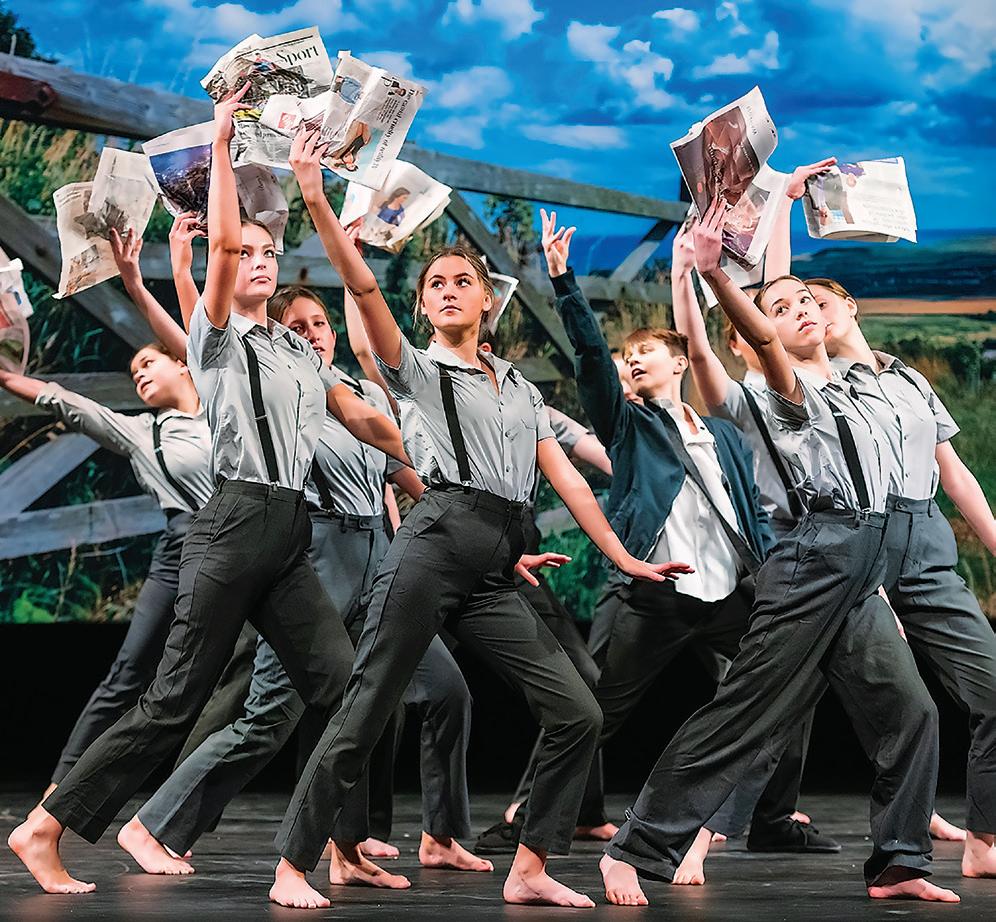
Dance has not been a traditional offer among the UK’s schools, but as they increasingly look for alternatives to the traditional team and individual sports in order to enthuse all their young people, it is coming to the fore. One reason it has been a bit slow off the blocks is that traditionally it was considered as genteel and ‘for girls’, but any casual exploration of the modern world of dance shows it is neither. And with street and modern alongside jazz, tap, ballet and hip hop, it hits that rare sweetspot of being broad enough for all tastes. Critically, it is now viewed as pretty cool by students of all ages.
Of course, dance is not just about physical exercise – it is a whole creative language that requires us to interpret the world through movement and tell stories that an audience can understand. This brings much broader benefits, as schools that take the subject seriously at Senior level have discovered.
West Sussex day and boarding school Hurst College most certainly believes in the beneficial powers of dance and has made it a compulsory subject for all Year 9 pupils. Regardless of previous experience, boys and girls take part in a lesson every fortnight throughout the academic year. After
this Year 9 introduction, pupils then have the option to carry their experience forward as the school offers Dance at both GCSE and A level.
Head of Dance Nicola Dominy says it’s important to understand what the Year 9 activity can bring. “Its value is in nurturing young people’s creativity, promoting mental and physical wellbeing and providing insight into the wider world.” One fascinating aspect of Hurst College’s approach is that the pupils who arrive for their first dance lessons range from those who already dance to those who believe they have two left feet. And, of course, at around this age, many teenagers are painfully self-conscious about their growing and changing bodies.
Nonetheless, they are all in the dance studio together. “Some already possess a love and passion for dance while others may harbour prejudices and anxieties about feeling vulnerable and exposed,” says Nicola Dominy. “By the end of the year, regardless of whether or not a student ever sets foot in the studio again, it is hoped that stereotypes are dispelled, self-confidence is developed, and a lifelong appreciation is cultivated for an art form that is at the very pulse of humanity.”
Dance can be a wonderful stress release as well as an amazing creative journey, and the performances that Hurst students create show just how far students can develop. Pupil feedback also suggests that putting dance


on the compulsory timetable for all pupils works on many levels. One young person has described how learning to dance ‘makes you feel more accepting of yourself’. Another mentions how it helps you ‘engage with the world in alternative and interesting ways – to think outside the box’. Perhaps the measure of the success of Year 9 dance at Hurst is best summed up by the boy who notes: ‘When I was younger, I probably did think that dance was more for girls...my opinion has matured’. He concludes: ‘At Hurst it is just normal for both boys and girls to do dance’.
The Dance team at Duke of York’s Royal Military School (DOYRMS) say this is a unique subject for students, blending artistry with physical activity. What’s more, it works beautifully in collaboration with other art forms and subjects. Students at the Dover boarding school – which has a superb Performing Arts Centre – have many opportunities to perform both in school and at local and national events, as part of their learning. DOYRMS also ensures children participate in many related workshops and experience dance by
“Dance nurtures young people’s creativity, promotes mental and physical wellbeing and provides insight into the wider world”
And crucially, this exciting school is equally successful academically. In fact, it’s statistically one of the top co-ed boarding schools in the UK.
So, if you’re looking for a really exciting and rewarding change of school at 16 – don’t leave it too late. Contact Cosmo Jackson or visit our website for more information.
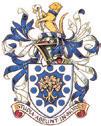
attending live performances.
The team here is led by Amy Gerrard and Ashleigh Acres, who point out that dance is a discipline which allows students to be expressive and work collaboratively – and it builds resilience in young people. It enables students to be inquisitive, unlock innate creativity, and improve fitness.


Like other schools that offer the subject, DOYRMS also believes it helps to sustain mental wellbeing.
While performance is key, students here also learn to analyse and think critically about the historical, political and social events which have impacted dance – they are taught that dancers are philosophers, scientists and historians, as well as performers. Classroom teachings are linked with current and past trends and events and teachers make a point of sharing cross-curricular knowledge in lessons (and opportunities to learn outside the classroom) to help support students’ learning journeys through the school. Recently, dancers learnt about electricity, the Wall Street Crash
and the work of Banksy – all through the medium of dance. A variety of dance styles, from street, contemporary and musical theatre to African and Capoeira, are offered at DOYRMS and some students at the school choose to get BTEC and A-level qualifications in Dance. Beyond the curriculum and co-curricular opportunities (via some 80 weekly clubs at the school), individual dance lessons are offered to support individual progression towards recognised dance qualifications. One mark of DOYRMS’ success in its dance pathways is that, with the help of the school’s careers and university advisory team, several students have gone on to study dance at top universities.
“While I grew up with a more modern dance style of street and hip hop, at DOYRMS I have discovered many new styles and different techniques,” says an A-level student at the school. “Dance pushes my abilities and enables me to grow mentally and physically through movement, which is why I love it so much.”
Dance is taken very seriously at Marymount London – it offers the subject all the way to IB Diploma level, having included it in DP subject choices in 2021. “This is a unique curriculum-embedded subject which only adds to the whole child development of a Marymount student,” says Teacher of Dance Daisy Tozer. She says the school views dance as every bit as important as other subjects. “Dance lessons allow for creativity, physical activity, confidence building, collaborative skills and, most importantly, expressive delivery. These are all key parts of a child’s development and promote many transferable skills which can be applied throughout other lessons and into a range of employment fields.”
Pupils at the school enjoy dance as part of their IB Middle Years Programme curriculum from Grade 6 to 9 (Year 7-10). “They experience a range of dance genres, styles, and dance world traditions. This in turn opens the eyes of students, allowing them to see how universal dance really is,” adds Daisy Tozer. Alongside timetabled dance lessons, and specialist Royal Academy of Dance (RAD) and ISTD lessons and exams for individual pupils, there are a whole host of other opportunities to watch and try out different styles of movement – from the annual Dance Showcase held at the Exchange Theatre in Twickenham to STEAM festivals and creative workshops.
Dance plays a central role within the Performing Arts Department, and with a Dance Hub where students can try out moves and develop their skills, stamina and strength. Located in the leafy grounds of the school, this dedicated building also offers a tranquil and light-filled setting for developing original creative performances.
“It offers transferable skills which can be applied throughout other lessons and into a range of employment fields”


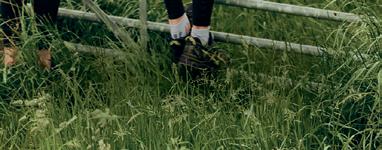

Of course, dance is also a part of the wider creative life of the school through plays and productions, including the summer performing arts concert to showcase achievements in each grade. Thanks to Marymount’s location in Kingston upon Thames, there are also plenty of scheduled opportunities for boarders and day pupils to enjoy world-class dance in the heart of the capital. Daisy Tozer says the world of dance offers broader benefits that last long after school. “A Dance teacher’s role is to encourage and present a new physical form of language and to develop transferable skills to their students in a positive and creative environment.”
Dance has been a popular activity at Heathfield School in Ascot for over three decades. “We are lucky to have a team of experienced and dedicated Dance Teachers, who have not only trained with the best at the Royal Academy of Dance and Laine Theatre Arts, but also danced in companies and shows worldwide,” says Natalie Shaw, the school’s Dance and Drama Coordinator. Heathfield offers ballet, pointe and tap, but also contemporary and acro (ballet incorporating acrobatic techniques). Girls can study a Dance GCSE, and also have the opportunity to study dance to examination level through the Royal Academy of Dance (RAD), Assessment and Qualifications Alliance (AQA) and the Imperial Society of Teachers of Dancing (ISTD).
All Heathfield dance classes are held in a purpose-built studio with harlequin flooring, ballet barres and mirrors. But dance also spills over into other school spaces, with regular shows and concerts taking place

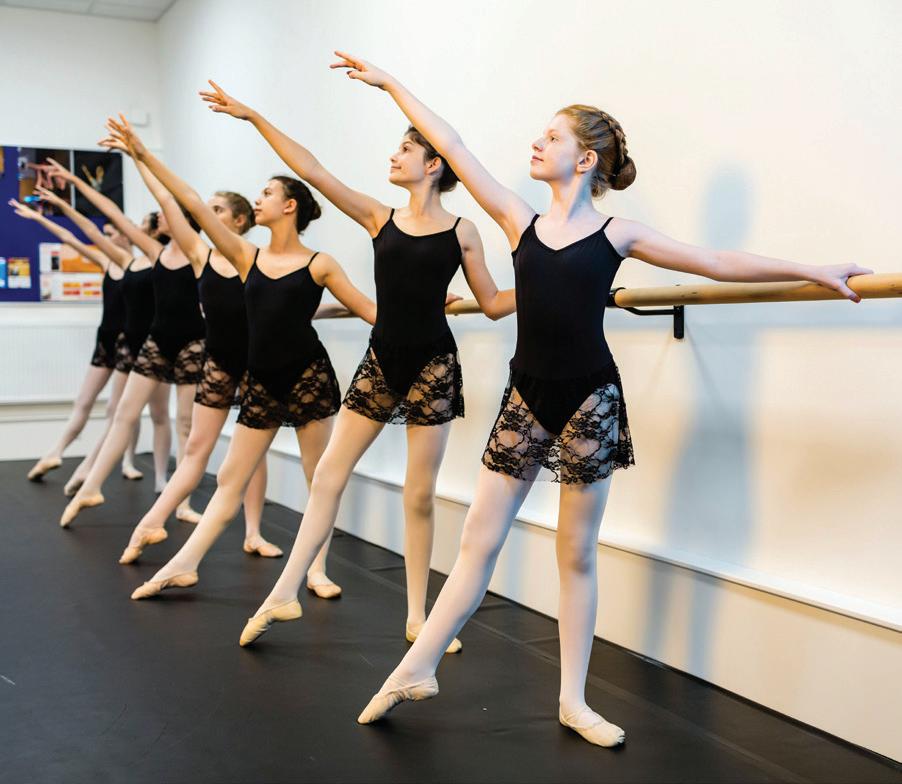
in the school theatre. Girls are given plenty of opportunities to maintain their interest in dance as a recreational activity, even if they don’t take it to exam level. “Dance is a popular form of expression and exercise and is a fantastic way to escape the cares of everyday life,” says Natalie Shaw.
She cites many reasons why dance is such a good activity for young people – cardio health, coordination, strength, balance and brain and body flexibility among them. But more than that, she believes it’s a great social activity – so often dance is a cooperative or teamwork affair. Students at Heathfield certainly enjoy all of that, and even use dance for good causes.
“Recently one of our dance students held a 12-hour danceathon to raise money for the charities Great Ormond Street Hospital and The OSCAR Foundation, which uses the power of football to teach the importance of education.” Proof, surely, that dance not only gives young people good moves, but also the mindset to do great things in the world beyond the school gates.
“Recently, students learnt about electricity, the Wall Street Crash and the work of Banksy – all through the medium of dance”ABOVE Dance is popular at Heathfield School BELOW A performance at Marymount London


































































Try turning o the radio, remove soundtracks from film and jingles from advertisements. We would be lost without music. Yet, music is taken for granted, with funding cuts in the arts and less and less support for it in our schools.

We are extremely lucky at Wells Cathedral School. We are one of very few specialists music schools in the country; we have incredibly talented pupils and sta and we enjoy amazing facilities, including a



beautiful modern concert Hall (Cedars Hall), a medieval hall (Quilter Hall), and the awe inspiring Wells Cathedral. We know we are lucky and we know that we want to share.
Now that we are through the restrictions imposed by the pandemic, we have been able to throw our doors open again. We have been able to reinstate our large concert diary and resume and expand our community music programme – including our instrument days, which are free to attend. What an experience it was recently to hear over 50 French horn players from Grade 1 to post Diploma – and from near and far afield – all performing together in a specially composed work. In recent months we have held similar days for clarinet, violin and trombone.
Days like these enable us to share much more than facilities and expertise. They nurture amazing team spirit. The youngest musicians are encouraged to share their reactions to music heard or performed for the first time, while the more senior players act as mentors or ‘elder siblings’. They begin to appreciate the process of teaching for themselves and how this helps them reflect on their own practice. It is also a fantastic chance to involve parents.
At our recent violin day, while pupils were rehearsing with one teaching team, another team was involved in a seminar with parents discussing openly, honestly and supportively the trials of and strategies for helping young musicians to practice better and more joyfully. We all agreed that marks in exams are not as important as being creative, having fun and telling a story through our music.

Practice can be shared too. It is always a joy for me to discover musicians working together. This can happen surprisingly easily if a culture can be created of openness and generosity and of questioning. It is remarkable how one’s own practice improves by really listening and reacting to another musician. No reaction to music is ever wrong. I am frequently amazed by drawings, by models, by computer animations of children’s reactions to music. Equally, by how much more they are able to say with the music when they perform it. Their own musical voice has been hugely strengthened and their commitment to performance is stronger than the desire merely to play right or wrong notes.
Music teachers need to stick together. None of us has all the answers. We can all get stuck with what we think we know works best and, however well it goes, there is a chance that it might lose its freshness. We can succeed in making sure future generations take up and enjoy music by forging partnerships, collaborating, and sharing everything. Please do not hesitate to be in touch should you wish to discuss and share any ideas or hear more about our Instrument or A-level Music days.
“We can succeed in making sure future generations take up and enjoy music by sticking together, forging partnerships”
Wells Cathedral School’s Director of Music says the future of music education rests on courage, generosity and sharing
ALEX LAING Director of MusicWells Cathedral School
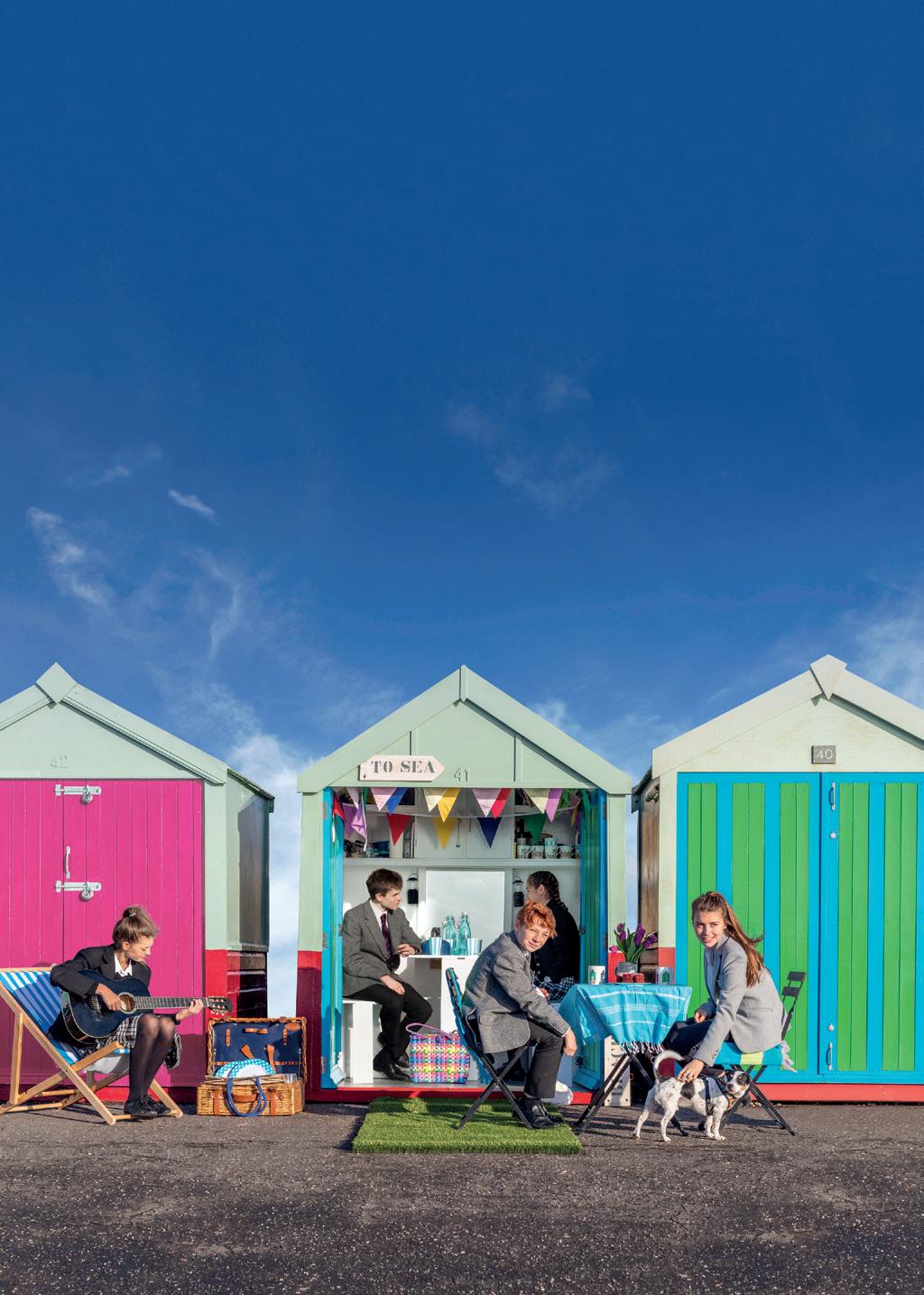
The Deputy Head of Abingdon House, a specialist school in London for children aged 5-19, on the ways the arts support learning and growth
Working in a specialist school supporting pupils with varying needs relating to their autism, specific learning di culties, social communication di culties or other associated needs, we make use of an integrated therapy approach. Our teachers, speech & language therapists and occupational therapists work together in partnership to break down the barriers to learning.
In doing so they ensure that our students are able to access the curriculum to their full potential. While this approach works incredibly well for traditional academic subjects, it is in the creative arts subjects – Drama, Music, Art and Dance – that integrated therapy can really come into its own and o er some of the greatest benefits.

The style and delivery of teaching and learning in the creative subjects – practical, expressive and nurturing – allows students with learning di erences the opportunity to shine where they may not in a more traditional classroom setting. In arts subjects, students are encouraged to develop their ability to explore the world around them in a multi-sensory environment They are able to express their ideas in practical and creative ways and work independently and collaboratively to suit their particular needs.
Creative subjects allow students with special educational needs to discover their
voices. Through drama and singing students explore and develop the pitch, tone, inflection and volume of voice that’s needed in a variety of social situations – they explore this through play, improvisation and adult modelling. Students are encouraged to decode their own and other people’s facial expressions by mirroring adults and their peers, through drawing and sculpting and through the sharing of experiences.
Art and Music develop students’ fine motor skills while Drama and Dance can enhance gross motor skills – two areas that many of our students need support with. While sensory or movement breaks, which are so important to help regulate and focus SEND students, are embedded within subjects across the curriculum, using dramatic or dance techniques can often aid these practices in a playful and safe way.
The arts are hugely important to good mental health and wellbeing. Not only do they allow students to develop a sense of their own identity, to build empathy and increase their resilience, but students can
also use the creative arts as a way of releasing the pressures they experience elsewhere in their lives in a safe and controlled environment. Singing, painting, moving, playing or listening to music all support a SEND student’s ability to regulate emotions and allow them to access the curriculum more e ectively.
Being visible – that is, feeling like you’re seen and represented – is vital to every part of society, and this is especially so for young people with learning di erences. Arts subjects allow students to create work that reflects their own lives and realities. This empowers them to tell their own stories and that, in turn, builds self-belief and confidence.
With all these benefits, it’s easy to forget that a rich and varied arts education is important purely for the joy these subjects bring to our lives. The arts allow us to feel pain and su ering, love and hate, joy and ecstasy – all from the safety of our classrooms.
Of course, this beneficial input isn’t limited to SEND students. All students everywhere deserve an arts education that allows them to grow into fully rounded and socially literate citizens.
JAMES GILBERT-FARRELL Deputy Head, School
School
“It is in the creative arts subjects – Drama, Music, Art and Dance –that integrated therapy offers some of the greatest benefits”Abingdon House
ACS Hillingdon has a couple of firsts with its IBCP option in Digital Arts. One is its championship of this lesser-known cousin of the IB Diploma, the Career-related Programme. The other involves delivery – its training has a real-world industry location for some of the time at London’s hallowed Pinewood Studios.
Andy Groark, Head of Creative Arts and CP Digital Arts Leader at ACS Hillingdon, is justifiably delighted with this superb industry location, and what the course is offering to students –skills that capitalise on local needs.

“We saw it as an ideal niche,” he says. “It seems like the biggest demand and the most logical choice is to have something industry facing that is local to our community.”
While we have long had a world-class film industry in the UK when it comes to technical and creative expertise, anyone who keeps an eye on the sector will be aware of the exponential growth of studio facilities. There’s one at Shepperton in association with Netflix, the Sunset Studios scheme in Broxbourne, plus
additional creative spaces mooted for Barking and Borehamwood. This creative ring around London is one reason for such an industry-facing course. It runs alongside another recently introduced IBCP at Hillingdon in Expressive Arts. That programme covers the performance side via LAMDA qualifications alongside areas such as set design and prosthetics. Again, some of this training happens at Pinewood.
With Digital Arts, the content is distinctive and also cutting edge, incorporating animation, 3D modelling, game design, visual effects (VFX) and computer programming. All these areas are incredibly relevant to film making – but also to the mushrooming video games industry. As Andy Groark notes, the two industries are increasingly interlinked.
“Video games like The Last of Us have been converted into TV shows,” he says. “They are on a similar budget to film, and with a similar spread of audience. The biggest selling media product in history isn’t Gone with the Wind, it’s Grand Theft Auto V.”

Andy Groark has a specialist expertise in film, having worked in different contexts
across the industry. While he was teaching an IB in Film in Shanghai he worked within the film industry part time. That’s when he met the producer of Cities of Love and a collaboration emerged that saw some 20 local schools producing 15 films. The practical education in film idea stuck, which is why, when he started as Head
of Creative Arts at ACS Hillingdon, he began ringing round locally to speak to organisations that o er training. “Some of the most prestigious, like Pinewood, had the doors thrown open for us.”


It’s wonderful to see industry stepping up, and also a mark of the need for the next generation of trained talent. “That’s why we decided to lean into it,” says Andy Groark. “There are so many jobs in DFX or games design, or in a situation between the two, so certainly for our students there’s a massive advantage in having a head start by taking courses like this at high-school level.”
For students on the Digital Arts course, there are opportunities at Pinewood to develop screenwriting and film production
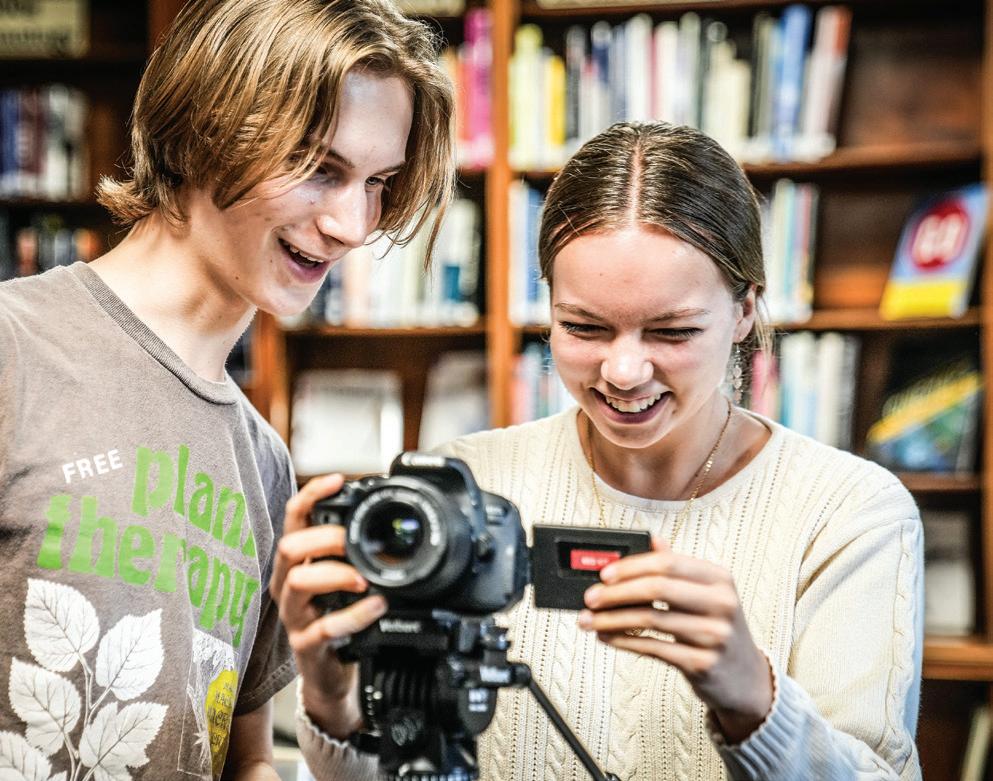
skills, along with more technical training, and they benefit from collaborations with industry specialists and mentorship throughout the two-year course.
The IBCP retains key elements of the IB framework. This means, for example, that there’s a reflective independent project related to ethical and practical issues for the industry. So students might focus on, say, representation of di erent groups and communities in media or the work/ life balance issues that arise within such a deadline-focused environment. Andy Groark likes this aspect. “It’s formative,” he says. “They are looking at bigger strategic challenges that equip them for leading that industry further down the road.”
The IBCP doesn’t specialise at the expense of broader skills and knowledge. Digital Arts and Expressive Arts choices each represent two blocks from the IB electives, so a traditional core of subjects within the IB framework remain. There is a very useful add-on within PPS (personal professional skills), where students on the IBCP look at how to get that all important first break. There is a somewhat di erent set of tactics here to many other industries – being persistent, pushy even, can pay o if you are looking for a job.
Eligibility for the course is a matter of looking at young people’s orientation and aptitude. Those already at ACS Hillingdon have been introduced to film

“AT PINEWOOD, STUDENTS BENEFIT FROM COLLABORATIONS WITH INDUSTRY AND MENTORSHIP DURING THE PROGRAMME”
and digital through earlier courses and tasters, but the Digital Arts programme is drawing in keen students from beyond the school. The first cohort graduates this summer, and half were fresh starters in the Sixth Form. Half again (so, a quarter) had enrolled specifically for this study pathway.
Interest is already high for next school year, and ACS Hillingdon is considering how it might grow facilities on campus in the future. This career-focused



programme still keeps post-school options open.
“They could go straight to industry from here or choose further education and go on to college or university and build their networks, improve their skills and their portfolios and certainly be ready at 21 to go straight into a junior job.” The skills they are taught have relevance to other industries too – for instance, design, architecture and engineering or advertising and marketing.
Andy Groark enjoys the ‘real world’ atmosphere of the IBCP. He recounts how, while shooting a film noir with a group in the school library, the camera started rolling and a couple of students carried on talking. He simply pointed out that if this were a professional set they would be thrown off it – information that hit home and with no hard feelings. “How often do you have the opportunity to deal with behaviour management where it’s so easy to have those conversations? It’s not me saying ‘you’re annoying me’, but ‘this is how it’s done – you have to follow the protocols of the industry’.”
“THERE ARE SO MANY JOBS AND THERE’S AN ADVANTAGE IN HAVING A HEAD START BY TAKING COURSES LIKE THIS AT HIGH-SCHOOL LEVEL”


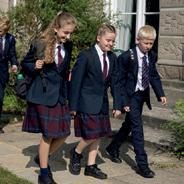
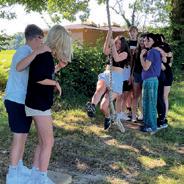









We are an online tuition service that empowers GCSE and A Level students to achieve grades 7-9 at GCSE and B-A* grades at A Level so that they can progress to the colleges, universities, apprenticeships and careers of their dreams.

All our tutors are fully qualified teachers with at least three years’ experience teaching and raising achievement in their subjects.
07470578247 | hello@espd.school | espd.school
“I graduated from one of the top 10 universities in the world and it is safe to say I wouldn’t have reached this point without his support and encouragement along my academic journey.” S.B.


From rapid technological developments to increasing globalisation, the world is advancing at an unprecedented pace.
The World Economic Forum estimates that, by 2025, children and teens will need a new suite of skills to succeed in the world of work.
How do we support young people to build those attributes? Today, the International Baccalaureate (the IB) is rapidly growing in popularity as a future-ready way of learning. Designed to cultivate inquiring, internationally minded young people, the IB Diploma Programme is a rigorous, rewarding qualification for students aged 16 to 19.
Every curriculum has its own aims and benefits. A levels, for example, provide a specialised education in a specific set of subjects. The IB Diploma emphasises a broader, interdisciplinary approach. Rather than focusing on a specific field, students choose one subject from each academic discipline – from the sciences to the arts – building a rounded education. Global mindedness and cultural understanding are interwoven through every subject. In biology, students may learn about sickle cell anaemia in parts of Africa or the Chernobyl nuclear accident in Ukraine. In English literature, they’ll examine how both original and translated works approach common global issues. Every student also takes a foreign language, opening doors for the future.
Alongside this, learners also study three subjects known as the ‘DP core’, which
challenges them to put their learning into action and does a wonderful job of developing future-ready skills. Theory of Knowledge, for example, builds critical and analytical thinking, while a successful Creativity, Activity, Service project requires everything from active learning to leadership and influence.
In September 2022, King’s InterHigh became the first school to o er the IB Diploma Programme fully online. In partnership with the International Baccalaureate Organization, we bring all the benefits of the IBDP curriculum to our students anywhere in the world.

With students from over 100 nations, our learning community is inherently international, putting the IB’s mindset into real action. For Matt, who graduated last year, the introduction of contributions from around the world was the best part of learning online with us. “People were able to bring in perspectives I would have never been exposed to before joining such a diverse school environment,” says Matt, who now studies at the University of British Columbia.
As we shift towards a post-pandemic economy, where remote and hybrid work is commonplace, learning online is also a way to build essential digital skills. At
King’s InterHigh, we teach using innovative technologies like virtual reality, immersing students in that innovative way of thinking.
We’re firm believers that great online education is just as rigorous, warm, and inspirational as traditional learning – but with more flexibility, more personalisation, and more innovation. Unlike distance learning during the pandemic, this approach truly works. Our Sixth Form students prove that year after year by going on to renowned universities.
The future belongs to young people who can think critically and creatively, collaborating across borders and cultures. With online IB learning, we’re guiding our students to make that future theirs.
“We’re firm believers that great online education is just as rigorous, warm, and inspirational as traditional learning”ALESSANDRO CAPOZZI Head of Sixth Form King’s InterHigh
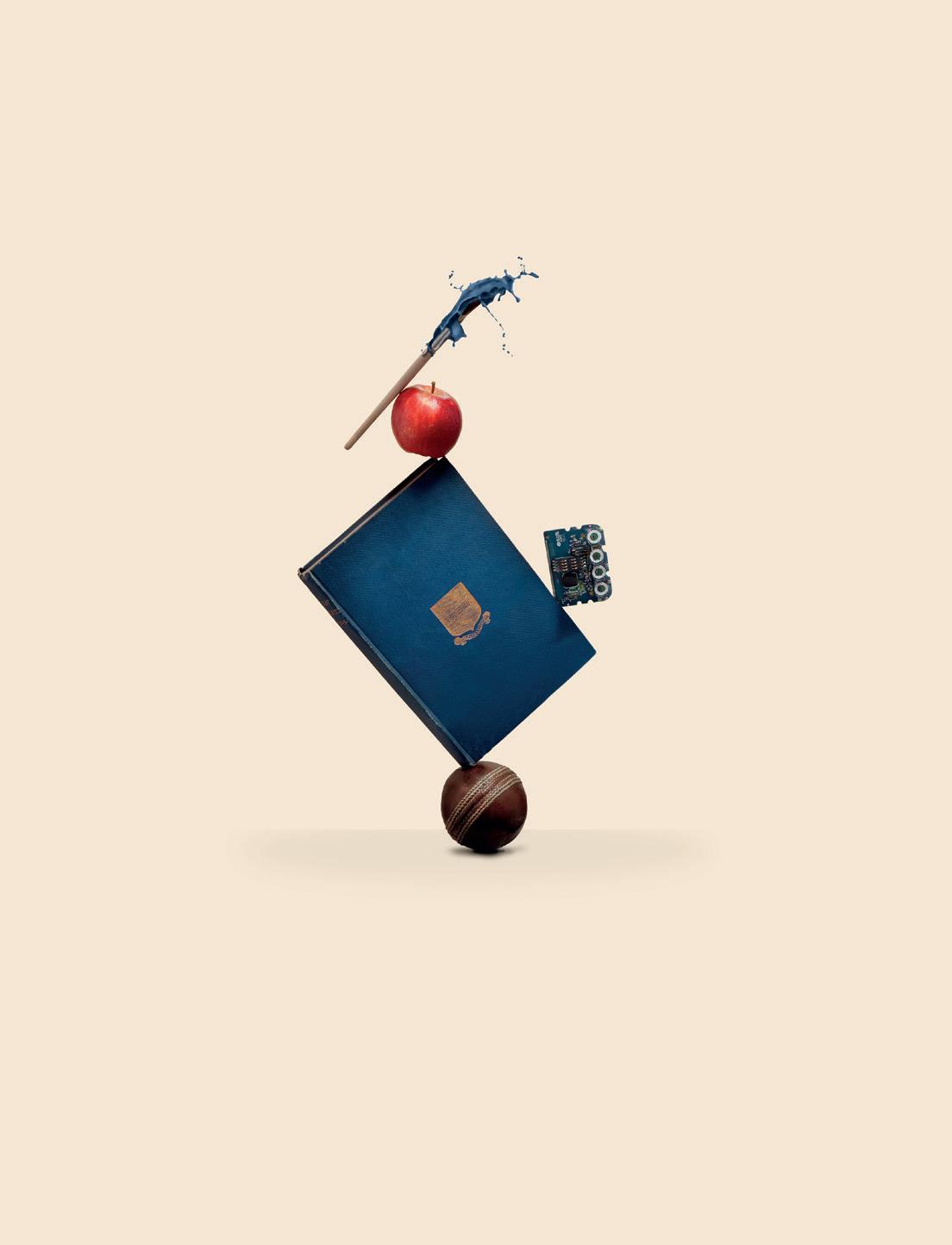

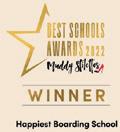

What do we want our young people to have achieved by the end of their two, three, five or seven years with us? It is a profound question that has many answers. However, reduced to a single tenet, boarding schools would say that they wish their students to flourish. The founder of Wymondham College, Sir Lincoln Ralphs, immortalised the idea in the College motto: Floreat Sapientia – ‘Let wisdom flourish’.
At the heart of Wymondham College sits a lone Nissen hut, originally constructed in 1943. It is one of several dozen that served as a hospital for American airmen, casualties of the Second World War, who came to fight and defend our freedom.
Sir Lincoln Ralphs and fellow founders recognised that those same huts could harness the vitality of youth and the energy of great teachers into a unique school. Today, a wonderful fusion of heritage and modernity characterises our educational philosophy. As the largest of the 34 State Boarding Schools in the UK, 640 boarders join us from the UK, Europe and beyond – our community is an exciting and unique blend of young people. Last year, Wymondham College was awarded the Pearson National Teaching Award for State School of the Year.
To flourish, students need to acquire and develop knowledge that will be tested in examination halls. But to really flourish, to reach one’s potential and be happy
in life, more than this is needed. Character, and the acquisition of moral, civic and intellectual virtues is fundamental to these goals.
It has been our strong belief that actively participating in the Wymondham College community is a deeply formative experience that helps students develop these dual aspects.

Whether by joining a new Wymondham Life Club (horse riding, scuba diving, the tea appreciation society) or supporting a House charity, students are flourishing. Our Wymondham College Diploma programme enables us to capture, promote and – most importantly –celebrate these character endeavours. All Year 7 students are provided with a Diploma Portfolio, which contains four sections – Jumping In, Looking Out, Curiosity and Creativity and Personal Growth – within which students record their out-of-lesson pursuits. Character is largely caught through role modelling and emotional contagion
Sport at Wymondham Collegeand the College ethos and culture certainly supports this significantly. But character can also be taught by providing students with the rationale, the language and the tools to be outstanding citizens in College and beyond. To support this, dedicated lesson time is woven into the Year 7, 8 and 9 curriculums to deliver Floreat, or ‘Flourish’, lessons. Delivered by members of the Senior Leadership Team, sessions seek to equip students with the intellectual tools to make wise choices.
ZOE FISHER Principal Wymondham CollegeWe all want our children to develop the personal strengths and virtues that will enable them to go out into the world with the confidence, resilience, awareness and self-belief needed to negotiate the challenges and opportunities that life will bring – perhaps the Covid years have revealed this need even more. A boarding education provides opportunities for this journey that are unrivalled.

The Principal of Wymondham College considers what school can deliver beyond academic success to ensure young people flourish in a challenging world
“Character can also be taught by providing students with the rationale, the language and the tools to be outstanding citizens in College and beyond”





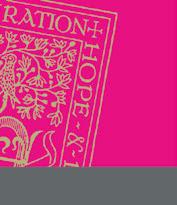












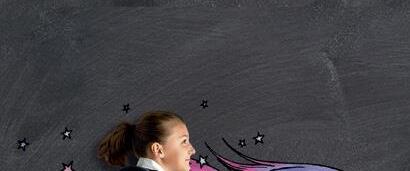




Joining a new Sixth Form might seem a challenge, but it is also an exciting opportunity and could have huge benefits. Importantly, it will be the first time that your child will have made their own decision about where they want to study and be fully invested in the opportunity; possibly as a result of their own research, their own visit and via conversations with current and former students. At Colchester Royal Grammar School (CRGS) we have single entry in Year 12 to our Sixth Form and welcome around 50% of new students, joining from both local and international schools. A third of all Sixth Former students here at the school are female.

Starting Sixth Form at a new school is an exciting prospect, and here at CRGS the school becomes co-ed and o ers quite a di erent dynamic. The Sixth Form areas

are separate, the uniform is business attire, and this stands out against the sea of purple blazers worn by the lower school. We encourage a work hard: play hard mentality and, while there is a huge focus on academic studies, there are plenty of opportunities for ‘play’ including producing school productions, performing in orchestra and musical ensembles, representing the school in debates, on the sports field and lighthearted events – including the aptly named Fun Fridays. These timetabled breaks
see Sixth Formers take part in a range of non-academic activities including karaoke, salsa, ballroom dancing, dodgeball, ‘just dance’ fun and countdownstyle competitions. All Sixth Formers should have an active voice in how a school is run, be able to voice new ideas, to organise and lead school societies and be ambassadors for the school. Our Senior Prefect Team is comprised of 15-20 Sixth Formers chosen via interviews with the school’s Senior Leadership Team in the Spring Term. The prefect team is led by the School Captain, supported by Head students and prefects. These students have regular meetings with me and are not only a voice for the Sixth Form but also support the running of the school, with working roles at open evenings and other public-facing events. Many Sixth Formers lead school
societies and fundraising and outreach campaigns. One hugely successful fundraising campaign was our ‘Cultural Day’. All students and sta wore their cultural dress in exchange for a small financial donation to the chosen charity, and the school was transformed for the day. The event broadened friendships and raised money for good causes, while helping our students to have a better understanding of the world.
We are in a unique position as a leading state grammar school to accommodate boarders in two family-style boarding houses on our grounds. Pupils come from varied backgrounds and our boarders have a worldwide outlook, with many arriving from as far afield as Hong Kong and Dubai. One boarder who recently left to study at Cambridge University, said: “I think boarding has amplified my potential, and set me up well for the next stage of my life: university. It feels less daunting living in a new city, with new people and all by myself – I’ve done that once, so I can do it again”.
All schools endeavour to support students in a broad range of extracurricular activities because it’s a great way to encourage existing and new students to mix.
JOHN RUSSELL Headmaster Colchester Royal Grammar School

While CRGS prides itself on outstanding A-level results, in the Sixth Form we focus on dovetailing academic success with extracurricular endeavours. These bring the school community together, and encourage independence, resilience and ambition in the individual.

John Russell, Headmaster of Colchester Royal Grammar School, discusses why joining a new school in the Sixth Form is a good idea
“The Sixth Form areas are separate, the uniform is business attire – we encourage a work hard: play hard mentality”
This is where you light your fire find your magic learn to love your mind
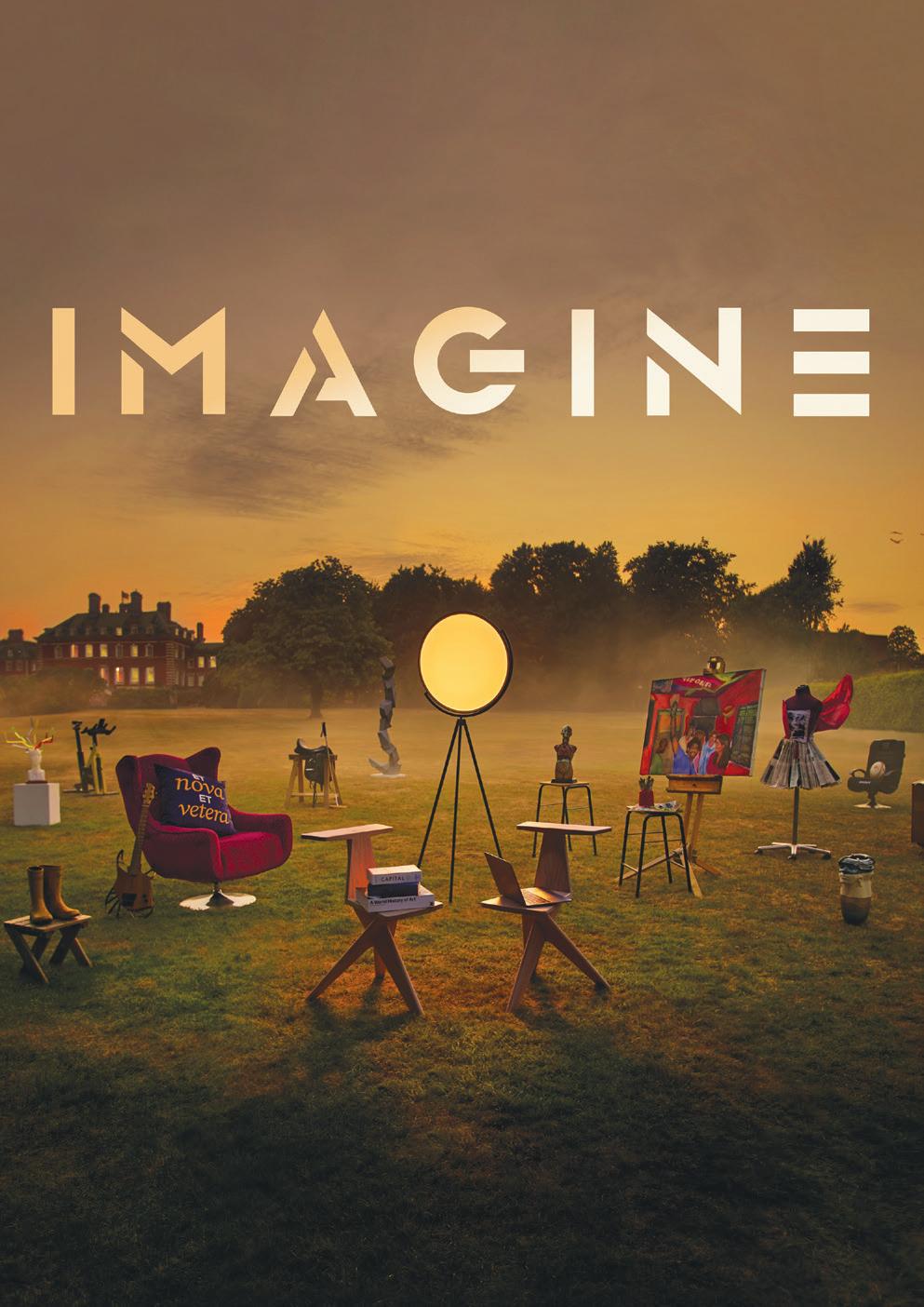
Bryanston is a leading co-education boarding and day school in Dorset for pupils aged between 3 and 18.
bryanston.co.uk/yourplace

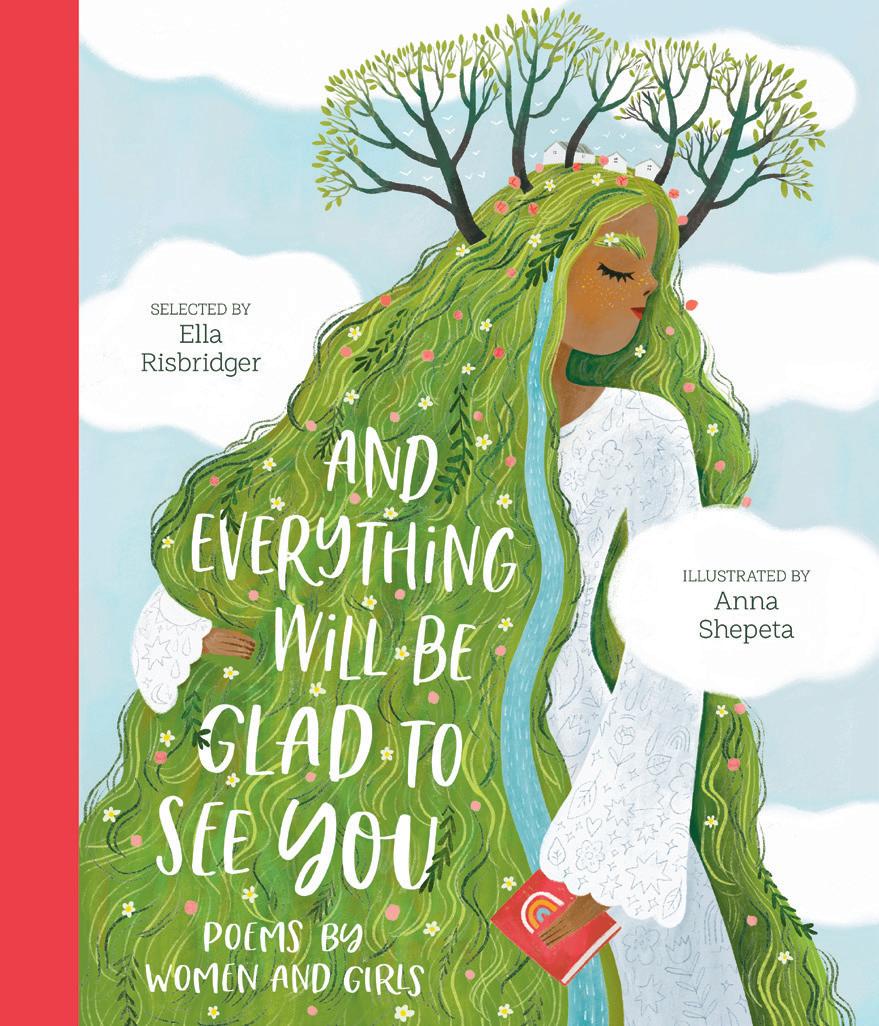
Graphic novelist Jerry Craft talks about the importance of great expectations and giving children characters and stories they can believe in
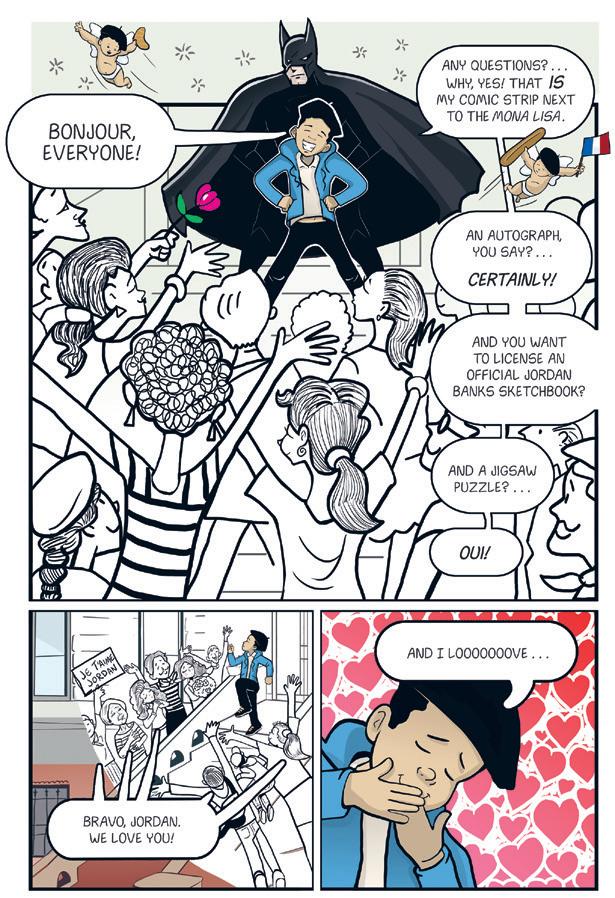
Author and illustrator
Jerry Craft creates the books he wanted to read as a child growing up. It is as simple as that. His graphic novels have attracted legions of fans, been translated into 13 languages and won multiple awards, including (for New Kid) the John Newbery Medal and the Coretta Scott King Author Award (both 2020), as well as the Kirkus Prize for Young Readers’ Literature (2019).
Craft is justifiably proud of the fact that New Kid is the only book in history to have carried off all three gongs, and justifiably mystified that – briefly – his work was ‘banned’ by some US school districts for supposedly promoting critical race theory. This was swiftly revoked; in a TV interview around that time, Craft ruefully explained how he had to look up critical race theory on Google to find out what he was accused of.
School Trip, Craft’s third book in the series, comes out this April. It revolves around many of the same cast, including Jordan, Drew and Liam, only this time they’re whisked away from Riverdale Academy – their private school in New York – to Paris. A prank by a couple of pupils means their teachers get switched and mishap, comedy and happy resolution follow. It’s a great read for the 8-12 age group, with many funny moments and an ensemble cast of diverse characters with very human strengths and weaknesses. “I intentionally don’t make a character all good or all bad,” says Craft.

The standout hero of the hour in Paris is the wealthiest boy, Maury. He’s smart, humble, super-accomplished in French, generous to the poorest pupil – oh, and he’s black. Craft says Maury’s character development was partly to do with criticism of earlier books in the series. “I always read reviews. I know a lot of people say, ‘don’t read reviews, they will drive you completely mad’. I read my harshest criticism.” Some critics have, he believes, a desire to find something. “They say, ‘well all the white kids are rich, and they’re privileged’. So,
I thought, ‘well OK, I’m going to take a black character – Maury – and make him the most privileged’.” The fact that Maury turns out to be privileged and likeable is part of Craft’s approach. He does nuance really well – also playing with narrative conventions. Thoughtprovoking stuff, especially for this age group. He’s open about the biographical elements. Jordan, lynchpin character of the series, is intent on becoming an artist. So too Craft, who was born in Harlem, grew up in New York’s Washington Heights, attended a private school and – just like Jordan – had parents who weren’t convinced art was: “an actual job”. He says that, for him, drawing was everything.
“If I wasn’t an artist, I was kind of stuck.”
As a child, Craft didn’t like reading novels, but he did love comics. He devoured Marvel and learned from the stories – even though comics were not ‘proper’ reading matter.
“When I was growing up my teachers would take comics from us. But we got our vocabulary from Marvel comics – Macabre, I had to look
up macabre; Valkyrie, so what’s a Valkyrie? Armageddon, what’s Armageddon? All these characters from Greek mythology...” Marvel gave him heroes he could root for, whereas novels mostly fell short.
“I never saw specifically black characters that I thought were leading lives that I wanted – or that I was proud of. It was all slavery and civil rights trouble and gangs and police and prison. I mean, I was 12 years old.” The first novel he devoured was by Charles Dickens. “The first book of any substance that I read, finished and enjoyed – and I tell you, it was like a 400page book. and I was astonished I could read a 400-page book – was Great Expectations,” says Craft. “So how does a little boy from Harlem grow up and the first character that he identifies with is a kid from England called Pip?
“That goes to show that a good character’s a good character. Pip had something that no black character I’d ever read about had, and that was great expectations. He got to the point where people expected stuff from him, and he expected stuff from him. And most black characters didn’t even expect to make it to the end of the book!”
Despite his parents’ doubts, Craft attended the School of Visual Arts New York City and then embarked on a successful first career in advertising. His comic strips were


“A good character’s a good character. Pip had something that no black character I’d ever read about had, and that was great expectations”LEFT & BELOW
NAVIGATING SUCCESS

An ambitious and supportive boarding education based on the stunning Suffolk coast.





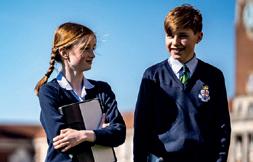

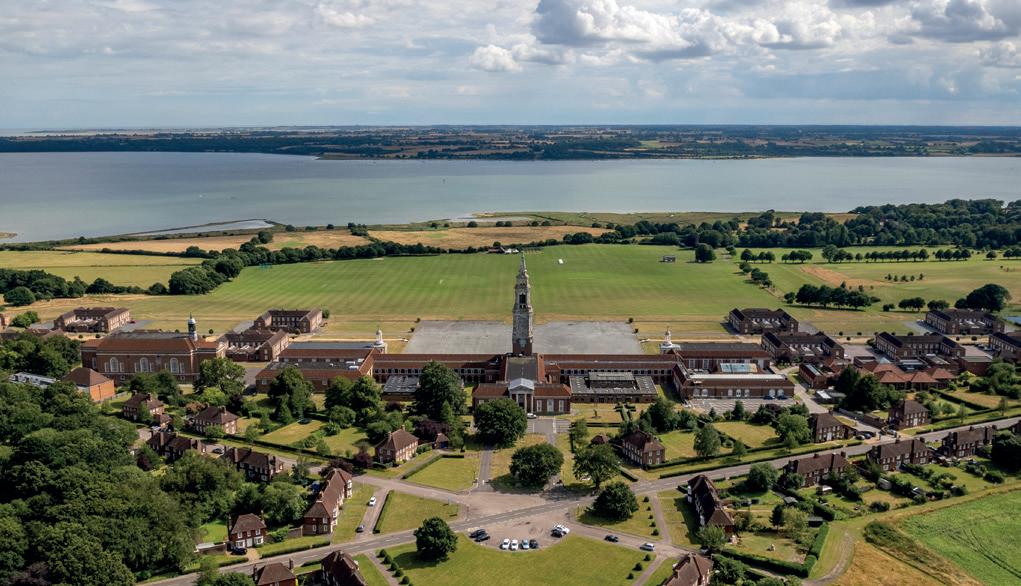
JOIN US FOR AN OPEN MORNING OR TASTER DAY
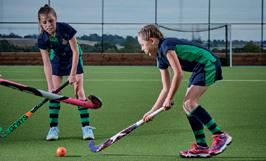
ROYALHOSPITALSCHOOL.ORG Scholarships and Bursaries available


Independent / Co-educational / Boarding & Day / Ages 11-18


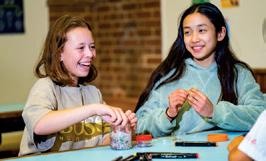
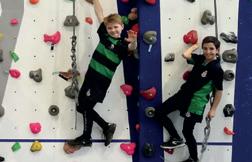
always on the go. and got picked up by some newspapers. Later he worked for Barbara Slate (who worked with Marvel) and then at King Features. While his first graphic novel (Mama’s Boyz) was published in 1997 and other self-published books followed, the freelance life was hard. Seeking out a publisher came about because he wanted more certainty in his life –especially as he was now father of two boys.


Still, getting New Kid from concept to fruition was hard. It was first pitched around 2014. A couple of publishers really liked it, but the deals fell through. HarperCollins picked it up in 2017 and, from there, it took 13 gruelling months of 15-hour days to create. When it was finally published in February 2019, and to five-star reviews, it was, says Craft, “amazing”.
Craft is delighted that School Trip is, like the earlier books, garnering great reader reviews. But, ever vigilant, he’s been checking out the negatives. “One of the earliest criticisms from parents said, ‘well, I don’t think my kids will be able to relate to these kids spending a week in Paris’. But OK, these same kids can relate to a young wizard flying on a broom with a magic wand. They can go and see Avatar, they can watch Shrek and relate to a green ogre, but they can’t relate to kids of colour spending a week in Paris?”
Craft remains philosophical about the mindset that imposes such a low bar. “As Americans, sometimes we grow up thinking this is everything. We forget that there’s a huge world outside of America with different cultures and food and things that you might just like.” One rather poignant scene in School Trip happens when Jordan’s grandpa gives him a hero’s send off and lists earlier talents – including Josephine Baker, Richard Wright and James Baldwin – who headed to Paris. Another happens at the
end of the book when Jordan gives Kirk, a best friend in his home neighbourhood, a Euro on the strict condition Kirk will one day make his own trip to Paris to spend it.
This is where Jerry Craft’s real-life scenarios become really magical. Rather like the first novel he loved, he imbues his characters with great expectations. As well as satisfying outcomes you can believe in, there are delicious comic asides in School Trip, such as when readers are given a short, off-plot skit on how not to go through life as a miserable “thumbs downer”.

Craft already had a global fan base, and there has been a great big thumbs up from overseas this time too – the first takers for School Trip translations were Albania and Lithuania (to Craft’s delighted surprise). He’s especially excited to see reactions from France. “I can’t wait to see the French version – I hope that I have done them justice and they will read School Trip and embrace it.”
School Trip, by Jerry Craft (HarperCollins, £10.99) is published on 27 April.
“Kids can go and see Avatar, they can watch Shrek and relate to a green ogre, but they can’t relate to kids of colour spending a week in Paris?”ABOVE School Trip centres on an adventure in Paris
Subtitled 'Poems by Women and Girls', Ella Risbridger's well-chosen anthology is a wonderful introduction to female poets down the ages. Many are short, making this accessible for young readers, but it's definitely a book to grow into. There's a wonderful mix of classic and contemporary names here, from Nikita Gill, Amanda Gorman and Carol Ann Duffy to Christina Rossetti, Katherine Mansfield and Emily Dickinson. Anna Shepeta's dreamy colour illustrations are perfectly pitched and help to bring the words on the page to life.

From a global culinary tour for young gourmets, to philosophy, architecture and behind-thescenes guides to the ballet theatre and concert hall, our pick of creative spring reads
Published in association with Classic FM, this interactive book follows the musical adventures of Ava and Jayden as they discover the orchestra. Ten instruments (including voice) can be heard – from "The Lark Ascending" for violin and "Rhapsody in Blue" for clarinet to "Le Cygne" for cello. It's an inspiring orchestral tour and the click to play buttons throughout the book help children clearly identify the individual sounds. Young musicians will also find plenty of interesting background details about instruments, composers and the structure of a concert-hall orchestra.
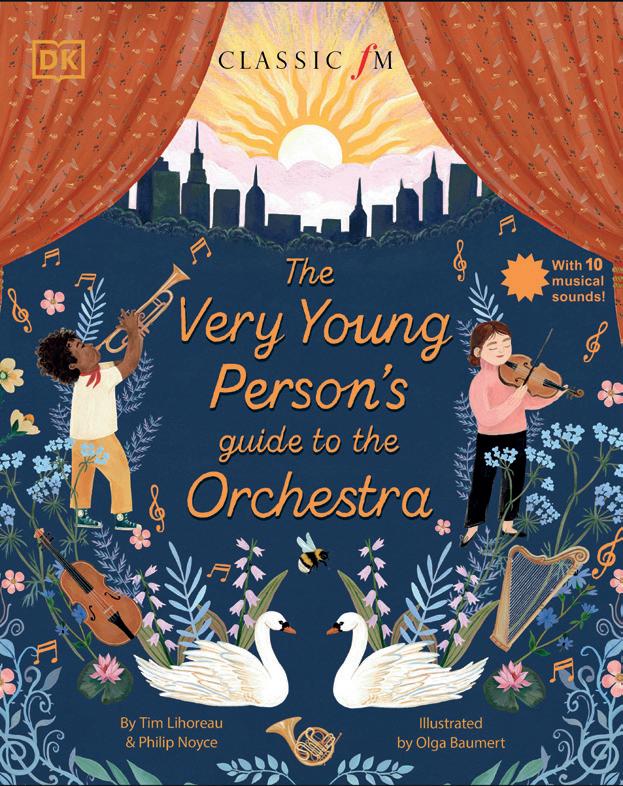
And Everything Will Be Glad to See YouTim Lihoreau & Philip Noyce illustrated by Olga Baumert DK PENGUIN RANDOM HOUSE, £20
The second in the Butterfly Club series, The Mummy's Curse takes us on another journey with intrepid time travellers who steal artefacts in order to influence progress in a positive way. This time around, young adventurers Luna, Konstantin and Aidan are tasked with going back to the Valley of the Kings to uncover the mummy of Tutankhamun before Howard Carter can get to it. First there's the problems of landing in 1922 and uncovering archaeological treasure, and then there's that deadly curse to contend with. A rip-roaring read for history and adventure lovers alike.

 by Jacob and Wilhelm Grimm
by Jacob and Wilhelm Grimm
Another title in the sumptuous series illustrated by MinaLima, this treasury of Grimms' fables is one to be devoured, then eventually handed down. All the familiar stories are here, with two versions of Snow White, plus Cinderella and Hansel and Gretel. But less celebrated tales are in the mix, such as The Twelve Huntsmen and Mother Holle. Magical illustrations include 3D extras, including a pop-up tower for Rapunzel and a wall of thorns for Sleeping Beauty.
7+
 by Charlotte Guillain
by Charlotte Guillain
Supported by English National Ballet and Ballet Futures, this VIP backstage tour of a ballet company starts in the auditorium. Then young readers are taken through the costume department, a morning rehearsal and also set building, lighting, make-up and wig departments. They drop by the dancers' canteen and find out about the orchestra. There's lots of detail – from the number of shoes a dancer gets through a week to the atmosphere in the wings. Readers also find out about the plots of some of our most famous ballets.
 by Sarah Walden
JUICE, £9.99
by Sarah Walden
JUICE, £9.99
There's nothing like starting them young, and this clever picture book does just that. Beginning with how to pronounce fi-LOSS-uh-FEE, it then asks big questions (what is life/truth/ beauty?). Using simple text and engaging illustrations it provides age-appropriate answers. There's a useful section covering how our words and actions have meaning and impact on other people. You'll also find a glossary of more complex words used in the book. Noodle Juice has also published a companion called 'What is Money', with titles on art and music also coming soon.
illustrated by MinaLima HARPER DESIGN, £25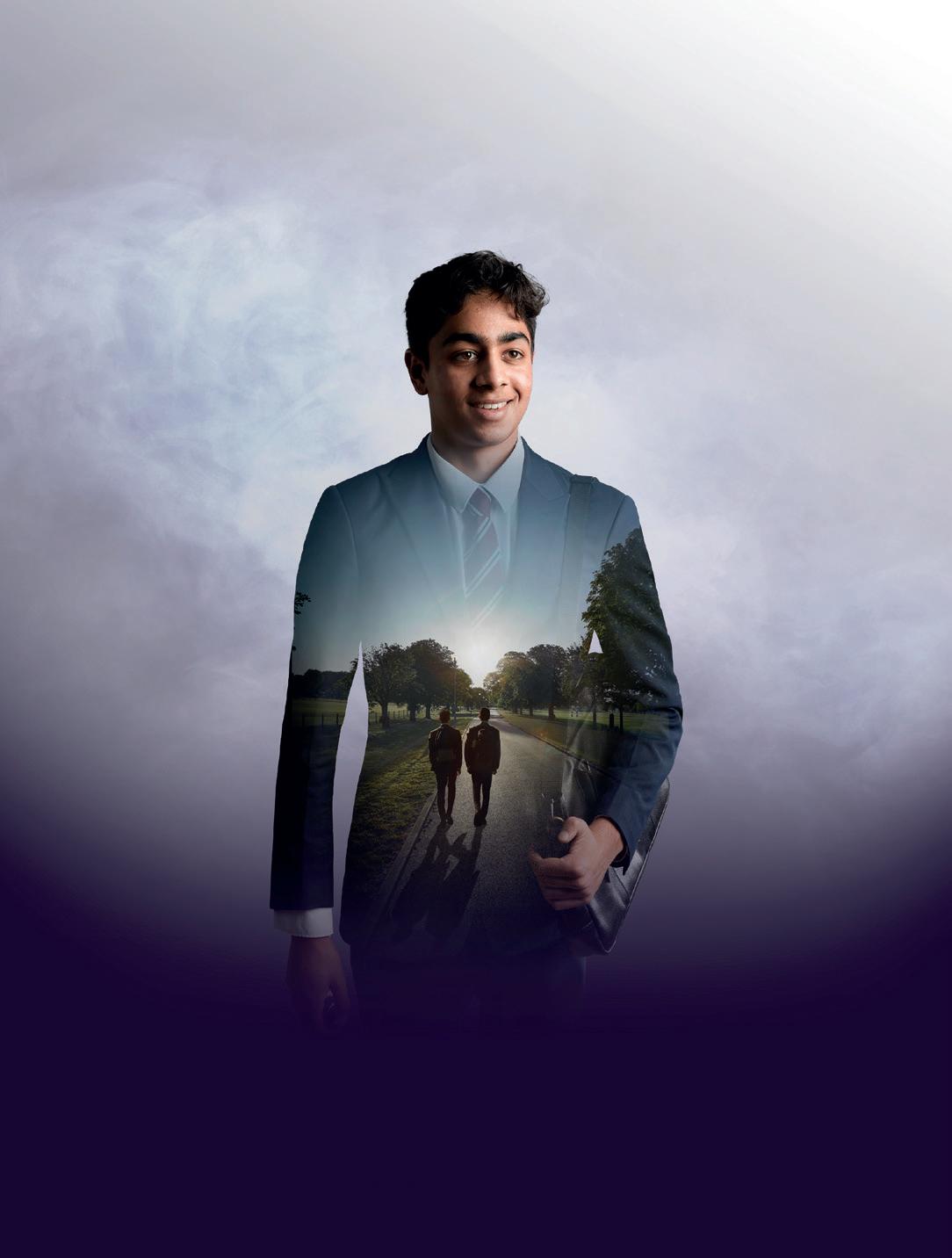
 by Karl James Mountford WALKER BOOKS, £12.99
by Karl James Mountford WALKER BOOKS, £12.99
Karl James Mountford has created this thoughtful book for very young readers to explore grief, loss and the spirit of hope in nature and memory. Disturbed by the unusual sounds made by the birds – not their usual chorus, not happy and not sad, Fox follows them. It's a long journey, but eventually he comes across a broken bird, lying still in a clearing. He can't wake the bird up however hard he tries and then a moth explains what has happened. Spare and gentle text and rich illustrations make this a lovely readaloud choice with a comforting message.
Perfect for budding designers and engineers, this guide is written by an architect. Roeder has selected modern buildings of distinction that are not all on the tourist trail. From Le Corbusier's Unité d'Habitation 'beehive' flats in Marseille and the recently repurposed Battersea Power Station to Micro Yuan 'er, a diminutive children's library in Beijing and David Adjaye's 'Dirty House' in Shoreditch. A timely inclusion is Shigeru Ban's Shelter of Cardboard, easy-toassemble houses to create a more humane shelter for refugees. There is a timeline and biographical notes at the back.

 by Liz Flanagan
illustrated by Joe Todd-Stanton UCLAN PUBLISHING, £7.99
by Liz Flanagan
illustrated by Joe Todd-Stanton UCLAN PUBLISHING, £7.99
The author of the Dragon Daughter books has created the first of a new fantasy series. Rowan and her mother flee their city because of the threat of war. Forced into the Dark Forest, and meeting her Grandpa and his wolf Arto for the first time, Rowan also rescues a baby dragon – and then a whole clutch of them. Over the summer she discovers that she is a Wildsmith, which means she can talk to animals and also heal them. When danger threatens for the second time, it is her new friends she calls on for help.
Editor's BOOKS / REVIEWS pick 7+Dr Elys Dolan is not only an award-winning illustrator, she also teaches an MA in Children's Book Illustration at Cambridge School of Art – so who better to inspire young author-illustrators? She approaches the 'how to' format with humour and the help of her chosen sidekick Bert, a worm of many questions. From choosing ideas and developing your characters to the 'storymaths' of plot and the fine art of colour, it covers a lot of ground in an inspiring way. The step-bystep format also zooms in on place, story arc and resolution – even how to make your own book to put your story in.
 7+
7+

Part of the Harper360 programme, this debut graphic novel by Rebecca Burgess centres on Mia, trying to make her way through a world that doesn't understand her autistic self. While she wishes she could speak up, singing and songwriting is where she finds her true voice as Elle-Q! Assisted by her best friend Charlie, she has become a viral sensation, but no one knows Elle-Q!'s real identity, so should Mia blow her cover and enter the local talent show? Rebecca Burgess is herself autistic and her brilliantly drawn story with a heroine you can get behind also explodes a few stereotypes.

 by Berlie Doherty
by Berlie Doherty
illustrated by Tamsin
RosewellUCLAN PUBLISHING, £7.99
When Carl heads to the Derbyshire Peak District with his parents to recover from the fallout of a dreadful accident and the loss of his best friend Jack, he becomes caught up in a mystery centred on the tale of the Lost Lad. Carl can't decide if the hills around them are haunted, or if these happenings are figments of his imagination and he's being chased by his own demons. Carnegie-Medal winner Berlie Doherty has included a Derbyshire myth rooted in real events within a deeply moving story about the process of coming to terms with grief.
BIG PICTURE PRESS, £25
This large-format book is a feast for eyes and stomach, as readers work their way around the globe on a 26-country culinary tour. Fabulously detailed maps, timelines, text and illustrations answer burning questions, such as where corn and wheat came from, how to make Vietnamese pancakes, what happens at a Moroccan feast and the fine art of fermenting fish. There are lots of recipes – everything from injera flatbread to pierogi, salsa and chocotorta – and the author-illustrators have delivered a bellyful of fascinating facts to inspire young gourmets and food scientists alike.

The third story in Alex Milway's Big Sky Mountain series sees Rosa and her Grandma Nan head off to ToeDipper Bay to find out who has sent up a distress flare. They arrive to find the beach covered in plastic rubbish and a family of beach otters doing their best to clean up. Someone needs to head out to sea and investigate, but it's going to take the animals' assistance. With industrious otters, savvy hermit crabs and hungry puffins, this is an adventure for younger readers with a great cast and a satisfying resolution.

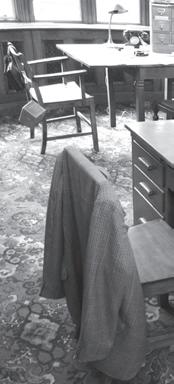
History can be stranger than the wildest imagined kingdom. And for children who don’t do dragon slayers or aliens, historical novels offer a direct path into believable fictional worlds. These ‘lookableuppable’ places and events add depth and interesting tangents that encourage further reading.
For Rhian Tracey, author of I, Spy, Bletchley Park was the starting point. Tracey had the most compelling of all reasons to set her new novel there: her Great Aunt Audrey. She was one of the women of Bletchley Park – clever, stoical and extremely brave. Indeed, her story is so amazing it deserves a summary.
Audrey was making her own way in the world after she was orphaned. When WWII started, she joined the Wrens – and there she was spotted and put on a train to London (her first time out of Wales). “As far as we can tell she was driven into Bletchley in a blacked-out bus and then made to sign the Official Secrets Act, in a quite threatening way,” says Tracey. Audrey was just 17 when she arrived and she worked as a code stripper (she was taught both Japanese and Italian). Yet she never told her
husband or children a thing. Years later, and mostly after the official medal came, she let a few snapshots slip, although she ‘kept mum’ on a whole lot more. “And we tried!” says Tracey. “Many women like her will have taken those secrets, in the magic phrase, ‘to the grave’.”
For young readers, some of that thrillingly secretive world is uncovered through I, Spy Of course, it’s a fictional account, but in a place children learn about at school and can visit.

The novel’s protagonist, 12-year-old Robyn, has grown up in Bletchley Park, and when war begins, she’s assigned a job looking after the carrier pigeons (signing the Official Secrets Act first). But then she becomes convinced of sinister goings on – an enemy in the heart of this most secret of wartime operations.
There’s much about the era that is so dark it can’t be told, but Rhian Tracey says when that’s carefully handled children love it. “If you think about the original fairytales, the Brothers Grimm, there is a lot of darkness in there and that is appealing to children, as long as it’s balanced with light. So I was hoping to strike that balance,” she says.
Tracey is a seasoned writer (this is her eighth novel) and a schoolteacher, and has also taught children’s literature courses for Open University, so she already knows
History offers us settings grounded in reality, perfect starting point for compelling fiction. The authors of two new adventures set in the past share their back stories
LIBBY NORMAN
what lures them in. One is that you have to give protagonists agency (in this case important jobs to do), and another is that big things have to happen (finding the enemy). “They are looking for excitement, peril, an element of danger and probably more than one character. The historical, particularly in the case of I, Spy, is a bonus.”
This does not, of course, mean skimping on historical research. “You end up not using so much, but at the same time it gives you the confidence to write knowingly and with authenticity, even if you’re not using 80% of the research.” Great Aunt Audrey has a namecheck – brave heroine Robyn’s middle name is Audrey – and Rhian Tracey has been assured by family that she would have given her blessing to this gripping fictional account, first inspired by her incredible wartime contribution.

Like Rhian Tracey, Barbara Henderson is a teacher (she still teaches primary-age

children part time), and she too is convinced of the power of the past to create great fiction for young readers. Rivet Boy is set during the construction of the Forth Bridge – that great Victorian feat of engineering.
Henderson moved to Edinburgh in her teens and now lives in the Highlands, but retains a deep affinity with both the city and the landmark bridge – it was always on her radar as a possible location. While doing some research she found a newspaper account from the time of its construction.
A 12-year-old boy called John Nicol had fallen from the bridge, dropping around 80 feet. He was fished out and examined by a doctor. “It said that he sustained nothing worse than ‘a wetting’. As soon as I read that newspaper article, I thought: ‘he’s my guy’!”
Barbara Henderson – like Rhian Tracey – does enormous amounts of research, although much of it doesn’t make it into print. “A sprinkling is enough,” she says.
“For children who don’t do dragon slayers or aliens, historical novels offer a direct path into believable fictional worlds”
ABOVE
Rhian Tracey
“You put in as much history as you need to build a believable world that your reader can visualise and then get on with the story and focus on the things that are universal – the universal concerns of a child – love, defending those we care about, seeing justice done, coming through tricky situations.”
John Nicol has been immortalised as hero of Rivet Boy, abut Barbara Henderson found out a lot more about his back story. A birth certificate, a parents’ marriage certificate and also the discovery that his father had moved to Australia – probably with a view to sending for his wife – but died within a week of arrival in an unlucky accident. There’s even a record of a widow’s fund being set up in Australia for the mother of the boy who would – 12 years later – have a remarkably lucky escape after another accident.
Henderson says one good ‘in’ for any historical novel is moral compass. “Children nowadays have got very well-developed sense of justice – what is fair and what isn’t. They really respond to the fact that Victorian children were so often put into very dangerous

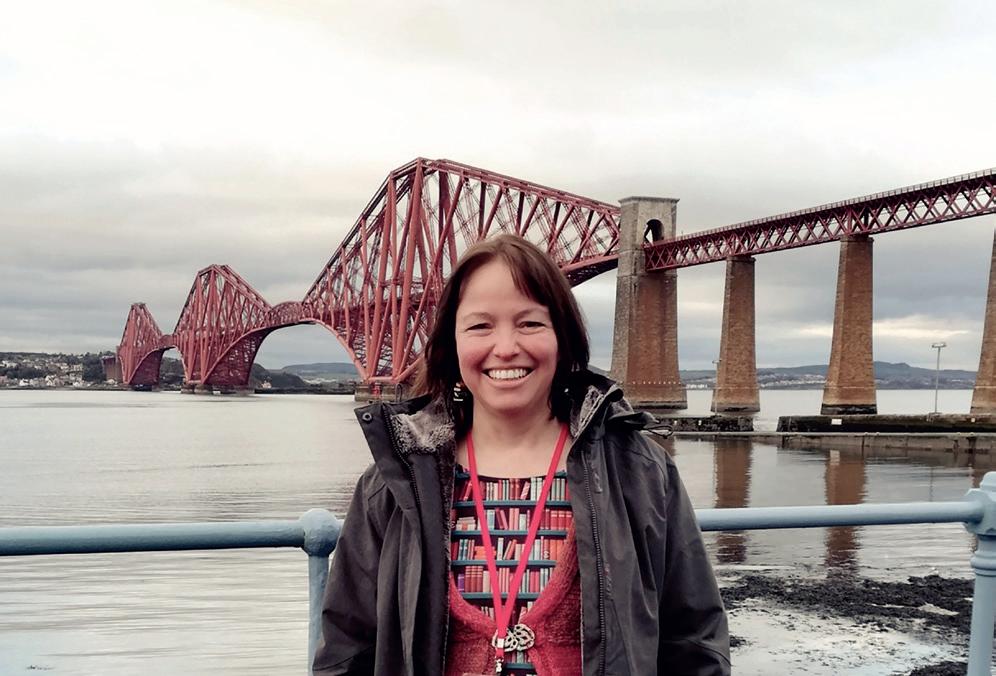
positions because they have a sense of outrage. And that, in itself, catapults them towards the story”. Another is to make the characters feel believable. Our hero who falls from the Forth Bridge has a a terrible fear of heights – a fabulous tension builder and also entirely likely. He has a female friend, Cora, who is desperate to be an engineer and doesn’t fit stereotypes of the time. “Someone who is a rebel in their own time is far easier to relate to in our time,” says Henderson.
Alongside John, there’s another real character in there – Margaret Moir – who later went on to co-found the Women’s Engineering Society. There’s even a red squirrel John Nicol has befriended. “It’s a shortcut to making your character likeable. If you make an animal dependent on this main character and he’s kind to the animal then that’s an instant cue to your reader,” says Henderson.
For both Barbara Henderson and Rhian Tracey, setting a novel in the past does not mean setting it in aspic. Henderson says you have to keep the central characters relatable. “You really want modern young readers to identify with whatever historical character you’ve created.” The rewards, when this works, are wonderfully rich landscapes and the promise that a work of fiction grounded in time and place inspires children to keep on learning more about our past.
“Children are looking for excitement, peril, an element of danger and probably more than one character”
who wish to complete three A levels in just one year. and residential modules. Support for university guidance for Oxbridge and
Medicine applications.
Biology, Chemistry, Economics, Maths, Further Maths, Physics


15 live lessons per week plus clinics, tutorials and university preparation
Two, week-long residential modules at Charterhouse, UK




To find out more go to www.charterhouseonline.co.uk or email admissions@charterhouseonline.co.uk

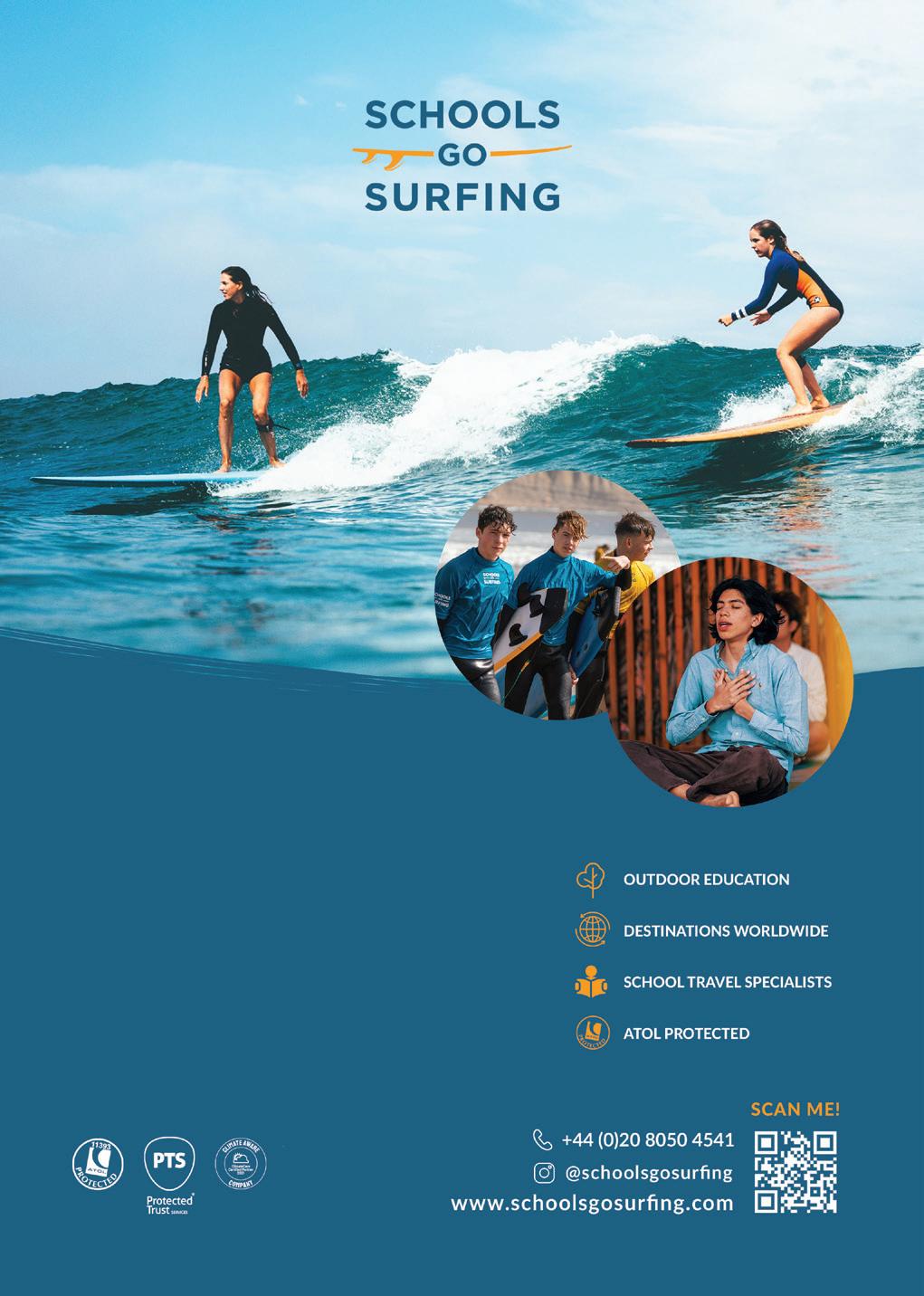


Where did you go to school?
I was born and raised in north London, so I went to Cuckoo Hall Primary School, Edmonton County and then Fortismere for sixth form.
What were your schools like?
Primary school was amazing. We had gospel singers come in, teach us gospel versions of Christmas songs and put on a gospel Christmas concert. We also learned Bollywood dancing and put on original musicals, it was honestly endless – so much was going on. That was all down to our teachers really making the experience feel so magical and full of creativity.
Edmonton County was a very social and eclectic atmosphere. There were a lot of people in my year who loved dance, sports and music, so there was always so much vibrancy. Friends in my year group came from all over the world, so growing up I was very lucky getting to experience different cultures through food, music, language and traditions. Fortismere was a lot more academically focused and because of that, sometimes I felt a bit like an outsider, but I had teachers who were incredibly passionate about their subjects, which made me love coming in to school.
Did you love school, or hate it?
Most of the time, I enjoyed school and learning. I guess you’re in education from the age of three or four until at least 18, so looking back it does make sense that there were periods when school felt rocky, but overall, I had a great time.
What were your favourite subjects at school?
Definitely English Literature, and in sixth form I grew to love Sociology. Funnily enough, I never did GCSE or A-level Drama, I kept it very separate to school and that made me always look forward to it at the weekends.
Who were your most memorable teachers?
My English teacher in secondary school, Miss Haralambous, was so intuitive with young people and always made the lessons something to look forward to. To be honest, everyone I knew at school loved Miss Haralambous. I also went to Sylvia Young Theatre school part-time and had a drama teacher called Bryn Williams who taught me from 13 onwards. He was all about realism and always incorporated these crazy stories into the classes. His approach to acting was what made me want to take it seriously, and he played a huge part in introducing me to the acting world.
Where was your favourite place at school and what did you do there?
It was probably the football pitch through to about year 8. I was very sporty and loved kicking a ball around. After that, in the morning before classes I loved meeting with friends at ‘the benches’ just catching up and joking around right before the day would start. Even though I was seeing my friends five days a week for five years it never got old, and I always looked forward to seeing them all first thing in the morning.
“FOR THE SCHOOL DISCO WE GOT TO BRING IN OUR OWN OUTFIT AND I DROPPED MINE IN A PUDDLE SO HAD TO WEAR MY UNIFORM – I FELT SO EMBARRASSED”
What beliefs did your time at school give you?
Always staying true to who you are and never letting social pressure make you feel embarrassed or stop you from having your own interests and passions. Also, not listening to teachers who doubt your potential!
What was your proudest school moment?
A friend of mine from primary school had a diabetic attack on the first day of summer school (a pre-week before Year 7). I knew straight away that he needed sugar and told the teachers what to do. Looking back, I’m quite proud of 11-year-old Eloise on the first day of summer school switching into emergency mode and supporting her friend.
What was the most trouble you ever got into at school?
I was a bit of a goody-two-shoes. I don’t think I was ever disruptive in class, but I was a bit sassy at times, so I probably did get a bit of a telling off about that.
Were you ever ‘too cool for school’?
Definitely not. I was a bit of a weirdo, but looking back I’m happy I was because I didn’t let the pressure to be ‘cool’ sway what I was interested in. As a result, I was surrounded by people who had their own unique passions and quirks too – and who are now doing amazing things. My best friend used to be a massive film buff at school, which people deemed as ‘nerdy’. Now she colour grades for films and commercials as a career, which is incredible.
What is your most vivid memory, looking back?
Probably the school disco in primary school. I remember we got to bring in our own outfit to wear for it and I accidentally dropped mine in a puddle so had to wear my school uniform. I felt so embarrassed but then, being an 8-year-old, I quickly dismissed it and I remember going crazy over the Capri-Suns, the rainbow parachute and the 2007 pop hits.
When and how did your interest in acting begin?
I was put into a Saturday stage school at around four and I absolutely loved it. I think doing all these drama games as well as dancing and singing about at such a young age is why I’m a bit of a silly person now. It gave me so much confidence as a kid, but I must admit I was also a bit of a drama queen because of it. I then ended up doing a few part-time musical theatre classes and eventually joined Sylvia Young. I was initially super intimidated by the acting classes there because it was a lot more advanced and everybody was so talented, but eventually getting used to that vulnerability and leaning into the work made me begin to really love acting and envision a career in it.
What other key passions shaped you growing up?
Definitely cinema, I would watch films over and over again as a kid and pretend to be my favourite character. I still adore film and go to the cinema all the time. I was also very passionate about sports, I was a 100m sprinter, a figure-skater, a horserider, a dancer. I feel so lucky that I had the opportunity to be put into all of these things. It certainly gave me a competitive edge.
What have been your recent projects?
I recently finished a role on an HBO show called True Detective: Night Country, where I flew out to Iceland to film. It was an insane experience going to a unique country like this, let alone to do an American project. I am also playing the role of Izzy in season four of The Bay, which I finished filming last summer. I had had the best time and learnt so much from the cast and crew.

How would you sum up your school days in three words?
Vibrant. Energetic. Curious.


The Maldives is the most recognisable (and Instagramable) island nation. A sea-and-sky setting of perfect sand and swaying palm trees. As first timers, we are prepared for that, just not for the wistful responses when we say that's where we're heading. A friend sighs and says: "it's my place". Another, a rugby lover not known for poetic outpourings, talks about his four dream holidays there and looks longingly into the middle distance.
If that intrigues us, then the prospect of a week on its most celebrated recent opening – InterContinental Maldives Maamunagau – becomes even more intriguing. Here we have a small-scale resort on Raa Atoll,
lovingly conceived and designed as a nextlevel Maldives experience. The team who crafted it were dropped off – Robinson Crusoe style – to develop it sustainably, and that took two years. We have the feeling we are going next level when we are asked to fill in a pillow preference form. The adventure gets off to a fine start with the journey. Air travel has largely been stripped of romance, but seaplanes are different. Having worked out we have a 45-minute seaplane ride to Maamunagau, I am beyond excited. Seaplanes have been on my bucket list since I was seven and read about these magnificent flying boats in The Famous Five And it is magical when we are ushered away from the crowds of Velana Airport by our Manta Air rep to a cool and elegant
terminal containing the largest fleet of seaplanes in the world. The ride to our island destination gives an extraordinary bird's eye perspective as you see some of the 26 atolls (made up of over 1,100 coral islands) unfolding below like a yellow ribbon. Landing in the Indian Ocean, we watch with admiration as the barefoot seaplane stewardess leaps from the plane and, with steady seafarer's hands, moors us on the pontoon. Whisked by speedboat to shore, we arrive to the most gracious of Maldivian welcomes, and within minutes we are in our overwater villa. This is where the next-level luxury
of Maamunagau reveals itself. We are in a totally private detached pad, a dreamtime space between earth and ocean. There's a giant bed with a multitude of fluffy pillows (pillow request had been actioned) and this overlooks a view that stretches to infinity. Private plunge pool, ocean all around and steps down to the beautiful briny – even a deliciously deep bathtub overlooking the deck.
The pace of life slows to a blissful calm in Maamunagau almost instantly. Usually on a holiday, it takes a day or so to unwind, but not here. Our villa is on the long boardwalk that runs like a ribbon down the island.

Our wonderful concierge tells us that shoes are optional – and to call him anytime we need anything at all. Every day we try to think of something, anything, we need, but most days we fail. It's all here. Many guests use the handsome black bikes that are parked outside every villa. Being pragmatic, I decide that if anyone is going to wobble slowly and emphatically into the ocean it will be me. The views are just too distracting.
Travel on foot is a pleasure but takes longer than it should because fish spotting becomes our thing. One day we stop to watch a tiny baby shark foraging on the rich marine life. We delight at the bored (and extremely well fed) heron in residence on the water at The Retreat, the super-calm lagoon where swimming, sunbathing and live lounge music make for a chilled and adults-only alternative to the beach (there is a fabulous kids' club here to give parents down time).
We love the lagoon swimming, but the beach is our usual spot – white sand, gentle waves and a delightful swim-up bar where we discuss cricket in some depth with an extremely well-informed barman from India. The team of staff are very international, just like the guests, and all delightful.
The bar sits close to the all-day and evening dining spot Café Umi, where breakfast starts the day right. All great hotels know you have to give everyone their
 ABOVE
A perfect lagoon idyll at The Retreat LEFT
ABOVE
A perfect lagoon idyll at The Retreat LEFT
RIGHT
perfect breakfast. Here, the incredible team of chefs have done that – with everything from sushi to eggs benedict to dosa to fabulous breads and pastries to exotic fruits. It becomes even more difficult to choose what to have at lunch – fish, grills and salads are all divine, but we've invariably eaten rather too well at breakfast.
The food is exceptional wherever you choose to dine. We eat at The Fish Market a couple of times and love the Maldivian and East Asian flavours. Located right on the water at the end of a dock, it's a romantic spot for dinner – especially with the Sunset Bar upstairs for sundowners and nightcaps. The Lighthouse offers truly standout Spanish and Mediterranean-inspired food. We are seated at the base of the tower and are mesmerised by the intricate tiled ceiling reproducing an ancient seafarers' map.
BELOW
A manta ray reserve is close by

There is a lot of swimming – at the beach or the lagoon, and with a morning and evening dip off our deck. My companion's new GoPro is tested underwater when we snorkel off our deck and house reefs. Every day he tries, but fails, to capture the lightning-fast schools of fish that churn the water and leap past our villa twice a day, on the clock. The fish are so prolific here you barely need a snorkel. With so much sea life around – including a protected manta ray reserve – there's a strong ecological focus. That means no plastic, anywhere – water is freely available but in reusable glass bottles – and we like that. One evening we join a dolphin spotting boat ride led by the British marine biologist in residence Emily, and it turns out to be a highlight. We have been on enough of these trips on past holidays not to expect too much. This one feels a bit different when the team tell us we're going out quite far to a channel that's favoured hunting ground for spinner dolphins. It's

a beautiful sunset ride, and then suddenly we spot them. There are scores of them all around us, spinning and leaping, babies and adults together. They are so synchronised, so balletic, that it feels – bizarrely –like we've landed in some maritime homage to a Busby Berkeley musical.
On one of our last nights, I mention to a member of the team what people had told me about the Maldives, and that was before we'd experienced Maamunagau for ourselves. She tells me how all the staff love watching this kick in – shoes are shrugged off, shorts thrown on and people forget the stresses of busy lives and lean in to the elemental sea and sky environment. As the seaplane carries us back along the ribbonlike atoll, I realise that Maamunagau – after one utterly dreamlike week – has achieved a miracle. It already feels like 'our place'.
For more information about InterContinental Maldives Maamunagau, visit maldives.intercontinental.com

 ABOVE Villa living on the ocean – with views to infinity
The Fish Market is a favourite restaurant
ABOVE Villa living on the ocean – with views to infinity
The Fish Market is a favourite restaurant
“The dolphins are so synchronised that it feels like we've landed in a maritime homage to a Busby Berkeley musical”

Surfing is officially among the fastest growing sports in the UK, but if you’re a parent you probably know that already. It has seen an explosion recently despite the unpredictable British weather and, if you add in body boarding and other permutations, figures suggest a doubling in participation over the past five years.
Children love it, it doesn’t require too much expensive kit, they can continue into adult life, and they are generally good at it. Parents, on the other hand, may struggle to keep up. It’s physically exhausting and it can be a trial if you’re not a natural water baby – or a natural surfing teacher.
Enter Schools Go Surfing, offering a smart alternative with school trips that let every level of surfer from 13-18 develop


their skills. Little wonder many schools are already signing up for an activity-based trip that teaches a really cool sport, as well as confidence, endurance and have-a-go spirit. Surf training is taken as seriously as the fun on the water, so small group lessons (typically 5-8) enable every ability and aptitude to improve skills and confidence. The company was founded by William Carr, a Hartbury alumnus and surfing aficionado. The idea grew from surf trips he had organised for university students. After spending four years working within the school travel market, he developed Schools Go Surfing to deliver surfing and wellbeing holidays for school-led groups. Wellbeing elements are – the company believes –intrinsic to surfing, thanks to close contact with waves and ocean. But trips also include yoga sessions, and outdoor experiences in some of the most beautiful locations around.
Cornwall remains a first choice among schools, but some are setting their sights further afield and Schools Go Surfing also takes groups across Europe and to top surf spots in Morocco, Costa Rica, Sri Lanka and the Indonesian island of Bali. This offers eye-opening opportunities beyond the beach – from visiting UNESCO World Heritage sites and ancient souks to wildlife reserves. It also means trips can be organised year round.
Tailormade elements are often requested – for instance, language learning, city trips, ocean conservation and craft workshops. Of course, school trips need to have a holiday flavour, and there’s everything from volleyball and football tournaments on the beach to star gazing, talent shows and live music in the evenings. There’s also a strong focus on getting the comfort right, so accommodation ranges from specialist (and vetted) surf camps and villas to boutique hotels. Just as importantly, perpetually ravenous teens are kept surf primed-and-ready with food that balances fuelling up needs with good nutrition.
schoolsgosurfing.com
“Surf training is taken as seriously as fun on the water, so small group lessons enable every ability and aptitude to improve”
A Schools Go Surfing holiday is about catching the waves, and with cool extras ranging from yoga to ocean conservation
www.dldcollege.co.uk/open-evening-registration





— The Good Schools Guide




DLD College London is a distinctive and forward thinking day and boarding school, creating unique learning opportunities for students.


We combine the traditional with the unconventional and offer a pioneering Year 9 syllabus, GCSEs, BTECs and A Levels, embedding skills for a lifelong love of learning. Located on the South Bank, London is our classroom. Visit our Open Evening to find out more.

13+ and 16+ OPEN EVENING 11th MAY 2023, 5pm–7pm





We are free thinkers. We are courageous. We are kind.
An extraordinary Pre-Prep and Prep School in Oxford where children discover and develop their talents inside the classroom and beyond. To get a feel for the spirit of the Dragon, book onto one of our termly open days on our website, or through our Admissions team admissions@dragonschool.org / 01865 315 405.
www.dragonschool.org



We’ve all heard the stories about teenagers’ crazy DIY health hacks – everything from delaying periods by drinking salt water to whitening teeth with household chemicals. Bad health advice, and simply bad advice, is out there and it’s dangerous. And that’s where Luna came in. Founders Jas Schembri and Jo Goodall met during their MBA, and this is where the idea for an advice app had its genesis. While initial discussion
centred on twentysomethings’ preoccupations, they soon zoned in on the issues for teens. Periods seemed the obvious area of knowledge gaps, but then early research showed much more – sleep, stress, exercise, mental health – the whole baggage of issues that impact young lives. So Luna was envisaged as an app that is on hand, like a trusted big sister .
There is, quite justifiably, alarm about the media sources some teens rely on. “It’s becoming clear that they’re misdiagnosing themselves using inaccurate information,” says Jas Schembri, who has visited many schools in the course of research and is also a school governor. “We decided to launch Luna so that teenagers can head to a place where they (and their parents) can be sure that any advice they receive is medically approved and expert led.”
Launched last November, Luna has a panel of experts made up of GPs, psychiatrists and therapists. Teens can read around subjects and ask questions anonymously – ensuring Luna keeps up with trending health worries and niche concerns. All answers are checked and approved by its Clinical Content Advisors.


The app is also discreet and safe – a closed community, with no way for users to communicate with each other. While physical health and life information topics are popular, mental health is the most accessed area at present. Users are asking questions ranging from ‘I’m really anxious about school lately...I don’t know what to do?’ to ‘how do I tell my mum I think I may be autistic?’.
Schools have wellbeing at the top of their priority list post pandemic, but there is a broader issue here: teens can be reluctant to open up to people they know – perhaps it’s too painful, or simply too personal.


An early survey conducted by Luna found that 86% of girls and non-binary teens worry about whether they are normal (whatever ‘normal’ is). It also found that 68% of young women still have gaps in knowledge. This suggests information traditionally provided via school and home may not always be fully understood or retained.
Let’s face it, no one wants to admit their ignorance about something they think they should know by now – especially if it’s up there on the embarrassment scale. With Luna, young people can ask away in confidence, sure in the knowledge that no one is laughing, the answer is medically verified and the team have their best interests at heart. Perhaps we could all do with a trusted big sister app to help and reassure us from time to time.
weareluna.app
Luna is an app that acts like a virtual big sister, helping teens to get answers about their bodies, their wellbeing and their lives
“While physical health and life information issues are popular, mental health is the most popular topic”
We’ve got plenty of
for your child. 90 acres in fact.
Instilling a sense of adventure and natural discovery are at the heart of a nurturing and inspiring approach to your child’s education at Abberley Hall.

With acres of beautiful grounds, we offer the space and freedom to help them really grow.

Visit www.abberleyhall.co.uk and start your Abberley Adventure. Co-educational boarding and day school age 2-13


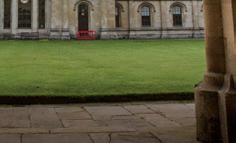
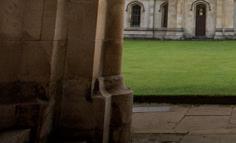

Boarding ages

hen it comes to designing a child or teen study space it can be a challenging task, with a lot to consider. You need to help them make the most of their space and, most importantly, concentrate! Lighting is a big factor and, by incorporating good light sources, you prevent visual fatigue, keep their focus high and illuminate their creative ideas.
First of all, you need to determine the location of your workspace. Look for a corner which is not too obstructed by other elements of the room – you want them away from distractions. Creating a cool and comfy area with stylish furniture will go a long way to entice them to study. Cult's trendy range of home o ce furniture and lighting is sure to inspire and encourage even the most work shy of students.
WAs schools, colleges and universities explore virtual learning, a suitable table, chair and task light, are essential bits of kit for their studies. From 'smart' teenage desk ideas to ladder desks that make use of vertical space, and an array of task lighting, you can give your teen the room they deserve and will enjoy both working and relaxing in. Keep them switched on and engaged with a good desk lamp. Styles with an adjustable head are a bonus. The Ebbe desk lamp range (from £39) is the perfect task lighting to keep their homework in the spotlight, plus it is available in a range of great colours. The contemporary Layla table lamp (from £69) is a trendy alternative featuring a frosted globe to create a soft glow that lights up any workspace.
If you don’t have room for a desk lamp, floor lamps are an elegant and space-saving alternative that shed plenty of directed light. Try the Temuka





(£229) for a cool retro look or the Lucca (£159), which features a solid marble base and clever adjustable head.

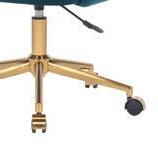

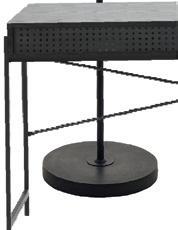


They say a tidy space equals a tidy mind. If possible, choose a desk with storage – Cult’s Angus Ash Desk (£229) is a great example. Here, the focus is on clean lines and sleek design, and it's savvy on the storage front too.
When it comes to seating, look for an ergonomic design with a height adjustable seat to ensure their posture and focus stay true. The Haines (£149) provides both support and comfort, and with di erent colour and fabric options.

Head down to Cult’s London showroom to start building your child or teen's dream study zone. Browse a ordable designs with next day delivery on in stock items.
811-813

Clever study zone ideas from Cult Furniture to ensure teens stay focused – and stylish
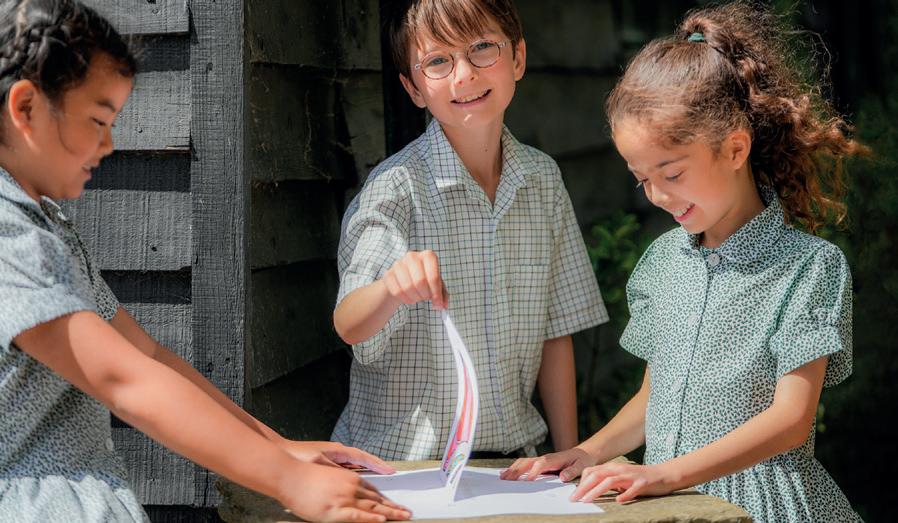





We are an ‘excellent’ rated independent, co-educational boarding and day school for pupils aged 11 to 18, nestling in 230 acres of outstanding Berkshire countryside. Every day is different; achieving your best results, making friendships for life, or even taking part in a cannon run across the Parade Ground.
Outstanding facilities, an all-round education and endless opportunities await you at The Duke of York’s Royal Military School. Our a ordable full-boarding school, open to 11-18-year-olds, significantly outperformed GCSE national attainment (2022). Students benefit from excellent teaching, a comprehensive curriculum, and a vast breadth of activities beyond the classroom. Begin your Dukie journey today; private tours available by appointment.

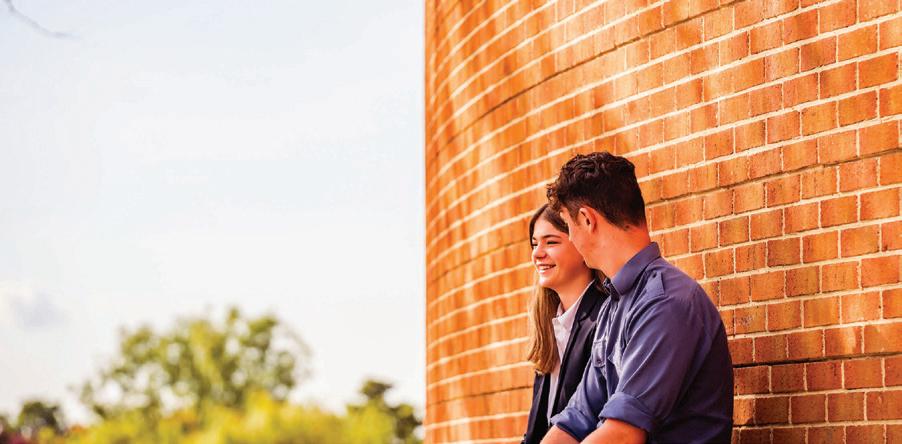
Looking
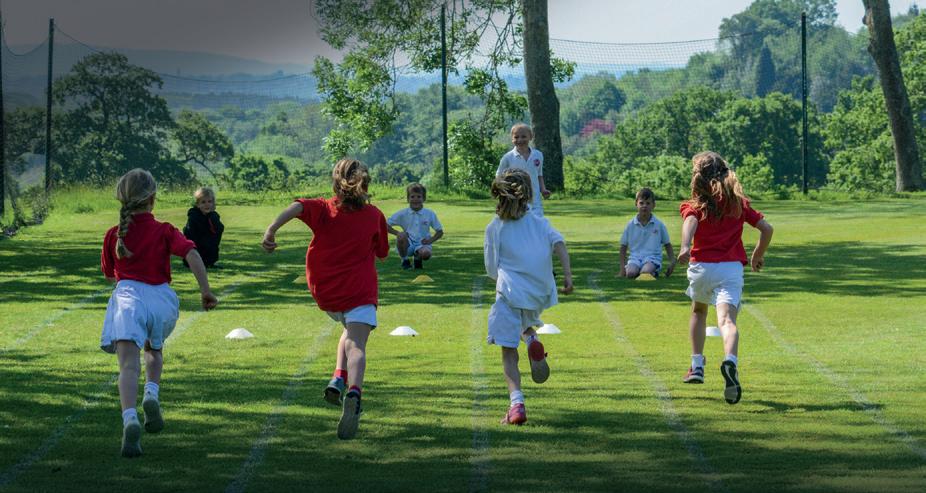

Visit website

Arrange a visit: admissions@tonbridge-school.org tonbridge-school.co.uk
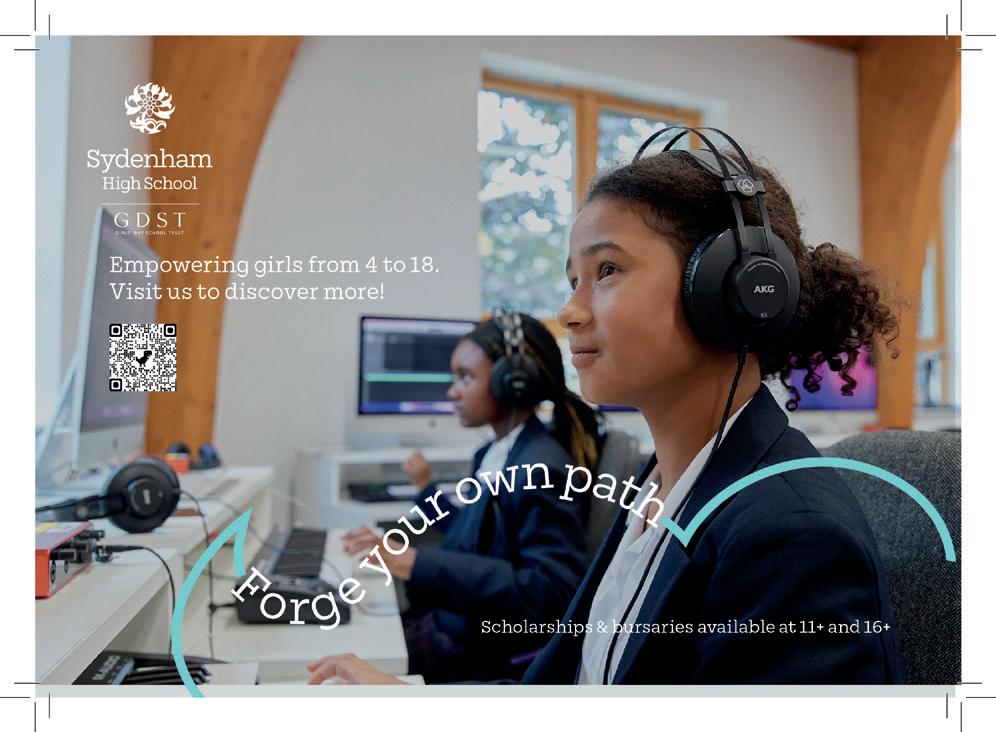
Tonbridge, founded in 1553, is one of the country’s ancient schools. And yet, despite its age, it is at the forefront of the new. We were the first school in the UK to embed Mindfulness into the curriculum, and our Life Skills course ranges from global perspectives and interview techniques to first aid and yoga. We believe this is innovation with purpose.
Ranked 8th best independent senior school in the country: Sunday Times Parent Power League Table
Outstanding academic progress and personal development, award-winning pastoral care, and an engaging and comprehensive co-curriculum.



‘powerhouse with a heart’ set in 45 acres of ancient forest, yet still within a wonderfully diverse part of North-East London. For pupils aged 4 -18.

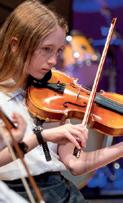
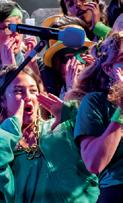

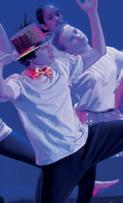



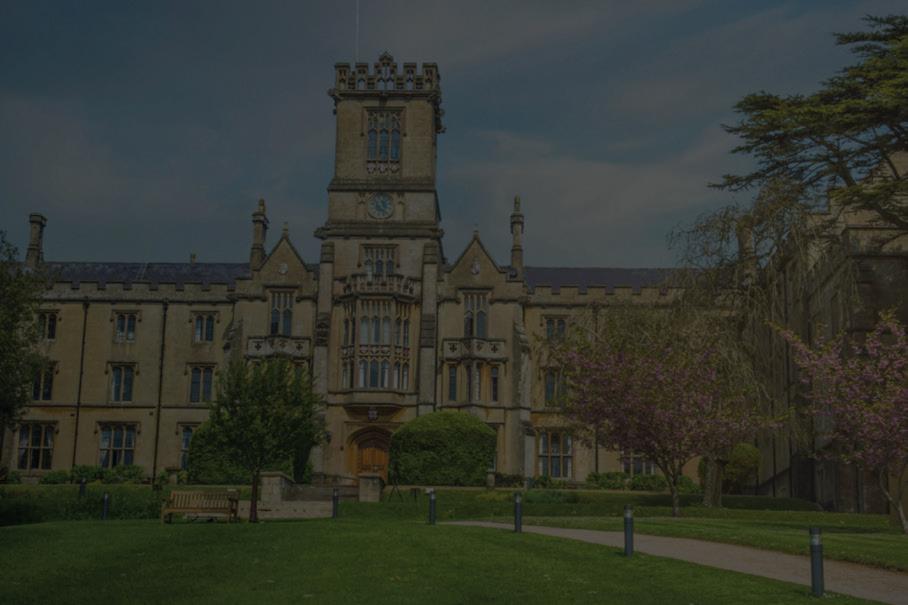









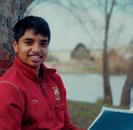

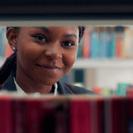
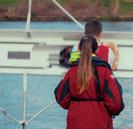





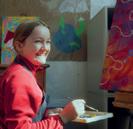

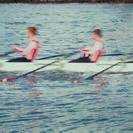
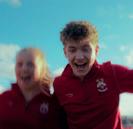


What is your background?
On leaving Edinburgh University after four happy years studying for an English and History MA, I moved to London and gained my PGCE from the Institute of Education, University of London. I worked at Garden House Boys and Broomwood Hall in the early days. I have been lucky to work across the 3-13 age range in co-ed and single sex independent schools. I worked as Head of the Junior School at Westminster Under and as Deputy Head at Wetherby Prep at Bryanston Square. I was then asked to be the Founding Head of WetherbyPembridge in New York and moved to Manhattan for six years. I moved back to take up headship at Godstowe in July 2022.
What excites you most about your role?
Godstowe is an exciting place to work. The girls are fresh and ever enthusiastic, and I love being immersed in the day and boarding aspects of school life. We have around 430 girls from 3-13 and we are a diverse community where the students just want to learn and engage. They are given so much opportunity to explore and grow. My team are incredible, and I count myself lucky to work alongside talented educators. Waving a group of Years 6-8 girls off to Canada for their annual ski trip was the icing on the cake for me recently!
What is your educational philosophy?
Education is precious and for life and schools should inspire and instil a deep love of learning. It is our young people’s time to learn integrity, meet the people and friends who will shape and change their outlook forever and embrace kindness and compassion for the road ahead. At Godstowe, we focus on character, leadership skills and self- awareness. Above all, we want them to be happy, to communicate well and collaborate, having a lot of fun in the process.
Can you tell us about one pivotal moment in your career?
Moving to New York in 2016 as Founding Head of Wetherby-Pembridge was the moment everything changed for me. I had
been lucky, as my previous experience in London had equipped me with a fundamental love for our curriculum and well-rounded offering. Nothing prepared me, though, for the sheer graft of the school set-up, in a new city and country. I gained a good dose of resilience and tenacity but certainly fell in love with what we created. The people I met made the experience a treasured one. The school and project attracted the very best people, children, and families, and that is what made it so special.
What is Godstowe’s approach and what sets it apart?
Academic success is balanced with character education, wellbeing, and enrichment. We take time to work with every individual girl in our care, and they leave us ready to embrace

life and reach the goals that resonate with their own path. There is a sense of adventure here. I like that...
What makes a great student?
For me, it is a sense of curiosity, fun and humility. Working together, we can achieve great things with respect, good manners, kindness, and honesty.
What makes a great school?
Great schools are about the people that work in them. It is hard to find the same sense of community, friendship and camaraderie in other environments. The greatest schools I’ve worked in value talent and potential, look for individual strengths and encourage development and personal growth – and that is as much for the adults as for the children in our care.
“It is our young people’s time to learn integrity, meet the people and friends who will shape and change their outlook forever and embrace kindness”
The new Headmistress at Godstowe Prep School on her background and educational approach
seconds with
60ABOVE Kate Bailey
AN INDEPENDENT BOARDING AND DAY SCHOOL FOR GIRLS AGED 11 TO 18, SET IN THE BEAUTIFUL SUSSEX COUNTRYSIDE JUST AN HOUR FROM LONDON

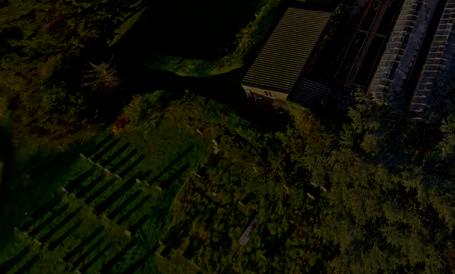
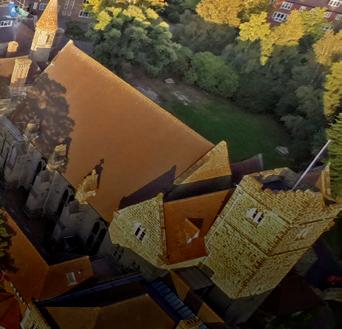
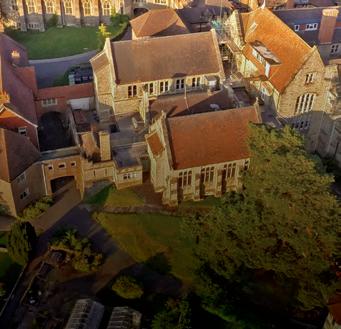
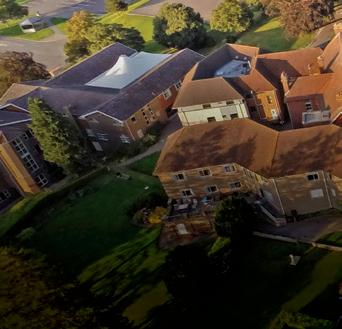
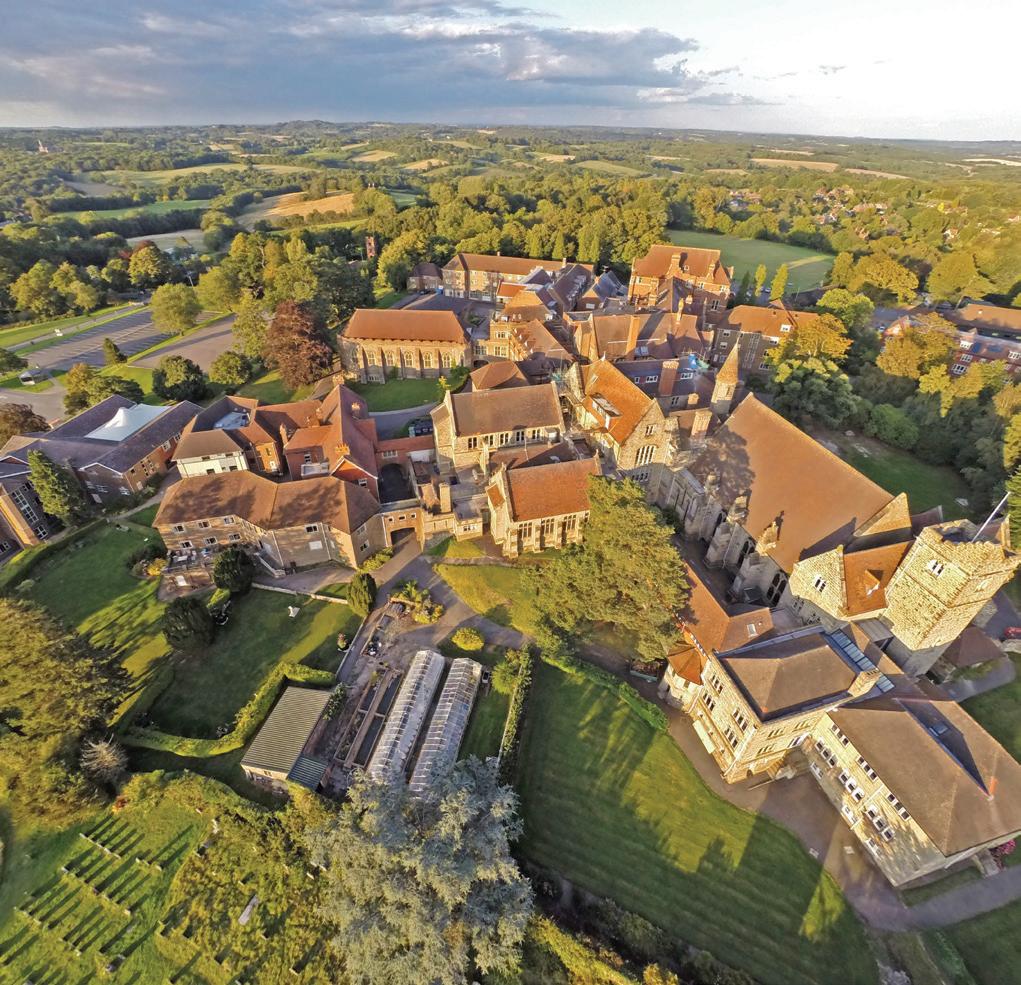
OUTSTANDING ACADEMIC RESULTS • SCHOLARSHIPS AVAILABLE EXTENSIVE CO-CURRICULAR PROGRAMME
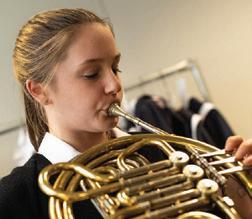

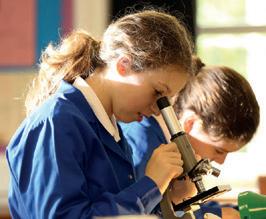
EXEMPLARY PASTORAL CARE & NURTURING ENVIRONMENT

STATE OF THE ART EQUESTRIAN CENTRE FLEXI, WEEKLY AND FULL BOARDING OPTIONS
